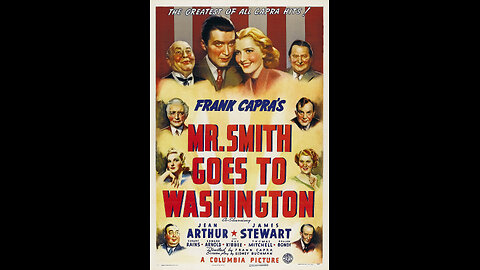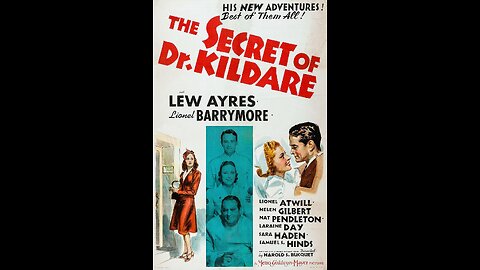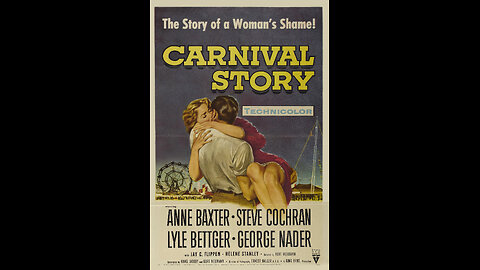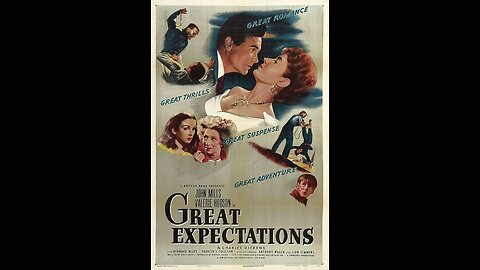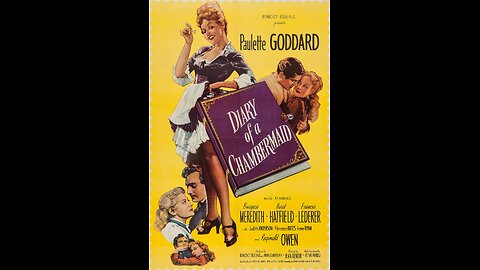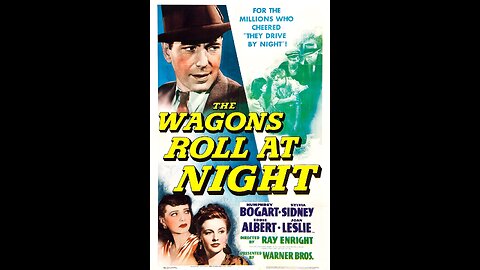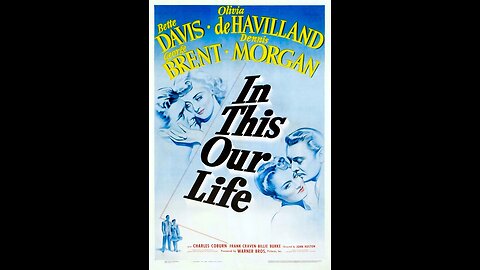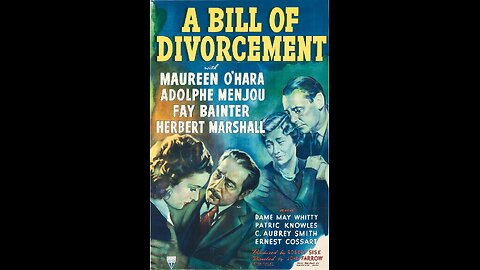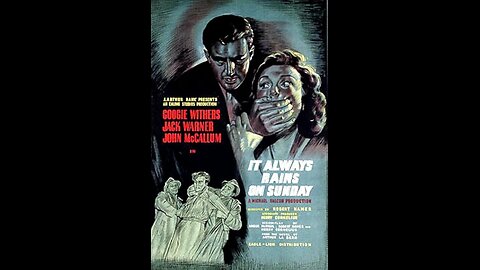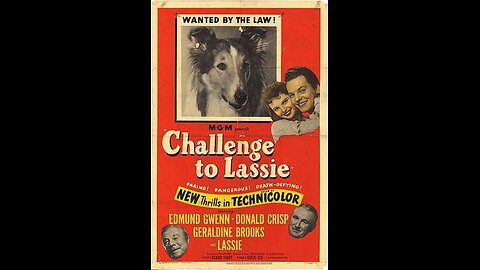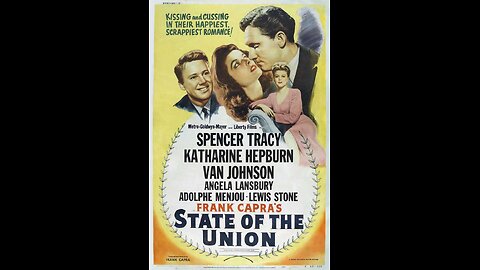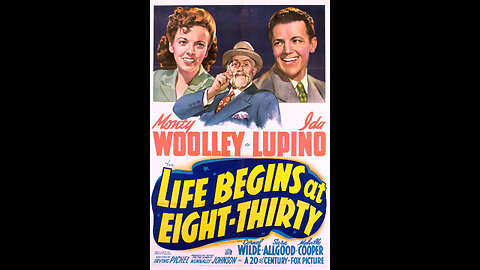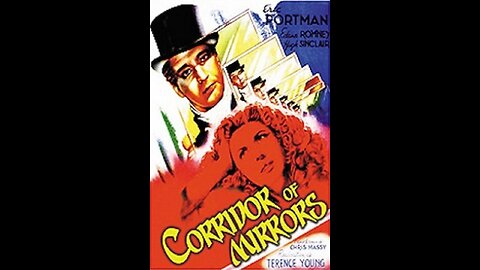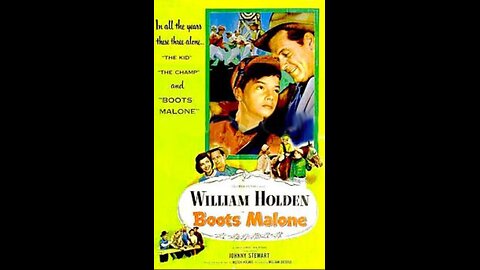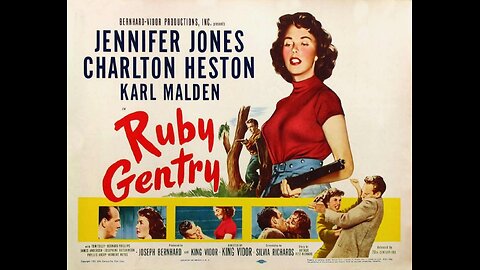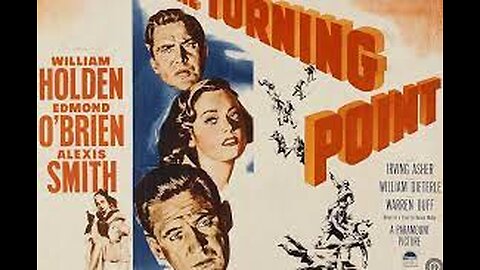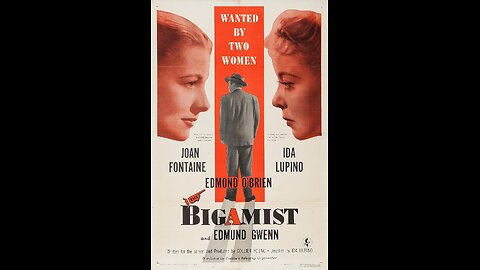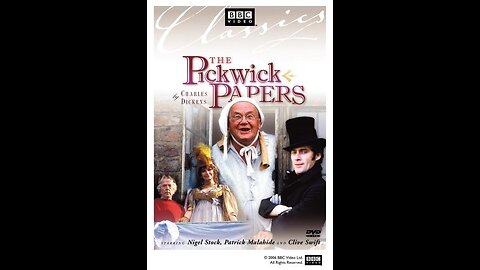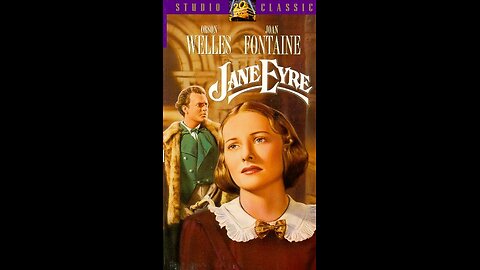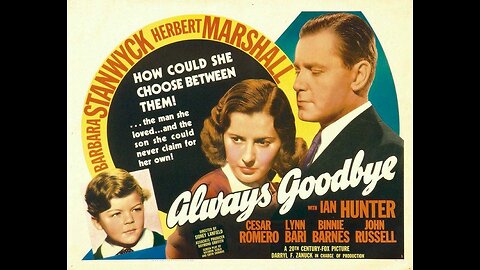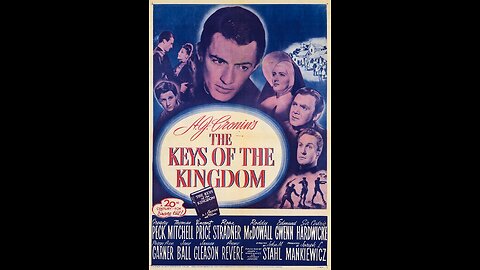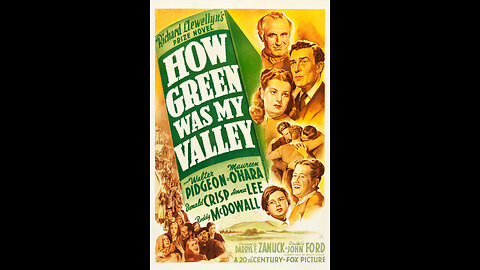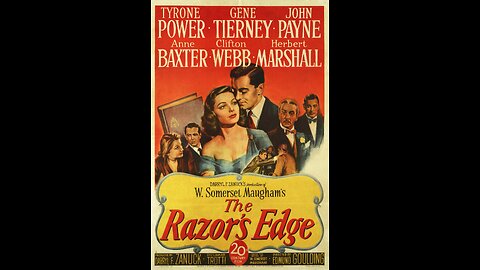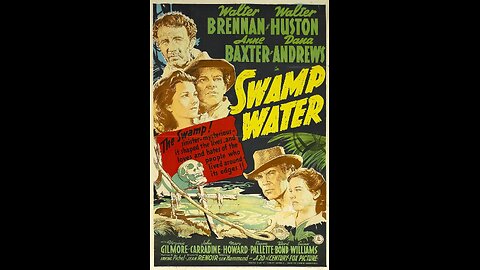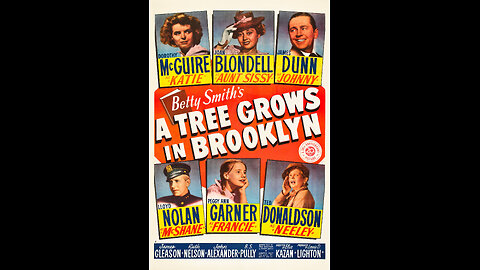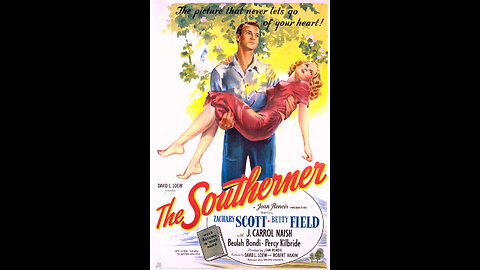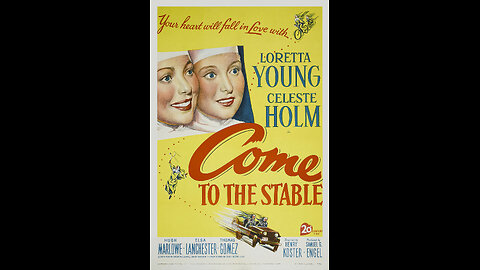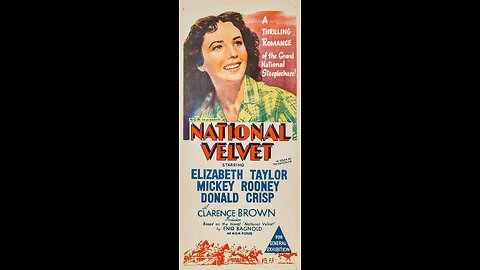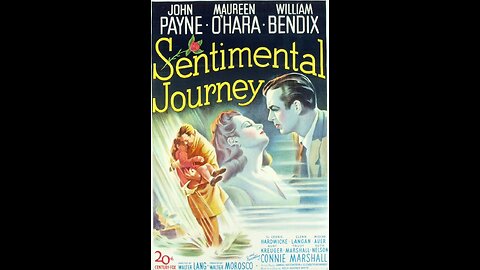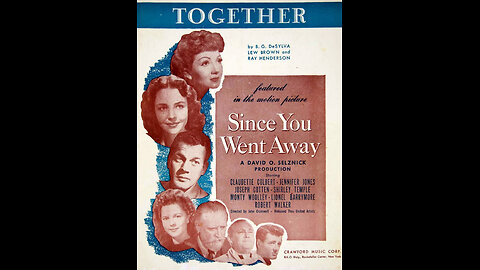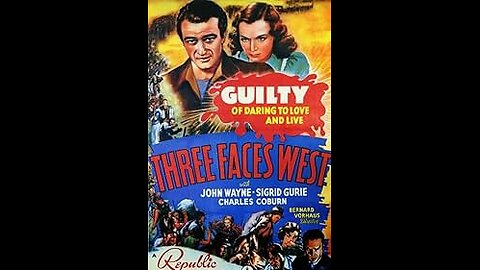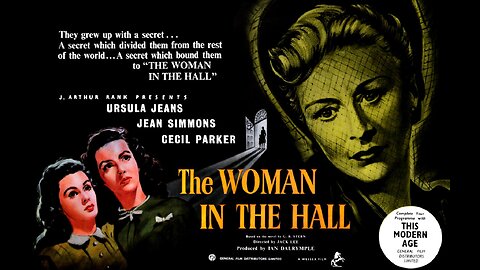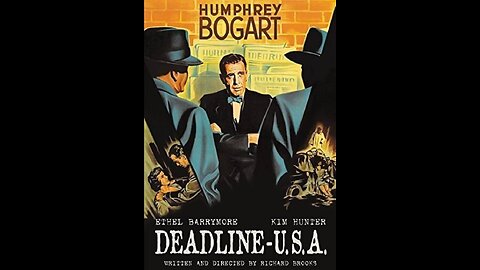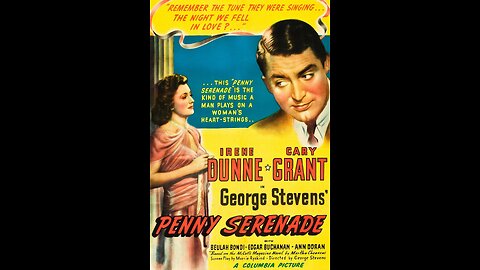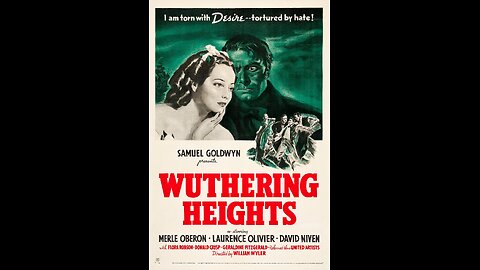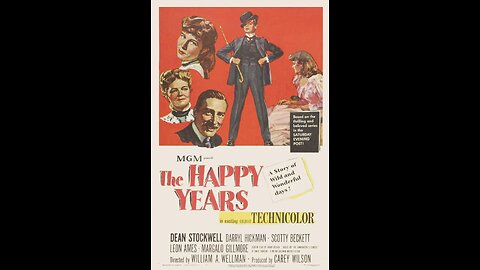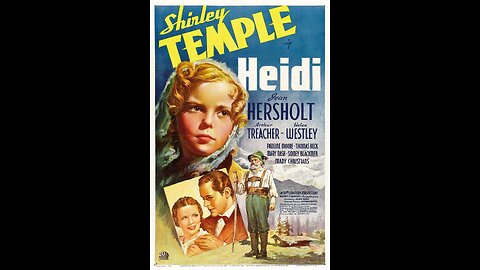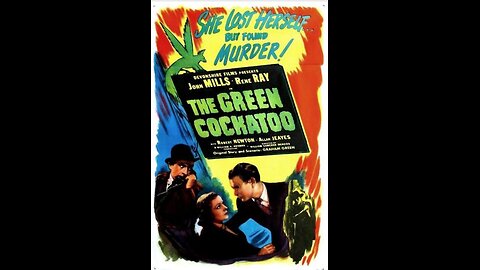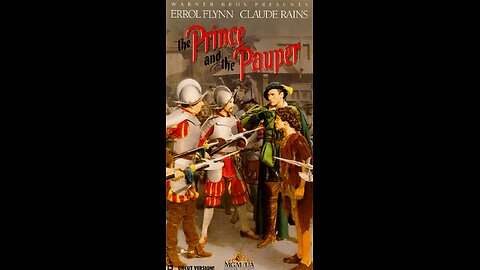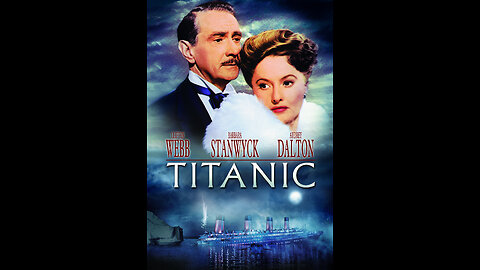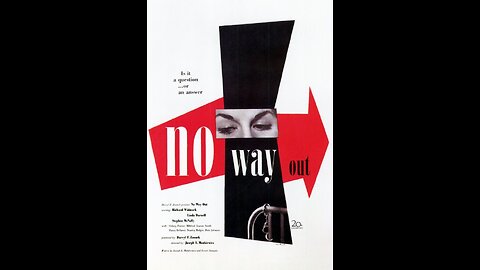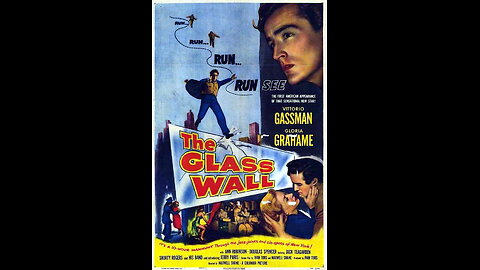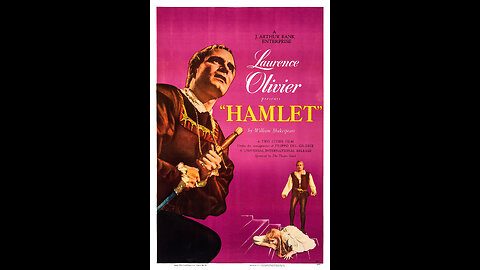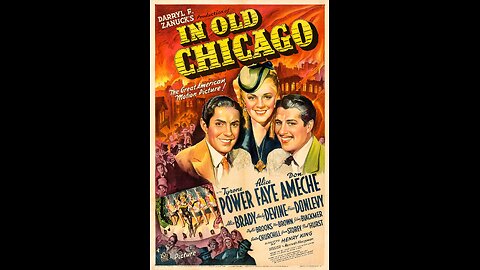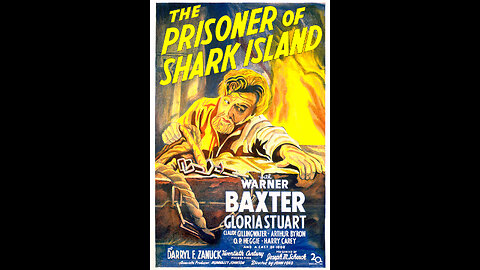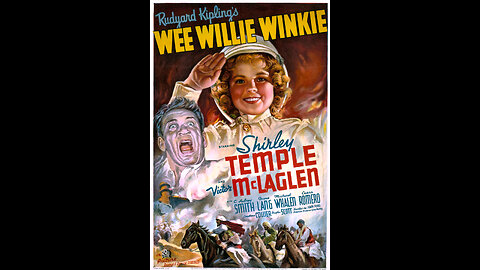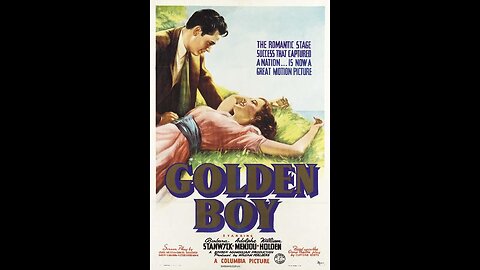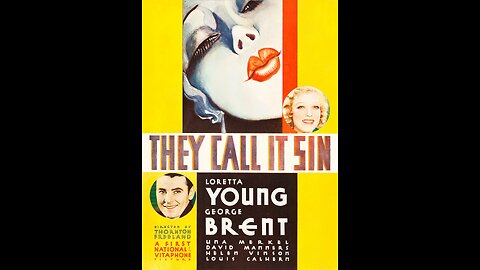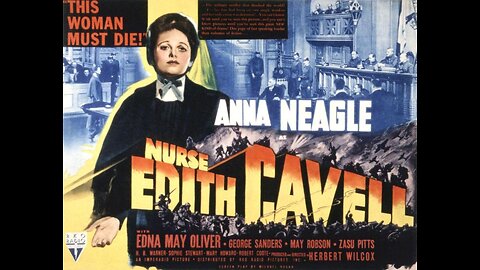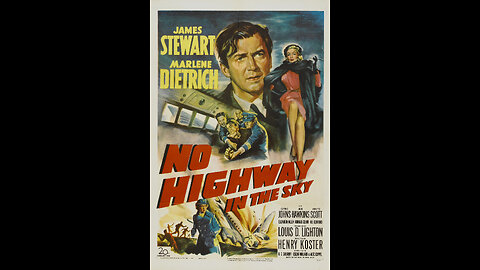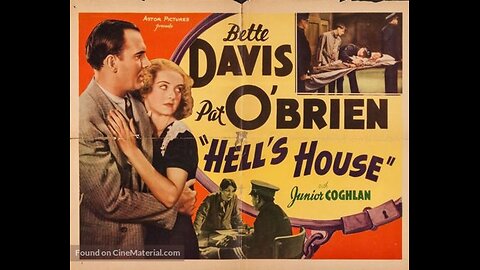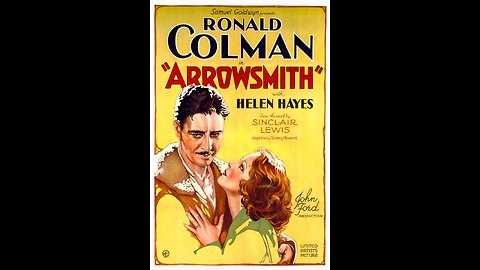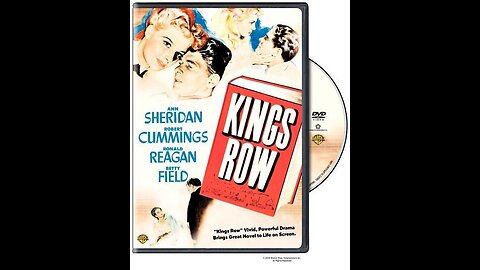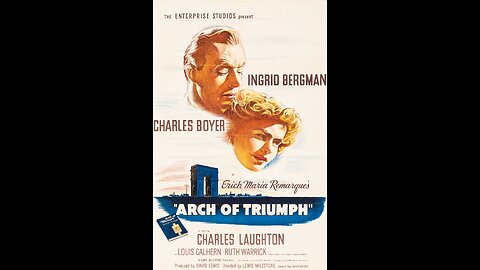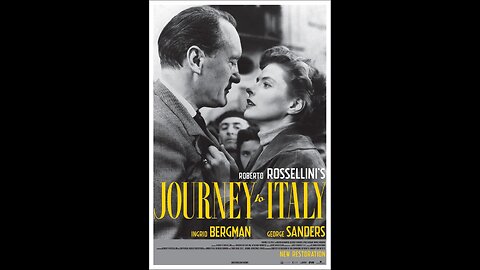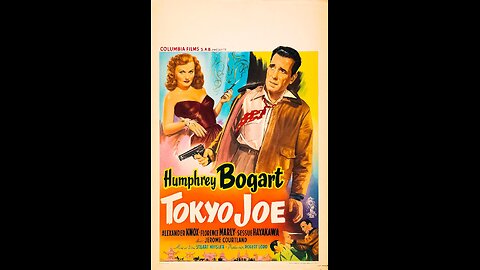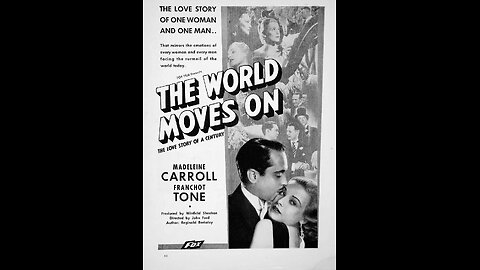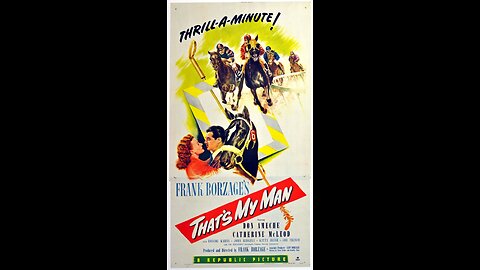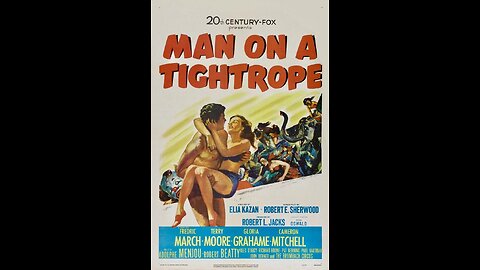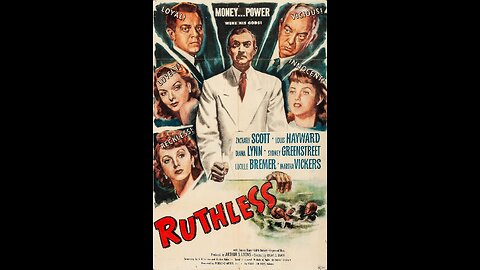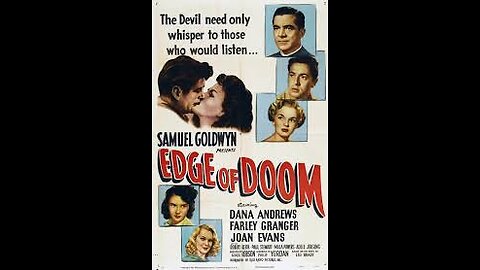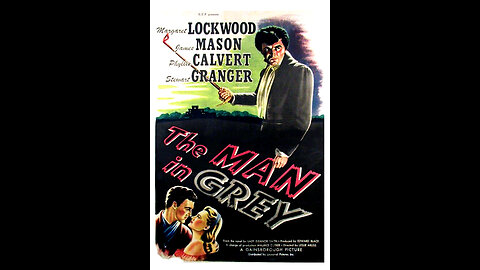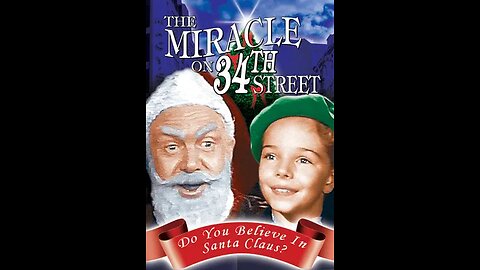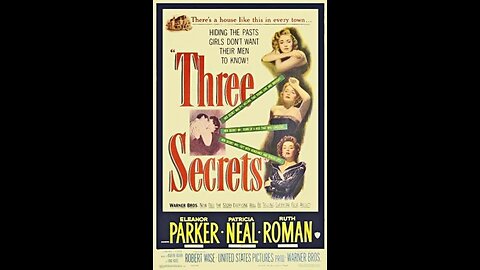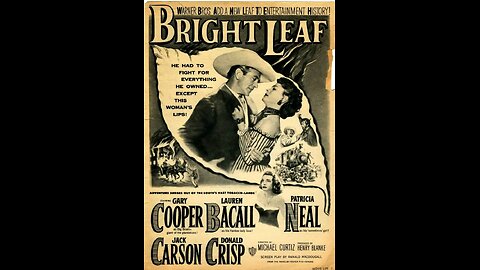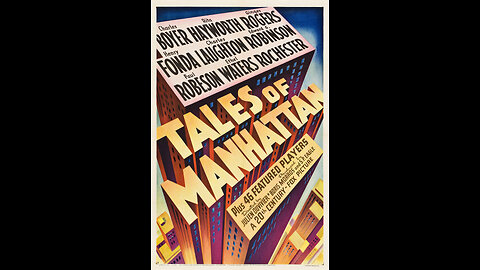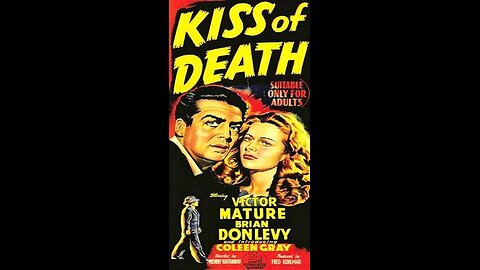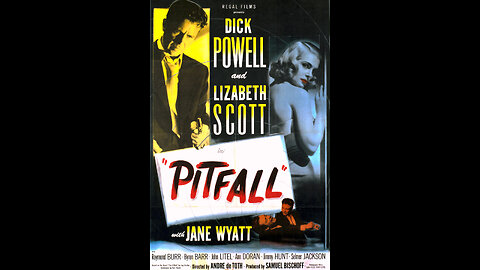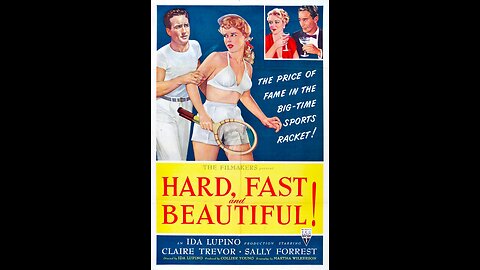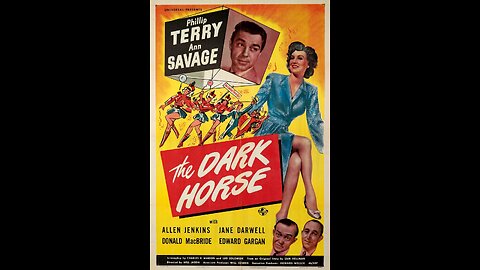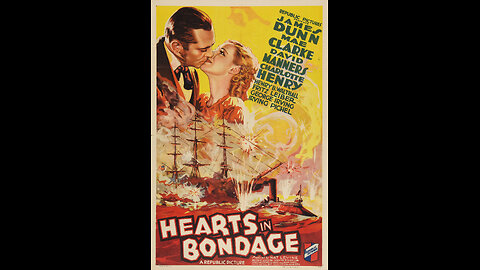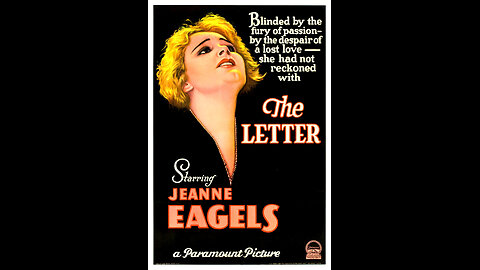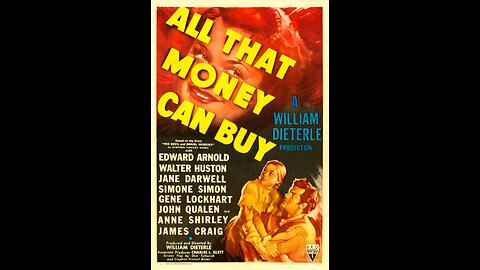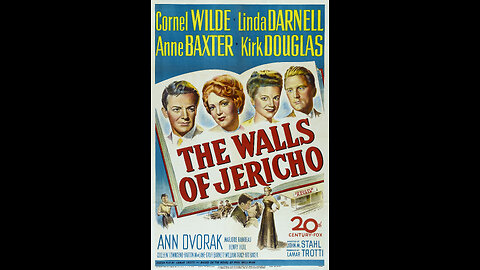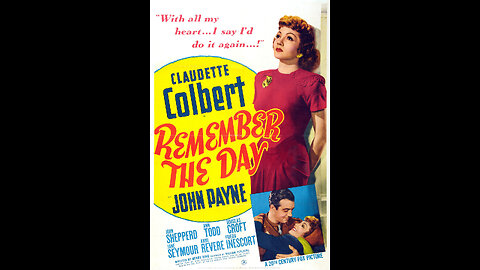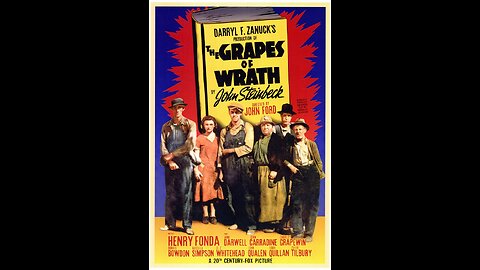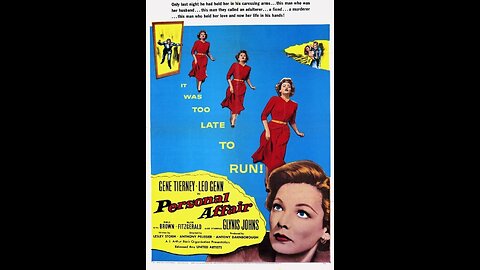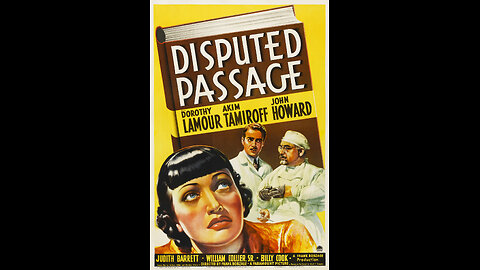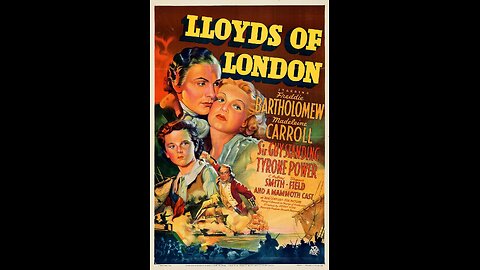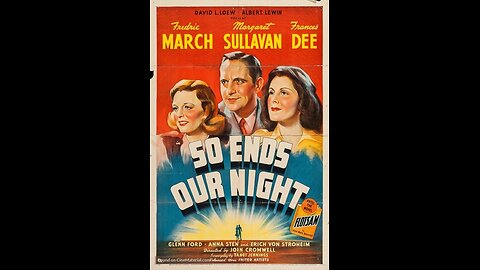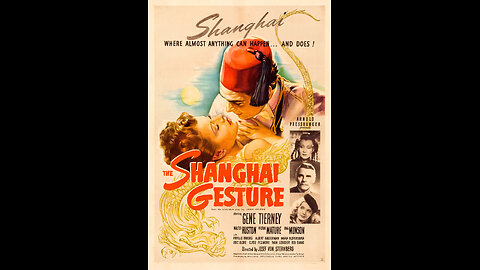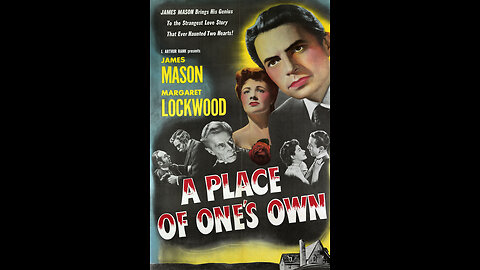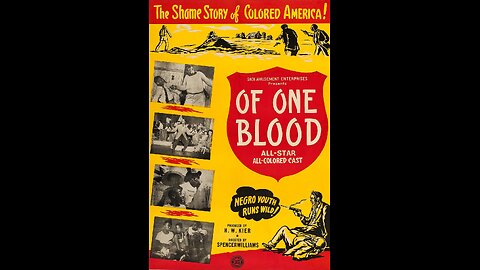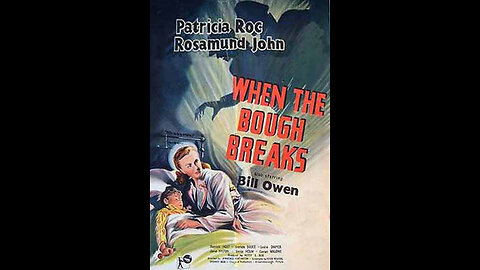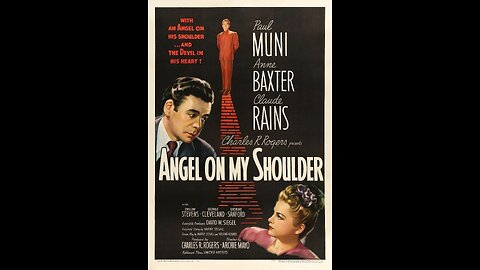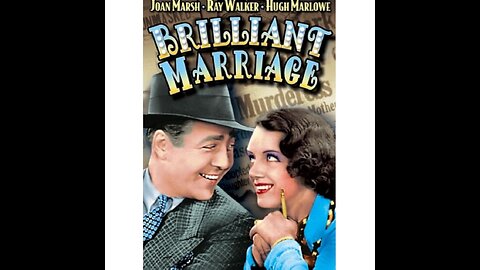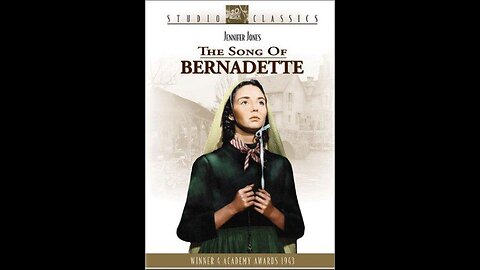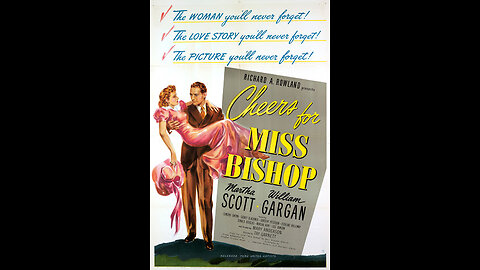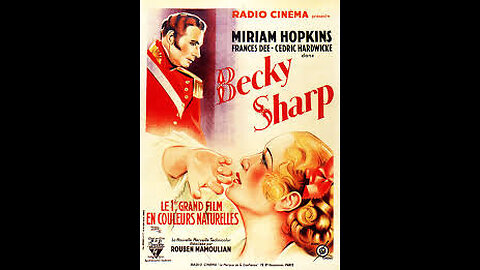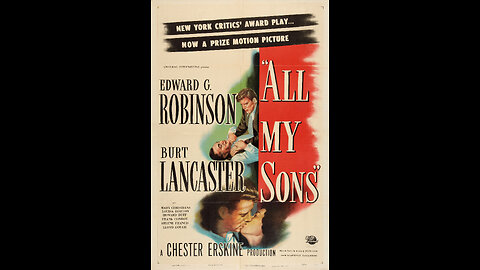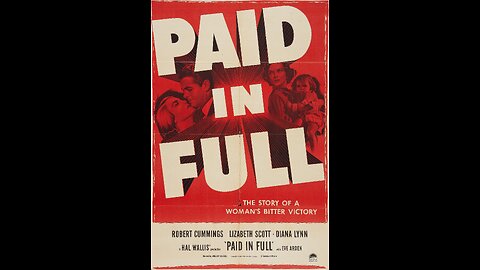Premium Only Content
This video is only available to Rumble Premium subscribers. Subscribe to
enjoy exclusive content and ad-free viewing.
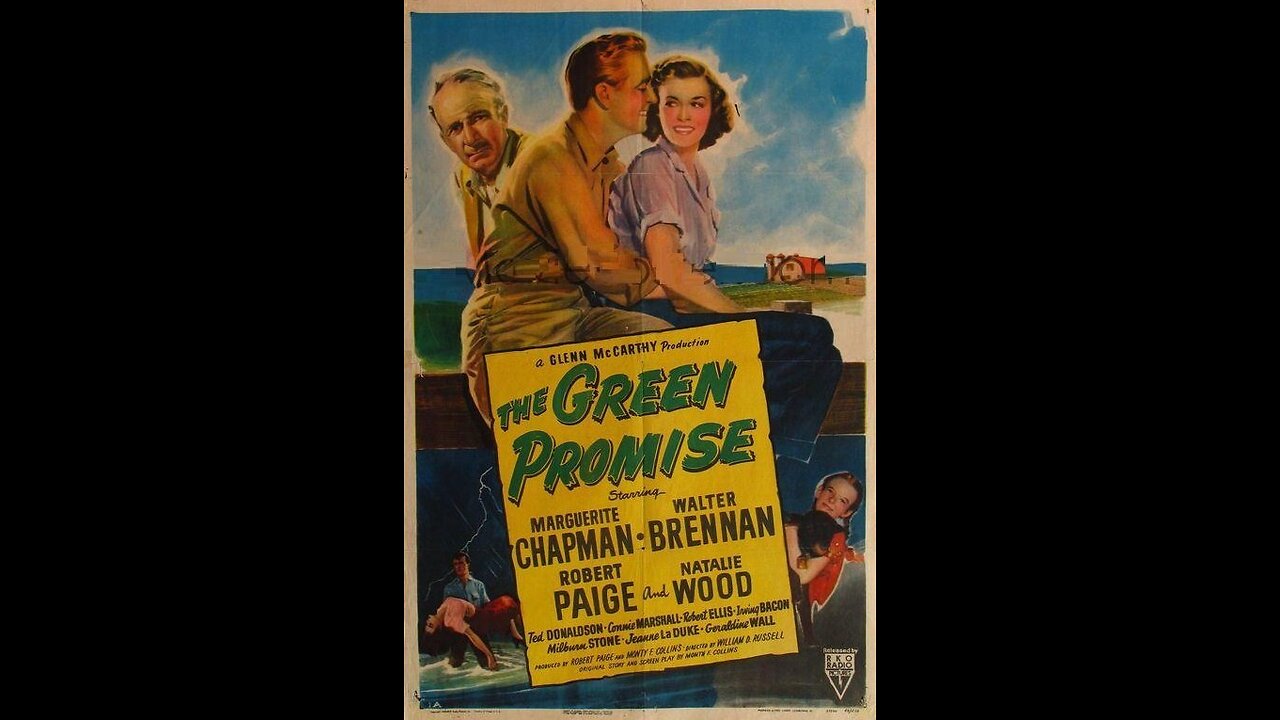
Drama Classics
Cinema2000
- 43 / 149
1
Mr. Smith Goes to Washington (1939) | Directed by Frank Capra
Classic Films & Movies Archive
"Mr. Smith Goes to Washington" is a political drama that tells the story of Jefferson Smith, an idealistic and naive young man who is unexpectedly appointed to the United States Senate. Upon arriving in Washington, he is overwhelmed by corruption and cynicism but ultimately rises to confront the entrenched political machine through a dramatic filibuster in defense of truth and democratic ideals.
Genre: Political Drama
Director: Frank Capra
Frank Capra was one of the most influential directors of Hollywood's Golden Age, known for films that celebrated individualism, decency, and democratic values. Born in Sicily in 1897 and raised in the United States, Capra rose to prominence in the 1930s with socially conscious comedies and dramas such as "It Happened One Night", "Mr. Deeds Goes to Town", and "You Can’t Take It with You". His work earned multiple Academy Awards and became synonymous with the optimistic, humanistic spirit of American cinema.
Star Cast:
* James Stewart as Jefferson Smith
* Jean Arthur as Clarissa Saunders
* Claude Rains as Senator Joseph Paine
* Edward Arnold as Jim Taylor
* Guy Kibbee as Governor Hopper
* Thomas Mitchell as Diz Moore
* Harry Carey as President of the Senate
Upon release, "Mr. Smith Goes to Washington" sparked both acclaim and controversy. Critics praised James Stewart’s moving performance and Capra’s powerful direction, while some politicians viewed the film as an unflattering portrayal of government. Despite this, the film was a major box office success and won the New York Film Critics Circle Award for Best Actor (James Stewart). It received eleven Academy Award nominations and has since become a beloved American classic, celebrated for its enduring message about integrity in public service.
Fun Facts:
* The film marked James Stewart’s breakout role and helped define his screen persona.
* It was nominated for eleven Oscars but won only one: Best Original Story (Lewis R. Foster).
* Real senators were reportedly so disturbed by the film’s depiction of the Senate that it was banned in some countries as anti-government propaganda.
* The famous filibuster scene, in which Stewart speaks until he collapses, was based on real-life Senate procedures.
* The Capitol sets were meticulously recreated at Columbia Studios, since filming inside the actual Senate chambers was not allowed.
* In 1989, the film was added to the United States National Film Registry by the Library of Congress for being "culturally, historically, or aesthetically significant".
* This Rumble Movie Channel is comprehensively indexed on https://kinoquick.com - find you favourite movies fast & free!
* Follow this channel to be notified of daily movie updates.
2
The Secret of Dr. Kildare (1939) | Directed by Harold S. Bucquet
Classic Films & Movies Archive
The Secret of Dr. Kildare is the fourth film in the popular Dr. Kildare series. It follows the young and idealistic Dr. James Kildare as he continues his medical training under the gruff but brilliant Dr. Leonard Gillespie. In this installment, Kildare is assigned to diagnose and treat the emotionally troubled daughter of a wealthy industrialist, while also helping his mentor secretly battle a serious illness.
Genre: Medical Drama
Director: Harold S. Bucquet
Harold S. Bucquet was a British-born director who made a mark in Hollywood with his work on the Dr. Kildare series. He began his career as an assistant director and worked his way up to directing B-movies and studio dramas. Bucquet was known for his efficient, character-driven storytelling and his collaborations with actors like Lionel Barrymore and Lew Ayres. He died at a young age in 1946, cutting short a promising career.
Star Cast:
Lew Ayres as Dr. James Kildare
Lionel Barrymore as Dr. Leonard Gillespie
Lionel Atwill as Paul Messenger
Helen Gilbert as Nancy Messenger
Nat Pendleton as Joe Wayman
Emma Dunn as Molly Byrd
The film was well received by audiences who had grown fond of the ongoing Kildare saga. Its blend of medical intrigue, character drama, and moral themes made it a steady performer at the box office. Critics praised the chemistry between Ayres and Barrymore, as well as the film’s mix of heartfelt moments and clinical dilemmas. It helped solidify Dr. Kildare as one of the most enduring fictional physicians in American film.
Fun Facts:
* The Dr. Kildare series was so popular that it inspired radio programs, comic strips, and eventually a 1960s television show.
* Lionel Barrymore, who played Dr. Gillespie, was confined to a wheelchair in real life due to arthritis, a condition which was written into the character.
* The film was part of MGM’s effort to create recurring film franchises, a strategy that proved successful with audiences during the Depression and wartime years.
* Lew Ayres’ portrayal of Dr. Kildare made him a household name, though his later conscientious objector status during World War II temporarily stalled his career.
* This Rumble Movie Channel is comprehensively indexed on https://kinoquick.com - find you favourite movies fast & free!
* Follow this channel to be notified of daily movie updates.
3
Carnival Story (1954) | Directed by Kurt Neumann
Classic Films & Movies Archive
Carnival Story is a dramatic tale set against the vibrant backdrop of a traveling German carnival. It follows the journey of a young woman named Willi who is swept up in the chaotic and colorful world of performers, con men, and high-flying stunts. As she navigates a whirlwind of romance and betrayal, the story reveals the darker undercurrents of carnival life.
Genre: Drama
Director: Kurt Neumann
Kurt Neumann was a German-born director who made a name for himself in Hollywood during the 1930s through the 1950s. He was known for directing a mix of adventure films, science fiction, and melodramas. Among his best-known works is the 1958 science fiction classic The Fly. Neumann had a knack for efficient storytelling and was a reliable director for low to mid-budget productions.
Star Cast:
Anne Baxter as Willi
Steve Cochran as Joe Hammond
Lyle Bettger as Frank Collini
George Nader as Bill Vines
Jay C. Flippen as Groppo
Upon its release, Carnival Story received mixed reviews. Some critics found the film overly melodramatic, but audiences were drawn to its exotic setting and emotionally charged performances, particularly that of Anne Baxter. The film was also noted for its location shooting in Germany and its vivid depiction of carnival life. Its American release in Technicolor helped boost its visual appeal.
Fun Facts:
* Carnival Story was shot on location in Munich, Germany, and features actual carnival performers in many of the scenes.
* The film was released in both English and German versions, with the German-language version directed by Hans Albin.
* This was one of a few American films of the era to be produced in Europe post-WWII, reflecting the industry’s growing international outlook.
* The film’s star, Anne Baxter, was already an Academy Award winner when she took on the role of Willi, bringing serious acting gravitas to the production.
* This Rumble Movie Channel is comprehensively indexed on https://kinoquick.com - find you favourite movies fast & free!
* Follow this channel to be notified of daily movie updates.
4
Great Expectations (1946) | Directed by David Lean
Classic Films & Movies Archive
Great Expectations is a British drama film adaptation of Charles Dickens's classic novel of the same name. It tells the story of a young orphan named Pip who unexpectedly comes into wealth and social status, thanks to an anonymous benefactor. As Pip navigates life in the upper class, he confronts themes of loyalty, love, ambition, and personal transformation, all while trying to unravel the mystery behind his rise.
Genre: Drama, Romance, Coming-of-Age, Literary Adaptation
Director: David Lean
David Lean was an acclaimed British film director, producer, and screenwriter, renowned for his masterful adaptations of literary works and epic cinematic storytelling. Born in 1908, Lean began his career as a film editor before transitioning to directing. He gained international fame for his adaptations of Dickens novels, followed by large-scale productions such as *The Bridge on the River Kwai*, *Lawrence of Arabia*, and *Doctor Zhivago*. Known for his technical precision and sweeping visuals, Lean became one of Britain’s most respected directors and a major influence on cinematic form.
Star Cast:
* John Mills as Pip
* Valerie Hobson as Estella
* Martita Hunt as Miss Havisham
* Alec Guinness as Herbert Pocket
* Bernard Miles as Joe Gargery
* Jean Simmons as young Estella
* Finlay Currie as Magwitch
* Francis L. Sullivan as Jaggers
The film was met with critical acclaim both in the UK and internationally. Critics praised the atmospheric cinematography, strong performances, and faithful yet cinematic treatment of Dickens’s novel. It was particularly lauded for its striking use of black-and-white visuals and tight narrative structure. Great Expectations won two Academy Awards (Best Art Direction and Best Cinematography) and received three additional nominations, including Best Director and Best Picture. It is widely considered one of the finest Dickens adaptations ever filmed.
Fun Facts:
* This film marked one of the earliest screen appearances of Alec Guinness, who would go on to have a distinguished acting career.
* David Lean cast real-life teenager Jean Simmons as the young Estella, and her performance became one of the most memorable elements of the film.
* The production was filmed at Denham Studios in Buckinghamshire, and its gothic sets, particularly Miss Havisham’s decaying mansion, were praised for their eerie and evocative design.
* Charles Dickens’s great-grandson, Cedric Charles Dickens, reportedly approved of the adaptation, considering it a respectful and powerful visualization of his ancestor’s work.
* The film's success played a crucial role in launching David Lean's career into international prominence, leading to his later epics.
* This Rumble Movie Channel is comprehensively indexed on https://kinoquick.com - find you favourite movies fast & free!
* Follow this channel to be notified of daily movie updates.
1
comment
5
The Diary of a Chambermaid (1946) | Directed by Jean Renoir
Classic Films & Movies Archive
"The Diary of a Chambermaid" is a period drama set in France that follows Celestine, a beautiful and ambitious chambermaid who arrives at the Lanlaire estate. There she encounters a strange and decadent household filled with desire, jealousy, and hidden cruelty. Through manipulation and shrewd observation, Celestine seeks to advance her position, uncovering the sordid undercurrents beneath the aristocratic facade.
Genre: Drama, Mystery
Director: Jean Renoir
Jean Renoir was a renowned French director and screenwriter, widely considered one of the greatest filmmakers of all time. Born in 1894, he was the son of the impressionist painter Pierre-Auguste Renoir. Jean Renoir's career spanned both French and American cinema, with landmark works including "Grand Illusion" and "The Rules of the Game." After fleeing Nazi-occupied France, he made several films in Hollywood, where he brought a European sensibility to his storytelling. Known for his humanistic themes and innovative camera techniques, Renoir's work has deeply influenced generations of filmmakers.
Star Cast:
* Paulette Goddard as Celestine
* Burgess Meredith as Captain Mauger
* Hurd Hatfield as Georges Lanlaire
* Francis Lederer as Joseph the valet
* Judith Anderson as Madame Lanlaire
* Reginald Owen as Monsieur Lanlaire
"The Diary of a Chambermaid" received mixed reviews upon release. While some critics appreciated Jean Renoir’s sophisticated touch and Paulette Goddard’s central performance, others felt the film lacked the edge and complexity of earlier versions of the story. The film was seen as a curious blend of Hollywood polish and European restraint, not fully satisfying either camp, but still notable for its thematic boldness and moody atmosphere.
Fun Facts:
* The film was based on the controversial 1900 novel by Octave Mirbeau, which had previously been adapted for the screen in 1946 and would be revisited in later versions by directors like Luis Buñuel (1964) and Benoît Jacquot (2015).
* Renoir and Paulette Goddard were briefly romantically involved during the time of filming.
* Burgess Meredith, who played a key supporting role, was also the film’s producer.
* The movie marked one of Renoir’s final Hollywood productions before he returned to Europe in the early 1950s.
* Despite the drama’s period setting, the film subtly reflects postwar American concerns about class, power, and personal ambition.
* This Rumble Movie Channel is comprehensively indexed on https://kinoquick.com - find you favourite movies fast & free!
* Follow this channel to be notified of daily movie updates.
6
The Wagons Roll at Night (1941) | Directed by Ray Enright
Classic Films & Movies Archive
The Wagons Roll at Night is a drama set in the world of traveling circuses, where ambition, jealousy, and romance collide under the big top. Humphrey Bogart stars as Nick Coster, a hard-nosed circus manager who recruits a naive country boy named Matt Varney after witnessing his bravery. Matt quickly rises as a lion tamer and begins a romance with Nick’s younger sister, Mary. Tensions escalate as personal and professional rivalries erupt, culminating in a dramatic and dangerous confrontation during a circus performance.
Genre: Drama / Circus Film
Director: Ray Enright
Ray Enright was a prolific American director known for his work in musicals, westerns, and crime dramas during the 1930s and 1940s. He began his career at Warner Bros., where he developed a reputation for competent, fast-paced studio pictures. Though not a household name, Enright was a dependable craftsman whose films often featured dynamic action and efficient storytelling. *The Wagons Roll at Night* was one of several collaborations he had with Warner Bros.' contract stars, including Humphrey Bogart.
Star Cast:
* Humphrey Bogart as Nick Coster
* Sylvia Sidney as Flo Lorraine
* Eddie Albert as Matt Varney
* Joan Leslie as Mary Coster
* Sig Ruman as Hoffman the Great
* Cliff Clark as Police Captain
The film received generally positive reviews from audiences and critics alike. It was seen as a solid Warner Bros. drama with a compelling performance from Bogart, although it did not achieve the lasting acclaim of his gangster or noir roles. Eddie Albert was praised for his sympathetic portrayal of the innocent Matt, and Sylvia Sidney brought emotional depth to the role of Flo. The behind-the-scenes circus setting added a fresh twist to familiar melodramatic themes.
Fun Facts:
* *The Wagons Roll at Night* was a loose remake of the earlier Warner Bros. film *Kid Galahad* (1937), transposing the boxing world into a circus setting.
* This was one of the few roles in which Humphrey Bogart played a morally complex authority figure rather than a criminal or anti-hero, just before his rise to superstardom in *The Maltese Falcon* later that year.
* The film’s title is a reference to the nocturnal schedule of traveling circuses, emphasizing the hidden dramas behind the performances.
* Real circus animals were used during the lion-taming scenes, adding a degree of authenticity and risk to the production.
* Joan Leslie was only 16 years old during filming but already gaining recognition as a rising star at Warner Bros.
* This Rumble Movie Channel is comprehensively indexed on https://kinoquick.com - find you favourite movies fast & free!
* Follow this channel to be notified of daily movie updates.
7
The Wreck of the Hesperus (1948) | Directed by John Hoffman
Classic Films & Movies Archive
The Wreck of the Hesperus is a seafaring drama inspired by the famous poem of the same name by Henry Wadsworth Longfellow. Set in a coastal New England town, the film tells the story of a disgraced sea captain who takes over the management of a lighthouse after losing his ship in a storm. Suspicion grows in the community as mysterious events unfold, ultimately revealing a criminal smuggling operation tied to a dangerous local gang.
Genre: Drama / Adventure / Mystery
Director: John Hoffman
John Hoffman was a relatively low-profile director active during the 1940s. Known primarily for his work with Columbia Pictures, he specialized in directing modestly budgeted dramas and mysteries. His filmography includes a handful of features and television work, with The Wreck of the Hesperus being one of his more notable theatrical releases, albeit a lesser-known one.
Star Cast:
* Willard Parker as John McReady
* Patricia Barry (credited as Patricia White) as Deborah Allen
* Holmes Herbert as George Lockhart
* Edgar Buchanan as George Potter
* Paul E. Burns as Caleb Cross
* Jeff Corey as Bush
The Wreck of the Hesperus received mixed reviews upon release. While it didn’t make a major impact at the box office, it was appreciated for its atmospheric setting and suspenseful plot. Some critics found the adaptation of the poem somewhat loose, but acknowledged the film's efforts to craft a moody maritime mystery. Over time, the film became a curiosity piece for fans of 1940s B-movie dramas and literary adaptations.
Fun Facts:
* The movie takes its title and loose inspiration from Longfellow’s tragic 1842 poem, though the film's plot diverges significantly from the original narrative.
* This film was one of several maritime-themed thrillers released by Columbia Pictures during the late 1940s.
* Patricia Barry, billed here as Patricia White, would later become a staple of television in the 1950s and 1960s.
* The film was shot using existing sets and modest special effects to recreate storm sequences, keeping with Columbia’s typical B-picture budget constraints.
* This Rumble Movie Channel is comprehensively indexed on https://kinoquick.com - find you favourite movies fast & free!
* Follow this channel to be notified of daily movie updates.
8
In This Our Life (1942) | Directed by John Huston
Classic Films & Movies Archive
In This Our Life is a gripping drama centered on the destructive behavior of a selfish and manipulative woman who ruins lives around her in a trail of betrayal, lies, and personal ambition. The story unfolds as two sisters, once close, find themselves torn apart by jealousy, love, and tragedy. Set against the backdrop of the American South, the film examines themes of family loyalty, moral responsibility, and racial injustice.
Genre: Drama
Director: John Huston
John Huston was an acclaimed American filmmaker, screenwriter, and actor, renowned for his literary adaptations and psychologically complex characters. He debuted as a director with the classic *The Maltese Falcon* in 1941 and went on to direct influential films such as *The Treasure of the Sierra Madre*, *The African Queen*, and *The Asphalt Jungle*. Known for his bold narrative style and philosophical depth, Huston became one of Hollywood's legendary auteurs.
Star Cast:
* Bette Davis as Stanley Timberlake
* Olivia de Havilland as Roy Timberlake
* George Brent as Craig Fleming
* Dennis Morgan as Peter Kingsmill
* Charles Coburn as William Fitzroy
* Hattie McDaniel as Minerva Clay
At the time of its release, *In This Our Life* drew attention for its intense performances, especially Bette Davis’s portrayal of the conniving Stanley. While some critics praised the film’s dramatic power, others found its moral tone heavy-handed. The film’s candid depiction of racial prejudice, particularly involving a subplot about a young Black man falsely accused of a crime, was progressive for its time and later noted by historians for its social significance.
Fun Facts:
* The screenplay was based on the Pulitzer Prize-winning novel by Ellen Glasgow.
* The film marked John Huston’s second directorial effort after his breakthrough with *The Maltese Falcon*.
* Bette Davis and Olivia de Havilland, two of Warner Bros.' biggest stars, played against type as rival sisters, with Davis embracing a darker, villainous role.
* The film includes one of the earliest and most explicit condemnations of racial injustice in a mainstream Hollywood release during the 1940s.
* This Rumble Movie Channel is comprehensively indexed on https://kinoquick.com - find you favourite movies fast & free!
* Follow this channel to be notified of daily movie updates.
9
A Bill of Divorcement (1940) | Directed by John Farrow
Classic Films & Movies Archive
This poignant family drama revolves around a woman who is preparing to remarry after her husband has spent years in an asylum. Just as her future seems secure, he unexpectedly returns, recovered but deeply changed. His reappearance threatens the emotional balance of the household and forces each family member to confront painful truths about love, responsibility, and the scars of the past.
Genre: Drama
Director: John Farrow
John Farrow was an Australian-born director and screenwriter who built a successful career in Hollywood during the 1930s and 1940s. Known for his efficient storytelling and thematic focus on moral dilemmas, Farrow directed a wide range of films, from noir to adventure. He was married to actress Maureen O’Sullivan and was the father of actress Mia Farrow. His filmography includes acclaimed works such as *Wake Island* and *The Big Clock*.
Star Cast:
* Maureen O'Hara as Sidney Fairfield
* Adolphe Menjou as Hilary Fairfield
* Fay Bainter as Margaret Fairfield
* Herbert Marshall as Gray Meredith
* Dame May Whitty as Aunt Hester
* Harry Davenport as Reverend Christopher Pumphrey
The 1940 version of *A Bill of Divorcement* was received with moderate acclaim. While it was often compared unfavorably to the 1932 version starring Katharine Hepburn in her screen debut, critics still appreciated the earnest performances, especially those of Fay Bainter and Adolphe Menjou. The film resonated with audiences for its sensitive treatment of mental illness and the emotional toll of family upheaval.
Fun Facts:
* This was the second screen adaptation of Clemence Dane’s 1921 stage play; the first, in 1932, was notable for launching Katharine Hepburn’s film career.
* Maureen O’Hara, then an emerging star at RKO, took on a more serious role here, departing from her earlier, lighter parts.
* Although not a major hit, the film helped reinforce John Farrow’s reputation as a dependable director of literary adaptations.
* The themes of mental health and social taboos made it somewhat daring for its time, even as it softened some of the original play’s more controversial implications.
* This Rumble Movie Channel is comprehensively indexed on https://kinoquick.com - find you favourite movies fast & free!
* Follow this channel to be notified of daily movie updates.
10
It Always Rains on Sundays (1947) | Directed by Robert Hamer
Classic Films & Movies Archive
It Always Rains on Sundays is a British realist drama set in postwar London, focusing on a single rain-soaked day in the life of a working-class family in the East End. The story centers on Rose Sandigate, a former barmaid turned housewife, whose mundane domestic life is disrupted when her ex-lover, an escaped convict, hides out in her home. As the hours pass, tensions rise, secrets surface, and the ordinary day becomes a crucible of desire, guilt, and social pressure.
Genre: Drama, Crime, Social Realism
Director: Robert Hamer
Robert Hamer was a British film director and screenwriter known for his work with Ealing Studios during the 1940s and early 1950s. Though his career was relatively short due to personal struggles, Hamer left a lasting impact with his sharp character studies and sophisticated handling of everyday British life. His best-known film is *Kind Hearts and Coronets* (1949), a dark comedy classic. He was known for combining wit, nuance, and bleak realism in his films.
Star Cast
* Googie Withers as Rose Sandigate
* Edward Chapman as George Sandigate
* Susan Shaw as Doris Sandigate
* John Slater as Morry Hyams
* Jack Warner as Detective Sergeant Fothergill
* John McCallum as Tommy Swann
* Patricia Plunkett as Vi Sandigate
Upon release, It Always Rains on Sundays was a critical and commercial success in Britain. Audiences appreciated its unflinching portrayal of postwar hardships, as well as its emotionally complex female lead. Googie Withers’ performance received widespread acclaim. The film stood out for its honest depiction of domestic and emotional frustration in a working-class setting and has since been recognized as an important precursor to British kitchen-sink realism.
Fun Facts
* Much of the film was shot on location in London’s Bethnal Green, lending authenticity to its depiction of East End life.
* Googie Withers and John McCallum, who played ex-lovers in the film, later married in real life and remained together until McCallum’s death in 2010.
* The film was produced by Ealing Studios, best known for their comedies, but this darker, moodier entry showcased the studio’s range and ambition.
* The screenplay was adapted from the novel by Arthur La Bern, who later wrote *Goodbye Piccadilly, Farewell Leicester Square*, which became the basis for Hitchcock’s *Frenzy*.
* Its interweaving of multiple subplots and characters influenced later ensemble dramas and contributed to the evolution of British cinematic realism.
* This Rumble Movie Channel is comprehensively indexed on https://kinoquick.com - find you favourite movies fast & free!
* Follow this channel to be notified of daily movie updates.
11
Challenge to Lassie (1949) | Directed by Richard Thorpe
Classic Films & Movies Archive
Challenge to Lassie is a heartwarming family drama inspired by the true story of Greyfriars Bobby, a loyal dog in 19th-century Scotland. The film follows Lassie, playing the role of Bobby, who remains faithfully by her master's grave after his passing. As authorities attempt to remove the dog from the cemetery, public sympathy grows, leading to a legal and emotional battle over Lassie's right to stay. The film emphasizes themes of loyalty, justice, and the human-animal bond.
Genre: Family, Drama
Director: Richard Thorpe
Richard Thorpe was an American film director with a lengthy career at MGM, directing more than 180 films between the 1920s and 1960s. Known for his versatility and professionalism, Thorpe worked across various genres including adventure, musicals, and family dramas. Though rarely considered an auteur, his consistency and craftsmanship made him a dependable studio director, particularly on large-scale productions and literary adaptations.
Star Cast:
Pal as Lassie
Donald Crisp as Jock Gray
Geraldine Brooks as Susan Brown
Edmund Gwenn as John Traill
Reginald Owen as The Lord Provost
Alan Webb as Sergeant Davie
Audiences at the time responded positively to the film’s touching story and Lassie’s performance, with families and animal lovers particularly drawn to its emotional resonance. While it wasn’t a box office sensation, it was well-received as another reliable installment in the Lassie film series.
Fun Facts:
Challenge to Lassie was loosely based on the legend of Greyfriars Bobby, a real Skye Terrier who guarded his master's grave in Edinburgh for 14 years.
The role of Lassie was again played by the famous dog actor Pal, who had become a household name thanks to previous Lassie films.
The film was set and shot with Scottish-themed costumes and locations to add authenticity, though most of it was produced on MGM soundstages.
It was one of several Lassie films that helped cement the character as a symbol of loyalty and courage in American pop culture.
* This Rumble Movie Channel is comprehensively indexed on https://kinoquick.com - find you favourite movies fast & free!
* Follow this channel to be notified of daily movie updates.
12
State of the Union (1948) | Directed by Frank Capra
Classic Films & Movies Archive
"State of the Union" is a political drama centered on Grant Matthews, a wealthy and idealistic businessman who is persuaded to run for President of the United States. As his campaign gains traction, he becomes increasingly entangled in political compromises and manipulations, drifting away from his values and his estranged wife, Mary. Ultimately, it is Mary who reminds him of his original ideals, forcing him to confront the true cost of political ambition and the importance of personal integrity.
Genre: Drama, Political, Romance
Frank Capra was one of America's most influential and celebrated film directors, known for his optimistic, populist themes and strong belief in the decency of the common man. An Italian immigrant, Capra rose to fame in the 1930s and 1940s with iconic films such as "It Happened One Night," "Mr. Smith Goes to Washington," and "It's a Wonderful Life." His films often portrayed individuals standing up against powerful institutions and remain classics of American cinema.
Star Cast:
- Spencer Tracy as Grant Matthews
- Katharine Hepburn as Mary Matthews
- Van Johnson as Spike McManus
- Angela Lansbury as Kay Thorndyke
- Adolphe Menjou as Jim Conover
- Lewis Stone as Sam Thorndyke
"State of the Union" was well received by critics for its intelligent script and timely exploration of American politics. Audiences appreciated its combination of political commentary and emotional depth, particularly the chemistry between Spencer Tracy and Katharine Hepburn. While not as commercially successful as some of Capra’s earlier films, it was praised for its relevance, wit, and strong performances.
Fun Facts:
- This was the only film Frank Capra directed for MGM, and it reunited him with Spencer Tracy and Katharine Hepburn for the first time.
- The film was based on the 1945 play of the same name by Howard Lindsay and Russel Crouse, which was a Broadway success.
- Angela Lansbury plays an unusually unsympathetic role as a powerful media mogul and political manipulator, showcasing her range beyond the typical ingenue roles of the era.
- The movie offers a rare behind-the-scenes look at presidential politics in the post-war period, reflecting anxieties about media influence and political integrity.
* This Rumble Movie Channel is comprehensively indexed on https://kinoquick.com - find you favourite movies fast & free!
* Follow this channel to be notified of daily movie updates.
1
comment
13
Life Begins at Eight-Thirty (1942) | Directed by Irving Pichel
Classic Films & Movies Archive
Life Begins at Eight-Thirty is a tender and character-driven drama about a washed-up Shakespearean actor struggling with alcoholism and his deep bond with his devoted, disabled daughter. The story centers on Madden Thomas, who is given a second chance at his career thanks to the unwavering love and encouragement of his daughter Kathi. As he prepares for a Broadway comeback, their relationship is tested by his personal demons and the complications of Kathi’s budding romance. The film is a heartfelt exploration of redemption, sacrifice, and the healing power of love.
Genre: Drama
Director: Irving Pichel
Irving Pichel was an American film director and actor, active in Hollywood from the 1930s through the early 1950s. He started his career on the stage and in early talkies before moving behind the camera. Pichel became known for directing thoughtful dramas and occasional thrillers, often focusing on human resilience and social issues. Though he was later blacklisted during the McCarthy era, his work remains notable for its emotional depth and strong performances.
Star Cast:
- Monty Woolley as Madden Thomas
- Ida Lupino as Kathi Thomas
- Cornel Wilde as Robert Carter
- Sara Allgood as Alma Lothian
- Melville Cooper as Mr. Cowan
- William Demarest as Mr. Perkins
Audiences and critics responded positively to the film’s emotional sincerity and the strong central performances, especially Monty Woolley as the aging, self-destructive actor and Ida Lupino as his sensitive daughter. The film was praised for its nuanced portrayal of disability, uncommon for its time, and its sensitive handling of addiction and family dynamics. It wasn’t a major box office hit, but it received attention for its mature themes and heartfelt storytelling.
Fun Facts:
- The film was based on the play "The Light of Heart" by Emlyn Williams, which originally premiered in London in 1940.
- Ida Lupino received particular acclaim for her portrayal of Kathi, a role that required both physical restraint and emotional complexity.
- Monty Woolley, best known for his role in The Man Who Came to Dinner, brought a layered performance to the role of the disillusioned actor.
- The film’s title refers to the curtain time of Broadway shows, symbolizing both the hope of artistic renewal and the start of personal transformation.
- Despite its somber themes, the film maintains a hopeful tone and emphasizes the importance of love, dignity, and perseverance.
Life Begins at Eight-Thirty remains a moving portrait of familial devotion and second chances, highlighted by fine performances and a compassionate narrative.
* This Rumble Movie Channel is comprehensively indexed on https://kinoquick.com - find you favourite movies fast & free!
* Follow this channel to be notified of daily movie updates.
14
Home Town Story (1951) | Directed by Arthur Pierson
Classic Films & Movies Archive
Home Town Story follows Blake Washburn, a former U.S. senator who returns to his small hometown to run the local newspaper after losing re-election. Determined to expose corporate corruption, he uses his editorial power to attack big business. However, his perspective begins to change when a mining accident and subsequent rescue effort reveal the role of large corporations in supporting communities and saving lives.
Genre: Drama
Director: Arthur Pierson
Arthur Pierson (1901–1975) was an American actor, screenwriter, and director. He began his career on the stage and in early film roles before moving behind the camera. Pierson directed only a handful of films, with Home Town Story being the most notable. After a brief stint in directing, he transitioned into television and later worked in executive roles at animation studios, including a key position at Hanna-Barbera.
Star Cast:
- Jeffrey Lynn as Blake Washburn
- Donald Crisp as John MacFarland
- Marjorie Reynolds as Janice Hunt
- Marilyn Monroe as Iris Martin
- Alan Hale Jr. as Slim Haskins
- Barbara Brown as Mrs. Washburn
Home Town Story received mixed reviews upon its release. While some viewers appreciated its patriotic message and straightforward storytelling, others found it overly didactic and simplistic in its portrayal of big business. The film is often remembered today primarily for Marilyn Monroe's early appearance, which has garnered retrospective attention.
Fun Facts:
- Home Town Story is one of Marilyn Monroe’s earliest credited roles, appearing just before her breakout performances in the early 1950s.
- The film was partially funded by General Motors and intended as a pro-industry message highlighting the positive contributions of big corporations.
- Director Arthur Pierson made only a few films before leaving directing for a successful career in television and animation production.
- The film’s pro-business message was unusual for Hollywood at the time, as many postwar dramas leaned toward populist or critical portrayals of industry.
- Donald Crisp, who plays the industrialist, was a veteran actor and Oscar winner, known for roles in classics like How Green Was My Valley.
* This Rumble Movie Channel is comprehensively indexed on https://kinoquick.com - find you favourite movies fast & free!
* Follow this channel to be notified of daily movie updates.
15
Corridor of Mirrors (1948) | Directed by Terence Young
Classic Films & Movies Archive
Corridor of Mirrors is a British drama that intertwines romance, mystery, and psychological intrigue. The narrative follows Mifanwy Conway, a young woman who becomes entangled with Paul Mangin, a wealthy and eccentric artist obsessed with the Renaissance era. Mangin believes that Mifanwy is the reincarnation of his past lover from centuries ago. As their relationship deepens, Mifanwy finds herself drawn into Mangin's elaborate fantasies, leading to a suspenseful exploration of identity, obsession, and the boundaries between reality and delusion.
Genre: Drama, Mystery, Romance
Director: Terence Young
Terence Young was a British film director and screenwriter, born in 1915. He began his career as a screenwriter before transitioning to directing. Young is best known for directing three James Bond films: Dr. No (1962), From Russia with Love (1963), and Thunderball (1965). His work on these films helped establish the iconic style of the Bond series. Young's directorial debut was Corridor of Mirrors, showcasing his early talent for creating atmospheric and suspenseful narratives.
Star Cast:
- Eric Portman as Paul Mangin
- Edana Romney as Mifanwy Conway
- Barbara Mullen as Veronica
- Hugh Sinclair as Owen Rhys
- Bruce Belfrage as Sir David Conway
- Joan Maude as Caroline Hart
- Christopher Lee as Charles
- Lois Maxwell as Lois
Upon its release, Corridor of Mirrors received mixed reviews. Critics praised its atmospheric cinematography and the performances of Eric Portman and Edana Romney. However, some found the plot to be overly melodramatic. Over time, the film has been re-evaluated and is now considered an underrated gem, noted for its gothic ambiance and exploration of psychological themes.
Fun Facts:
- Corridor of Mirrors marked the film debut of Christopher Lee, who would later become famous for his roles in horror cinema.
- The film was also the directorial debut of Terence Young, who went on to direct several James Bond films.
- Edana Romney, who played Mifanwy Conway, co-wrote the screenplay and was instrumental in bringing the project to fruition.
- The film's lavish set designs and costumes were influenced by Jean Cocteau's La Belle et la Bête and David Lean's Brief Encounter.
- The movie was shot at the Studios Radio Cinema in Paris, adding to its distinctive European aesthetic.
* This Rumble Movie Channel is comprehensively indexed on https://kinoquick.com - find you favourite movies fast & free! Subscribe to this channel to be notified of daily movie updates.
16
Boots Malone (1952) | Directed by William Dieterle
Classic Films & Movies Archive
Boots Malone is a drama centered around the world of horse racing and the redemption of a washed-up jockey agent. The film follows Boots Malone, a once-successful horse trainer and jockey agent who has fallen on hard times. When a wealthy runaway teenager, Tom Foley, buys a racehorse and wants to become a jockey, Boots takes him under his wing, hoping to use the boy to regain his former glory. However, as their relationship develops, Boots begins to see the boy as more than just a means to an end, leading to a story of second chances and personal redemption.
Genre: Drama, Sports
Director: William Dieterle
William Dieterle was a German-American film director known for his work in Hollywood during the 1930s and 1940s. Born in 1893 in Germany, he started as an actor before transitioning to directing. He gained recognition for historical dramas and literary adaptations, such as The Hunchback of Notre Dame (1939) and The Devil and Daniel Webster (1941). His films often featured strong character-driven storytelling and an emphasis on moral dilemmas. Dieterle was respected for his ability to blend realism with dramatic intensity.
Star Cast:
- William Holden as Boots Malone
- Johnny Stewart as Tom Foley
- Stanley Clements as Stash Clements
- Basil Ruysdael as Preacher
- Ed Begley as John Vinnie
Boots Malone received moderate reviews upon its release, with critics praising William Holden’s performance as the tough but sympathetic racing agent. While the film didn’t achieve major box office success, it was appreciated for its gritty, realistic portrayal of the behind-the-scenes world of horse racing. Over time, it has gained recognition as an underrated sports drama with a strong character-driven story.
Fun Facts:
- William Holden, who played the title role, was a lifelong horse racing fan, which added authenticity to his performance.
- The film was shot on location at several racetracks, giving it a more realistic feel than many other racing films of the era.
- Boots Malone is often compared to other classic sports dramas that explore themes of mentorship and redemption, such as The Set-Up (1949) and Champion (1949).
- Director William Dieterle was more well-known for historical epics, making this sports drama a departure from his usual style.
- Despite its initial lukewarm reception, the film has been reevaluated in later years as a compelling character study with a strong central performance by William Holden.
* This Rumble Movie Channel is comprehensively indexed on https://kinoquick.com - find you favourite movies fast & free! Subscribe to this channel to be notified of daily movie updates.
17
Ruby Gentry (1952) | Southern Gothic melodrama directed by King Vidor
Classic Films & Movies Archive
"Ruby Gentry" is a 1952 Southern Gothic melodrama directed by King Vidor. The film stars Jennifer Jones in the titular role, Charlton Heston, and Karl Malden. Set against the backdrop of the rural South, the narrative explores themes of social class, forbidden love, and personal ambition. Here's a detailed description of the film:
Plot Summary:
Ruby Corey (Jennifer Jones), a young woman from the wrong side of the tracks in the Southern town of Braddock, aspires to escape her impoverished background. The Gentrys, a wealthy family in the community, take an interest in Ruby's beauty and vivacity. Boake Tackman (Charlton Heston), a member of the Gentry family, falls in love with Ruby, leading to a complex love triangle.
As Ruby becomes entwined with the Gentrys, she navigates the complexities of social expectations, family dynamics, and personal desires. The film unfolds as a flashback, with Ruby reflecting on the events that shaped her life, particularly her relationships with the two men.
Key Themes:
1. Social Class Struggles: "Ruby Gentry" explores the rigid social hierarchy of the Southern community, emphasizing the challenges faced by individuals attempting to transcend their socio-economic backgrounds.
2. Forbidden Love: The film delves into the complexities of forbidden love and societal expectations. Ruby's relationship with Boake challenges the norms of the time, leading to tension and conflict within the community.
3. Ambition and Desire: Ruby's character is driven by ambition and a desire for a better life. Her journey reflects the pursuit of personal goals against the backdrop of societal constraints.
Production and Reception:
Directed by King Vidor, "Ruby Gentry" benefits from the atmospheric cinematography capturing the Southern landscape. Jennifer Jones delivers a powerful performance as Ruby, showcasing the character's strength and vulnerability.
Upon its release, "Ruby Gentry" received mixed reviews, with praise for its performances and criticism for its melodramatic elements. The film's lush cinematography and the evocative portrayal of Southern life contribute to its lasting appeal.
Legacy:
"Ruby Gentry" remains notable for its exploration of Southern culture, forbidden romance, and the struggle for upward mobility. The film's examination of societal expectations and personal choices adds depth to its narrative, making it a distinctive entry in the melodramatic genre.
In summary, "Ruby Gentry" offers audiences a compelling story of love, ambition, and societal expectations, set against the picturesque yet challenging backdrop of the Southern United States in the early 20th century.
18
Bad for Each Other (1953 ) | American drama film directed by Irving Rapper
Classic Films & Movies Archive
"Bad for Each Other" is a 1953 American drama film directed by Irving Rapper. Starring Charlton Heston and Lizabeth Scott, the film explores themes of post-war adjustment, medical ethics, and the challenges of personal redemption. Here's a detailed description:
Plot Summary:
Dr. Tom Owen (Charlton Heston), a skilled surgeon, returns to his coal mining hometown in Pennsylvania after serving as a military doctor during the Korean War. Eager to establish a successful medical practice, Tom faces obstacles in the economically depressed town where the coal mines are the primary source of employment.
Tom reconnects with childhood friend and war buddy Joe Scott (Don DeFore), who introduces him to his attractive and enigmatic sister, Helen Curtis (Lizabeth Scott). Despite Tom's noble intentions, he becomes entangled in a web of personal and professional challenges.
As Tom tries to uplift the community by addressing its health needs, he discovers corruption within the local hospital and faces resistance from those with a vested interest in maintaining the status quo. Simultaneously, his relationship with Helen becomes complicated, and Tom is torn between his professional aspirations, personal integrity, and the allure of a forbidden romance.
Key Themes:
1. Post-War Adjustments: The film delves into the challenges faced by veterans reintegrating into civilian life after military service. Tom Owen's struggle to adapt to the changes in his hometown mirrors the broader societal adjustments following the Korean War.
2. Medical Ethics: Tom Owen's commitment to ethical medical practices and his efforts to expose corruption within the local hospital highlight the film's exploration of medical ethics. The narrative raises questions about the responsibilities of healthcare professionals in addressing societal issues.
3. Redemption and Romance: Tom's journey involves not only professional redemption but also personal redemption. His complex relationship with Helen adds a romantic dimension to the story, portraying the conflicts between duty, desire, and societal expectations.
Production and Reception:
"Bad for Each Other" benefits from the direction of Irving Rapper and the performances of Charlton Heston and Lizabeth Scott. The film was part of Heston's early career, showcasing his versatility beyond the epic roles he would later become known for.
Upon its release, the film received positive reviews for its engaging storyline, Heston's performance, and its exploration of societal and moral dilemmas. While not as widely remembered as some of Heston's later works, "Bad for Each Other" remains a notable entry in the post-war drama genre.
Legacy:
The film is remembered for its depiction of a post-war community grappling with economic hardships and moral complexities. Charlton Heston's portrayal of a principled doctor navigating personal and professional challenges contributes to the film's enduring appeal among fans of classic dramas.
In summary, "Bad for Each Other" is a compelling drama that weaves together themes of post-war adjustment, medical ethics, and personal redemption. Anchored by strong performances, the film offers a nuanced exploration of the complexities faced by individuals striving for integrity in challenging circumstances.
19
Dragonwyck (1946) | A Gothic drama film directed by Joseph L. Mankiewicz
Classic Films & Movies Archive
"Dragonwyck" is a Gothic drama film released in 1946, directed by Joseph L. Mankiewicz. Starring Gene Tierney, Walter Huston, and Vincent Price, the film is based on the 1944 novel of the same name by Anya Seton. Set in the mid-19th century, "Dragonwyck" combines elements of romance, mystery, and the supernatural, creating a tale of intrigue and suspense.
The story centers around Miranda Wells (Gene Tierney), a young woman from a modest farming family who receives an invitation to stay at Dragonwyck, the grand estate of her distant cousin Nicholas Van Ryn (Vincent Price). Nicholas is a wealthy and charismatic patroon who resides in a mansion with a dark history and mysterious secrets.
As Miranda becomes acquainted with life at Dragonwyck, she discovers the complex dynamics within the household, including the strained relationship between Nicholas and his wife Johanna (Vivienne Osborne). Miranda is drawn to the enigmatic charm of Nicholas, but she also uncovers unsettling truths about his past and the eerie occurrences within the mansion.
Walter Huston delivers a strong performance as Dr. Jeff Turner, the family physician and Miranda's confidant, who becomes increasingly concerned about the ominous atmosphere at Dragonwyck. Vincent Price, in one of his early roles, brings a blend of charm and mystery to the character of Nicholas Van Ryn, creating a memorable portrayal that adds to the film's atmospheric tension.
The film explores themes of social class, forbidden desires, and the supernatural, creating an atmospheric and moody narrative. The cinematography by Arthur C. Miller enhances the Gothic ambiance, using shadow and light to create a visually captivating experience. The music, composed by Alfred Newman, complements the film's mood, emphasizing the mysterious and suspenseful elements.
"Dragonwyck" is notable for its combination of historical drama and Gothic romance, offering a unique blend of genres. It has become a cult classic among fans of atmospheric and period-set films, showcasing the talents of its cast and the director's ability to create a compelling and immersive narrative. The film's lush visuals, haunting themes, and strong performances contribute to its enduring appeal as a classic in the realm of Gothic cinema.
20
Oliver Twist (1948) | Directed by David Lean
Classic Films & Movies Archive
"Oliver Twist" is a classic British film adaptation of Charles Dickens' famous novel of the same name. Directed by David Lean and released in 1948, the film is a faithful representation of Dickens' Victorian-era tale of an orphan's struggles and adventures. The screenplay was written by Lean, Stanley Haynes, and Ronald Neame.
The story follows the titular character, Oliver Twist (John Howard Davies), an orphan born in a workhouse. After daring to ask for more food, Oliver is sold to an undertaker, Mr. Sowerberry (Francis L. Sullivan). Unhappy with his situation, Oliver runs away and eventually finds himself in London, where he encounters a group of juvenile delinquents led by the Artful Dodger (Anthony Newley). Dodger introduces Oliver to Fagin (Alec Guinness), a cunning and manipulative criminal who runs a den of young pickpockets.
Oliver's life takes a series of twists and turns as he becomes entangled with Fagin's gang, led by the sinister Bill Sikes (Robert Newton) and his girlfriend Nancy (Kay Walsh). The film explores themes of poverty, exploitation, and the search for identity in a harsh and unforgiving society.
John Howard Davies delivers a compelling performance as the innocent and kind-hearted Oliver, while Alec Guinness brings complexity to the character of Fagin, portraying him as both a villain and a victim of circumstances. Robert Newton's portrayal of the menacing Bill Sikes and Kay Walsh's nuanced performance as Nancy add depth to the narrative.
David Lean's direction captures the gritty and atmospheric setting of Victorian London, showcasing both the squalor of the slums and the opulence of upper-class society. The film's cinematography, by Guy Green, emphasizes the contrasts between light and shadow, enhancing the visual storytelling.
The musical score, composed by Arnold Bax, complements the film's emotional beats and underscores the tension and drama throughout the narrative.
"Oliver Twist" is recognized not only for its faithful adaptation of Dickens' novel but also for its memorable performances, atmospheric cinematography, and its ability to evoke the social issues prevalent in 19th-century England. The film remains a classic in the genre of literary adaptations, offering a timeless and impactful portrayal of one of Dickens' most beloved works.
21
The Turning Point (1952) | British drama film directed by Michael Relph
Classic Films & Movies Archive
"The Turning Point" is a 1952 British drama film directed by Michael Relph and starring Edmond O'Brien, Alexis Smith, and Tom Tully. The film explores themes of redemption, personal growth, and the impact of one's past on their present and future.
The story centers around Jerry McKibbon (Edmond O'Brien), a former boxer who was once on the verge of becoming a champion but threw a crucial fight for a cash prize. This decision haunts Jerry, leading him to a downward spiral of self-destructive behavior, alcoholism, and a strained relationship with his wife, Gigi (Alexis Smith).
Despite the challenges, Gigi remains supportive and believes in Jerry's potential for redemption. When their son, Joe (Tom Tully), expresses interest in following in his father's footsteps and becoming a boxer, Jerry is determined to guide him on the right path and prevent him from making the same mistakes.
As Jerry trains Joe and tries to rebuild his own life, he faces various obstacles, including the shadow of his past decisions and the skepticism of others. The film unfolds as a character-driven drama, exploring the internal and external conflicts that Jerry must confront on his journey toward a turning point in his life.
"The Turning Point" is recognized for its poignant exploration of redemption and the challenges of overcoming one's past mistakes. Edmond O'Brien delivers a compelling performance as Jerry, conveying the character's inner turmoil and the struggles of a man seeking a second chance. Alexis Smith complements O'Brien's performance with her portrayal of Gigi, a supportive yet realistic character dealing with the complexities of her husband's redemption.
The film delves into the world of boxing, using the sport as a metaphor for life's struggles and the potential for personal growth. The narrative emphasizes the importance of self-discovery and the impact of choices on both individuals and their loved ones.
Director Michael Relph crafts a character-driven drama with emotional depth, exploring themes of resilience, forgiveness, and the pursuit of redemption. The film's cinematography and pacing contribute to its engaging storytelling, allowing viewers to empathize with Jerry's journey.
While "The Turning Point" may not be as widely known as some other films of its era, it remains a noteworthy entry in the realm of character-driven dramas. The film's exploration of universal themes and its focus on personal transformation make it a compelling watch for those interested in stories of redemption and the human capacity for change.
22
The Bigamist (1953) | American drama film directed by and starring Ida Lupino
Classic Films & Movies Archive
"The Bigamist" is a 1953 American drama film directed by and starring Ida Lupino. Lupino co-wrote the screenplay with her then-husband Collier Young. The film explores the complex and morally challenging story of a man leading a double life as a bigamist.
The story revolves around Harry Graham (Edmond O'Brien), a salesman who travels frequently for business. Harry is married to Eve (Joan Fontaine), and the couple runs a successful business together. However, as Harry's work requires him to travel extensively, he becomes lonely during his trips and finds solace in the company of Phyllis (Ida Lupino), a waitress.
Unbeknownst to Eve, Harry starts a relationship with Phyllis, and their connection deepens over time. Eventually, Harry finds himself caught in a dilemma as he becomes emotionally invested in both relationships. When Phyllis discovers that Harry is already married, she confronts him, leading to a series of events that unravel the secret he's been hiding from both women.
The film employs a non-linear narrative, with a significant portion of the story told through a courtroom framing device. As the legal proceedings unfold, the audience learns about Harry's relationships and the moral complexities he faces.
"The Bigamist" is notable for its exploration of morally ambiguous and taboo subject matter, especially considering the era in which it was made. Directed by Ida Lupino, a trailblazing woman in the male-dominated film industry, the film takes a sympathetic approach to the characters, delving into the emotional conflicts of the protagonist rather than passing harsh judgment.
Edmond O'Brien delivers a nuanced performance as Harry, portraying the character's internal struggles and the consequences of his actions on those around him. Joan Fontaine and Ida Lupino also deliver strong performances as the two women unknowingly sharing a life with the same man. Lupino, in particular, showcases her directorial skills in crafting a narrative that emphasizes character depth and emotional resonance.
The film's strength lies in its exploration of the complexities of human relationships and the shades of gray in moral decision-making. Lupino's direction is sensitive, offering a compassionate perspective on the characters' predicaments rather than resorting to moral condemnation.
"The Bigamist" is often praised for its mature and thoughtful handling of a sensitive subject, and it stands as a unique entry in the realm of 1950s melodrama. It's recognized for Lupino's directorial vision and the performances of the cast, making it a film that resonates with audiences interested in character-driven narratives and moral dilemmas.
23
The Bells of St. Mary's (1945) | American drama film directed by Leo McCarey
Classic Films & Movies Archive
"The Bells of St. Mary's" is a 1945 American drama film directed by Leo McCarey. It's a sequel to the 1944 film "Going My Way," both of which feature Bing Crosby in the lead role. The film is known for its heartwarming portrayal of life at a Catholic school and church.
The film centers around Father Chuck O'Malley (Bing Crosby), a compassionate and easygoing Catholic priest, who is assigned to St. Mary's, a struggling parochial school and church. St. Mary's is facing financial difficulties, and Father O'Malley's task is to help revive the school and bring the community together.
At St. Mary's, Father O'Malley encounters the stern and practical Sister Mary Benedict (Ingrid Bergman), the head nun. While they have different approaches to running the school, they both share a common goal of providing a nurturing environment for the students and preserving the school's legacy.
The plot involves various challenges faced by the school, including the need for building repairs and the threat of closure. Throughout the film, Father O'Malley and Sister Mary Benedict work together to address these challenges and create a sense of unity within the community.
The film also explores the personal lives of the characters, including Sister Mary Benedict's health issues and Father O'Malley's interactions with a troubled student, Patsy (Joan Carroll), and her single mother, Jenny (Ruth Donnelly).
As the story unfolds, Father O'Malley and Sister Mary Benedict form a strong bond, and their differing personalities complement each other. The film delves into themes of faith, compassion, and the power of community.
As Bing Crosby is renowned for his singing, the film features musical performances, including the iconic song "Aren't You Glad You're You?" sung by Crosby. Music plays a significant role in the film, contributing to its emotional impact.
"The Bells of St. Mary's" was a critical and commercial success, earning several Academy Award nominations. Bing Crosby's performance was particularly praised, and the film is celebrated for its heartwarming portrayal of community, faith, and the dedication of those who serve in religious institutions. Ingrid Bergman's performance as Sister Mary Benedict also garnered acclaim. The film has endured as a classic in the genre of inspirational and sentimental cinema.
24
The Pickwick Papers (1952) | Directed by Noel Langley
Classic Films & Movies Archive
"The Pickwick Papers" is a charming and lighthearted British adaptation of Charles Dickens's classic novel. The film follows the benevolent and bumbling Mr. Pickwick and his fellow members of the Pickwick Club as they travel through 19th-century England. Their journey is filled with whimsical mishaps, romantic entanglements, and colorful characters, all set against a gently satirical look at Victorian society.
Genre: Comedy / Period Drama
Director: Noel Langley
Noel Langley was a South African-born screenwriter, novelist, and director. Best known for his work as a screenwriter on "The Wizard of Oz" (1939), he later transitioned to directing, bringing literary adaptations to the screen with a flair for humor and affection for his source material. His adaptation of "The Pickwick Papers" highlights his skill in balancing Dickensian comedy with warm character portrayals.
Star Cast:
- James Hayter as Mr. Samuel Pickwick
- James Donald as Mr. Jingle
- Nigel Patrick as Mr. Winkle
- Hermione Baddeley as Mrs. Bardell
- Joyce Grenfell as Mrs. Leo Hunter
Upon release, "The Pickwick Papers" was well-received in Britain, praised for its faithful rendering of Dickens's humor and the endearing performance by James Hayter in the title role. Critics lauded the ensemble cast for capturing the eccentricity and charm of the source material. Although it did not achieve significant international acclaim, the film remains a beloved adaptation among Dickens enthusiasts.
Fun Facts:
- James Hayter’s portrayal of Mr. Pickwick is often cited as one of the most faithful interpretations of a Dickens character on screen.
- Noel Langley retained much of Charles Dickens’s original dialogue, giving the film a distinctly literary feel.
- Several British comedic actors of the time appear in cameo roles, adding to the film’s light, jovial atmosphere.
- The film’s period costumes and sets were meticulously designed to evoke the bustling, cozy charm of 19th-century England.
- While the movie focuses on comedic elements, it also spotlights Dickens’s gentle social criticism, offering a playful yet pointed look at Victorian society.
🎬 Instantly Find Your Favorite Movies! This Rumble movie channel is fully indexed at 👉 https://kinoquick.com
25
Little Lord Fauntleroy (1936) | American drama film directed by John Cromwell
Classic Films & Movies Archive
"Little Lord Fauntleroy" is a 1936 American drama film directed by John Cromwell. The film is based on the 1885 novel of the same name by Frances Hodgson Burnett. It tells the heartwarming story of a young boy named Ceddie Errol, who unexpectedly becomes the heir to a British earldom.
The film begins in late 19th-century New York, where young Cedric "Ceddie" Errol (played by Freddie Bartholomew) lives with his mother Dearest (played by Dolores Costello) in modest circumstances. Ceddie's father, who was disowned by his aristocratic English family for marrying an American woman, has recently passed away, leaving Ceddie and his mother in financial struggles.
Unexpectedly, news arrives from England that Ceddie is the heir to the title and estate of his grandfather, the Earl of Dorincourt (played by C. Aubrey Smith). Despite the initial shock and reluctance of the Earl, Ceddie is sent to England to be groomed as the future lord, inheriting the title of Lord Fauntleroy.
In England, Ceddie's innocent charm and kindness win over the initially cold and stern Earl. The young boy's warm-hearted nature begins to soften the aristocratic household, including his gruff grandfather and the servants. Ceddie's influence even extends to his estranged and disinherited mother, who comes to visit him.
The central conflict arises when it is discovered that there may be an heir closer in line to the title, and the validity of Ceddie's inheritance is questioned. The film explores themes of family, class, and the transformative power of love and kindness.
Freddie Bartholomew (Cedric "Ceddie" Errol): Bartholomew delivers a touching performance as the innocent and endearing young boy who brings warmth to those around him. C. Aubrey Smith (Earl of Dorincourt): Smith portrays the initially stern and aristocratic grandfather, undergoing a transformation through the influence of Ceddie.
"Little Lord Fauntleroy" is regarded as a classic family film known for its heartwarming story and strong performances, especially by Freddie Bartholomew. The film's enduring appeal lies in its portrayal of themes such as the transformative power of love and the idea that kindness and compassion can bridge social divides. The story has been adapted into various films and television productions over the years, solidifying its place in the canon of family-friendly classics.
26
The Rains Came (1939) | American drama film directed by Clarence Brown
Classic Films & Movies Archive
"The Rains Came" is a 1939 American drama film directed by Clarence Brown. The film is based on the 1937 novel of the same name by Louis Bromfield. Set against the backdrop of British India, the movie blends elements of romance, disaster, and social commentary. Here's a detailed description:
The film is set in the fictional Indian town of Ranchipur, where the British colonial presence coexists with the local Indian population. The story begins with the arrival of a charismatic and unconventional Indian doctor, Major Rama Safti (played by Tyrone Power), who brings modern medical practices to the region.
Lady Edwina Esketh (played by Myrna Loy), a sophisticated and free-spirited British woman, becomes captivated by Major Safti. However, she is married to the alcoholic and neglectful Tom Ransome (played by George Brent). As Lady Esketh's fascination with Major Safti grows, it sets off a chain of events that will affect the lives of everyone in Ranchipur.
Amidst the personal drama, a catastrophic event occurs when the monsoon rains hit the region. The rains trigger a series of natural disasters, including flooding and the collapse of a dam, leading to widespread destruction and loss of life. The film's portrayal of the disaster is a significant part of its narrative, and the special effects used to depict the flooding were notable for the time.
As Ranchipur grapples with the aftermath of the disaster, the characters' relationships and moral convictions are tested. Major Safti's dedication to helping the injured and Lady Esketh's personal growth become central themes as the story unfolds. The film also explores the complex dynamics between the British colonizers and the Indian population, shedding light on issues of class, race, and cultural differences.
The ensemble cast delivers strong performances, with Tyrone Power and Myrna Loy at the forefront of the film's emotional core. The film's production design and cinematography contribute to the lush and exotic atmosphere, capturing the beauty of the Indian setting.
Tyrone Power (Major Rama Safti): Power brings charm and charisma to the role of the Indian doctor, adding depth to the character's internal struggles.
Myrna Loy (Lady Edwina Esketh): Loy delivers a nuanced performance as the conflicted and evolving British woman, navigating themes of love, duty, and self-discovery.
"The Rains Came" received critical acclaim for its storytelling, performances, and technical achievements. It was nominated for six Academy Awards, including Best Picture. The film is remembered as a classic example of Hollywood's Golden Age, combining romance and disaster in a richly cinematic portrayal of life in colonial India.
27
Jane Eyre (1943) : Director - Robert Stevenson
Classic Films & Movies Archive
"Jane Eyre" (1943), directed by Robert Stevenson, is a classic adaptation of Charlotte Brontë's timeless novel. This cinematic interpretation brings to life the haunting and passionate tale of a young orphan, Jane Eyre, who rises above adversity to find love and independence.
In this atmospheric and evocative film, Joan Fontaine delivers a compelling performance as Jane Eyre, a resilient and principled governess. The story unfolds against the brooding backdrop of Thornfield Hall, where Jane takes a position as a governess for the enigmatic and tormented Mr. Rochester, played by Orson Welles.
As the film explores the complex dynamics between Jane and Mr. Rochester, it delves into themes of love, societal expectations, and the pursuit of personal integrity. The moody and Gothic atmosphere of Thornfield Hall adds depth to the narrative, creating an engaging and immersive experience for the audience.
The film's impeccable production design and cinematography capture the essence of Brontë's novel, transporting viewers to the windswept moors of Yorkshire and the mysterious corridors of Thornfield. The chemistry between Fontaine and Welles brings the central romance to life, portraying the tension and passion that characterize Jane and Mr. Rochester's relationship.
"Jane Eyre" (1943) stands as a timeless cinematic adaptation, celebrated for its faithfulness to the source material and the compelling performances of its cast. The film remains a classic in the canon of literary adaptations, offering a captivating journey through the trials and triumphs of one of literature's most beloved heroines.
28
Always Goodbye (1938) | Directed by Sidney Lanfield
Classic Films & Movies Archive
"Always Goodbye" (1938), directed by Sidney Lanfield, is a captivating drama that unfolds against the backdrop of romance, sacrifice, and the complexities of societal expectations. Starring Barbara Stanwyck and Herbert Marshall, the film weaves a poignant tale of love and self-discovery.
The story follows Margot Weston, portrayed by the incomparable Barbara Stanwyck, a successful concert pianist who finds herself at a crossroads in life. When Margot's husband (Herbert Marshall) proposes a divorce, she is faced with the challenging decision of choosing between her burgeoning career and the obligations of marriage and motherhood.
As Margot navigates the emotional complexities of her personal life, the film delves into themes of sacrifice, resilience, and the pursuit of one's passions. The glamorous world of classical music serves as a lush backdrop, emphasizing the clash between personal desires and societal expectations.
Barbara Stanwyck delivers a powerhouse performance, bringing depth and nuance to her character as she grapples with the societal norms of the time. The chemistry between Stanwyck and Herbert Marshall adds a layer of sophistication to the film, enhancing the emotional impact of their characters' journey.
"Always Goodbye" stands out for its lush cinematography, capturing the elegance of the era, and its emotionally resonant score that underscores the highs and lows of Margot's journey. Sidney Lanfield's direction masterfully guides the narrative, balancing the romance and drama inherent in Margot's quest for personal fulfillment.
This classic Hollywood film is a timeless exploration of the challenges faced by women in balancing personal aspirations with societal expectations. "Always Goodbye" remains a testament to the strength of character and the pursuit of individual happiness, making it an enduring piece of cinematic history that continues to resonate with audiences today.
29
Molly and Me (1945) | Directed by Lewis Seiler
Classic Films & Movies Archive
"Molly and Me" (1945) is a heartwarming classic that unfolds against the charming backdrop of a small, idyllic town. Directed by Lewis Seiler, this delightful family film follows the endearing journey of Molly, a lovable dog, and her impact on the lives of those around her.
Set in the post-World War II era, the film captures the spirit of hope and resilience as Molly becomes an unexpected source of joy for a diverse ensemble of characters. As Molly weaves her way into the lives of the townsfolk, including the caring veterinarian Dr. Terry Dolan (Griff Barnett) and the warmhearted Smith family, the community experiences a series of touching and often humorous moments.
The narrative beautifully explores the profound connections forged between Molly and the people she encounters, illustrating the profound impact that animals can have on human lives. Filled with heartwarming scenes, "Molly and Me" is a timeless tale that celebrates friendship, loyalty, and the enduring bond between humans and their furry companions.
With its endearing characters, wholesome storytelling, and a touch of nostalgia, "Molly and Me" stands as a testament to the enduring power of love and the simple joys that make life truly special. This classic film is a heartening reminder of the magic that unfolds when the loyalty of a four-legged friend transforms the ordinary into the extraordinary.
30
Pinky (1949) | Groundbreaking drama directed by Elia Kazan
Classic Films & Movies Archive
"Pinky" (1949) is a groundbreaking drama directed by Elia Kazan that courageously addresses issues of race and identity during a time when such themes were rarely explored on screen. Starring Jeanne Crain in the title role, this film unfolds as a compelling narrative about racial prejudice, societal expectations, and one woman's quest for self-discovery.
The story follows Pinky Johnson, a light-skinned African American woman who passes as white and decides to return to her Southern hometown to care for her ailing grandmother (Ethel Waters). As Pinky navigates the complexities of her dual identity, she faces discrimination, challenges to her sense of self, and the harsh realities of racial tension in the post-war South.
Elia Kazan's direction is both sensitive and incisive, capturing the nuances of race relations and the personal struggles of the characters. Jeanne Crain's performance as Pinky is poignant and thought-provoking, bringing depth to the character's internal conflicts.
"Pinky" (1949) stands as a significant film in the history of cinema for its courageous exploration of racial issues. The film garnered critical acclaim for its social relevance and was nominated for several Academy Awards. Through its thought-provoking narrative and compelling performances, "Pinky" remains a powerful cinematic reflection on race, identity, and the pursuit of justice.
Explore the complexities of racial identity and social justice with "Pinky," a groundbreaking film that challenges societal norms and remains a notable entry in the annals of classic Hollywood cinema.
1
comment
31
The Keys of the Kingdom (1944) | Directed by John M. Stahl
Classic Films & Movies Archive
"The Keys of the Kingdom" (1944) is a powerful and poignant drama directed by John M. Stahl, adapted from the novel by A.J. Cronin. Starring Gregory Peck in a compelling performance, this film tells the story of a dedicated Catholic priest and his unwavering commitment to his faith, even in the face of challenges and adversity.
The narrative unfolds as Father Francis Chisholm (Gregory Peck) is assigned to a remote Chinese mission. Through a series of flashbacks, the film traces Father Chisholm's life, from his early years in Scotland to his experiences as a missionary in China. The priest's journey is marked by compassion, perseverance, and a deep sense of spiritual duty.
As Father Chisholm encounters various individuals along his path, including a skeptical bishop played by Vincent Price and a troubled young woman portrayed by Anne Baxter, the film explores themes of faith, tolerance, and the transformative power of love. Gregory Peck's nuanced performance adds emotional depth to the character, creating a memorable portrayal of a man guided by his convictions.
"The Keys of the Kingdom" is a beautifully crafted film that delves into the complexities of human relationships and the universal themes of faith and humanity. John M. Stahl's direction, coupled with the film's evocative cinematography, contributes to its enduring impact as a cinematic exploration of the human spirit.
Embark on a spiritual and emotional journey with "The Keys of the Kingdom," a classic film that invites audiences to reflect on the enduring values of compassion, tolerance, and the profound impact of a life lived in service to others.
32
How Green Was My Valley (1941) | Directed by John Ford
Classic Films & Movies Archive
"How Green Was My Valley" (1941) is a classic drama directed by John Ford, based on the novel of the same name by Richard Llewellyn. Set in a Welsh mining village, this poignant and emotionally resonant film explores the lives of a close-knit family against the backdrop of societal change and the challenges faced by the working class.
The Morgan family, headed by the father Gwilym (Donald Crisp) and mother Beth (Sara Allgood), experiences the impact of industrialization and the hardships of coal mining. The story is narrated by the youngest son, Huw Morgan (Roddy McDowall as a child, Irving Pichel as an adult), who reflects on the changing dynamics within his family and the community.
The film beautifully captures the nostalgia for a vanishing way of life, emphasizing the bonds of family, the strength of the community, and the sacrifices made in the name of progress. "How Green Was My Valley" is renowned for its evocative cinematography, showcasing the lush landscapes of Wales, and for its compelling performances, particularly Donald Crisp's Academy Award-winning role.
John Ford's direction infuses the narrative with a deep sense of humanity, drawing viewers into the emotional tapestry of the Morgan family. The film, which won several Academy Awards, including Best Picture, stands as a timeless exploration of resilience, tradition, and the impact of change on a community.
Embark on a journey to the Welsh valleys with "How Green Was My Valley," a classic film that masterfully weaves together themes of family, tradition, and the enduring spirit of a community facing the winds of change. This cinematic gem remains a testament to the artistry of John Ford and the enduring power of storytelling.
33
The Razor's Edge (1946) | Drama directed by Edmund Goulding
Classic Films & Movies Archive
"The Razor's Edge" (1946) is a thought-provoking drama directed by Edmund Goulding, adapted from W. Somerset Maugham's novel of the same name. Starring Tyrone Power, Gene Tierney, and Anne Baxter, this film explores the complexities of life, spirituality, and the search for meaning in the aftermath of World War I.
The story follows Larry Darrell (Tyrone Power), a young man deeply affected by his experiences in the war. Instead of pursuing conventional paths, Larry embarks on a personal and spiritual quest for enlightenment. His journey takes him across the world, leading to encounters with various characters who shape his understanding of life, love, and the pursuit of inner peace.
Set against a backdrop of societal expectations and personal conflicts, "The Razor's Edge" delves into themes of self-discovery and the eternal quest for a meaningful existence. The film offers a nuanced exploration of the choices individuals make in their pursuit of happiness and purpose.
Tyrone Power delivers a compelling performance as Larry Darrell, capturing the character's inner turmoil and determination. The supporting cast, including Gene Tierney and Anne Baxter, adds depth to the narrative, creating a rich tapestry of relationships and philosophical exploration.
Edmund Goulding's direction brings Maugham's narrative to life with elegance and sensitivity. The film's cinematography and production design contribute to its atmospheric quality, enhancing the emotional impact of Larry's spiritual journey.
"The Razor's Edge" (1946) remains a thought-provoking classic that invites audiences to reflect on the nature of life's choices, the pursuit of inner peace, and the enduring quest for a meaningful existence. With its philosophical depth and compelling performances, the film stands as a cinematic exploration of the human spirit's resilience in the face of life's uncertainties.
34
Swamp Water (1941) | A compelling drama directed by Jean Renoir
Classic Films & Movies Archive
"Swamp Water" (1941) is a compelling drama directed by Jean Renoir that immerses audiences in the atmospheric beauty and dangers of the Okefenokee Swamp. Starring Walter Brennan, Walter Huston, and Anne Baxter, this film weaves a tale of redemption, loyalty, and the untamed wilderness of the deep South.
The story follows Ben, played by Walter Brennan, a humble fugitive living in the swamp who befriends a city boy named Tom, portrayed by Dana Andrews, who becomes lost in the treacherous wilderness. As Ben helps Tom survive in the swamp, their unlikely friendship becomes the center of a web of complex relationships and secrets.
"Swamp Water" explores themes of isolation, prejudice, and the harsh realities of life in the swamp. The film is renowned for its evocative cinematography, capturing the haunting beauty of the Okefenokee Swamp and infusing the narrative with a sense of both wonder and danger.
The stellar ensemble cast, featuring standout performances by Brennan, Huston, and Baxter, adds depth to the characters and emotional resonance to the story. Jean Renoir's directorial finesse brings a nuanced and compassionate touch to the film, elevating it beyond a traditional adventure drama.
Step into the mystical world of the Okefenokee Swamp with "Swamp Water," a classic film that transcends its genre, offering a poignant exploration of human relationships against the backdrop of a wild and unforgiving landscape. This cinematic gem remains a testament to the artistry of its director and the enduring power of storytelling in the heart of nature.
35
A Tree Grows in Brooklyn (1945) | Directed by Elia Kazan
Classic Films & Movies Archive
"A Tree Grows in Brooklyn" (1945) is a poignant and heartwarming drama directed by Elia Kazan, based on the beloved novel by Betty Smith. Set against the backdrop of early 20th-century Brooklyn, this timeless film follows the journey of the Nolan family as they navigate the challenges of poverty, dreams, and the pursuit of a better life.
The narrative centers around young Francie Nolan (Peggy Ann Garner) and her family, including her resilient mother Katie (Dorothy McGuire) and her charming but often unreliable father Johnny (James Dunn). As they confront the hardships of daily life, including financial struggles and personal setbacks, the Nolans find strength in their love for each other and their unwavering determination to overcome adversity.
Elia Kazan's direction captures the essence of the novel, bringing to life the rich tapestry of Brooklyn's diverse neighborhoods and the hopes and dreams of the Nolan family. The film explores themes of resilience, the power of education, and the importance of family bonds.
Peggy Ann Garner delivers a remarkable performance as Francie, capturing the character's innocence and tenacity. The supporting cast, including James Dunn and Dorothy McGuire, adds depth to the portrayal of a family facing the challenges of poverty with grace and determination.
"A Tree Grows in Brooklyn" (1945) is a cinematic masterpiece that resonates with its portrayal of the universal struggles and triumphs of the human spirit. The film's emotional depth, memorable characters, and beautifully crafted storytelling make it a timeless classic that continues to captivate audiences, inviting them to witness the growth of hope and resilience in the midst of challenging circumstances.
36
The Southerner (1945) | Drama directed by Jean Renoir
Classic Films & Movies Archive
"The Southerner" (1945) is a lyrical and poignant drama directed by Jean Renoir that offers a compassionate portrayal of a Southern sharecropper family struggling to make a life for themselves against the challenges of the American South. Starring Zachary Scott, Betty Field, and Beulah Bondi, this film explores themes of resilience, community, and the enduring human spirit.
The narrative centers around Sam Tucker (Zachary Scott), who, with his wife Nona (Betty Field) and their children, decides to lease a plot of land to cultivate their own crops. Facing harsh weather, social prejudices, and economic hardships, the Tuckers persevere in their pursuit of a better life, forging a deep connection to the land and the people around them.
Jean Renoir's direction brings a poetic and humanistic touch to the storytelling, capturing the daily struggles and triumphs of the Tucker family with sensitivity and nuance. The film's cinematography, by legendary cinematographer Gregg Toland, enhances the visual poetry, showcasing the beauty of the Southern landscape and the resilience of those who call it home.
The cast, led by Zachary Scott and Betty Field, delivers powerful performances that breathe life into their characters. Beulah Bondi, as Granny Tucker, adds a touch of wisdom and warmth to the family dynamic.
"The Southerner" (1945) stands as a cinematic gem that transcends traditional storytelling, offering a moving and compassionate exploration of the human experience. With its evocative visuals, compelling characters, and themes of perseverance, the film remains a timeless ode to the indomitable spirit of those who strive to build a better life in the face of adversity.
37
Four in a Jeep (1951) | A drama film directed by Leopold Lindtberg
Classic Films & Movies Archive
"Four in a Jeep" is a drama film released in 1951, directed by Leopold Lindtberg. This Swiss-American co-production is a poignant exploration of post-World War II Europe and the impact of the war on individuals from different nationalities. The film is known for its unique narrative approach and its focus on the personal stories of the characters.
Plot Summary:
The story unfolds in the divided city of Vienna, which is still grappling with the aftermath of World War II. The film follows the experiences of four individuals, each from a different Allied nation, as they navigate the challenges of a war-torn and politically charged environment.
The central characters are an American soldier named John McPhimister (Craig Hill), a Frenchwoman named Suzanne (Nadja Tiller), a British soldier named Harry Freeman (George Dolenz), and an Italian named Mario (Vittorio Gassman). They come together in a shared Jeep as they tour the city of Vienna, each carrying their own emotional baggage and scars from the war.
The film unfolds as a series of episodic encounters and conversations during their journey through the city. As they interact with locals and witness the struggles of post-war Vienna, the characters reflect on their own experiences, regrets, and hopes for the future.
The Jeep becomes a symbol of unity and shared humanity, transcending nationalities and political boundaries. The characters' diverse backgrounds and perspectives provide a microcosm of the broader post-war European landscape, highlighting the impact of the war on individuals and the need for understanding and reconciliation.
Key Themes:
1. Post-War Reflection: "Four in a Jeep" delves into the post-war period and the challenges faced by individuals as they attempt to rebuild their lives. The film explores the personal toll of the war on both soldiers and civilians.
2. Cross-Cultural Understanding: The film emphasizes the importance of cross-cultural understanding and solidarity. The characters, representing different Allied nations, share their stories and learn from each other, fostering a sense of unity.
3. Humanity Amidst Destruction: Amidst the ruins of war-torn Vienna, the film portrays moments of humanity, compassion, and shared empathy. The characters' interactions with locals and each other reveal the resilience of the human spirit.
4. Episodic Structure: The narrative is structured as a series of episodes, allowing each character to share their perspective and experiences. This episodic format contributes to the film's intimate and character-driven storytelling.
Production and Reception:
"Four in a Jeep" is notable for its international production collaboration, with Swiss director Leopold Lindtberg working on an American-European co-production. The film received positive reviews for its humanistic approach to storytelling and its portrayal of the post-war European experience.
While it may not be as widely known as some other films of its time, "Four in a Jeep" is appreciated for its unique narrative structure and its exploration of universal themes in the aftermath of war. The film serves as a poignant reminder of the shared humanity that transcends national borders.
In summary, "Four in a Jeep" is a character-driven drama that explores the post-World War II European landscape through the perspectives of four individuals from different Allied nations. The film's episodic structure and emphasis on cross-cultural understanding contribute to its humanistic portrayal of the challenges and hopes of the post-war era.
38
Come to the Stable (1949) | Directed by Henry Koster
Classic Films & Movies Archive
"Come to the Stable" (1949) is a heartwarming and inspirational drama directed by Henry Koster. The film follows the journey of two French nuns, portrayed by Loretta Young and Celeste Holm, who come to the small New England town of Bethlehem with a divine mission. Determined to build a children's hospital, the nuns face numerous challenges, but their unwavering faith and dedication to their cause begin to impact the lives of the townspeople.
As the nuns navigate the bureaucratic hurdles and financial constraints, they encounter the support of a sympathetic widow, played by Elsa Lanchester, and a warm-hearted reporter, portrayed by Hugh Marlowe. The film beautifully captures the essence of community, faith, and the power of collective goodwill. "Come to the Stable" is a touching and uplifting tale that explores themes of compassion, resilience, and the miracles that can unfold when people come together with a shared purpose. With its stellar cast and poignant storytelling, this classic film remains a timeless celebration of the human spirit.
39
National Velvet (1944) | Directed by Clarence Brown
Classic Films & Movies Archive
"National Velvet" (1944) is a heartwarming family drama directed by Clarence Brown, based on Enid Bagnold's novel of the same name. Starring Elizabeth Taylor, Mickey Rooney, and Angela Lansbury, this classic film weaves a timeless tale of determination, dreams, and the unbreakable bond between a young girl and her beloved horse.
The story revolves around Velvet Brown (Elizabeth Taylor), a spirited and ambitious teenager living in a small English village. When she wins a spirited but unruly horse in a local lottery, she enlists the help of former jockey Mi Taylor (Mickey Rooney) to train the horse, whom she names The Pie. Despite societal expectations and challenges, Velvet sets her sights on entering The Pie in the Grand National, the most prestigious horse race in England.
"National Velvet" captures the essence of childhood dreams and the transformative power of perseverance. Elizabeth Taylor's breakthrough performance as Velvet resonates with authenticity and charm, while Mickey Rooney brings humor and heart to his role as the seasoned jockey guiding Velvet and The Pie.
Directed by Clarence Brown, the film beautifully captures the picturesque English countryside and the excitement of horse racing. The dynamic between the characters, including Angela Lansbury as Velvet's supportive older sister, adds depth to the narrative, creating a rich and emotionally resonant cinematic experience.
"National Velvet" is a timeless classic that continues to enchant audiences with its inspirational story of determination, friendship, and the pursuit of dreams. The film's enduring appeal lies in its ability to evoke the magic of childhood aspirations and the extraordinary achievements that can arise when one follows their passion with unwavering determination.
40
Sentimental Journey (1946) | Directed by Walter Lang
Classic Films & Movies Archive
"Sentimental Journey" (1946) is a heartwarming and poignant drama directed by Walter Lang. Starring John Payne, Maureen O'Hara, and William Bendix, the film tells the touching story of William 'Bill' Morgan, a World War II veteran who returns home with physical and emotional scars. The narrative unfolds as Bill, struggling to adjust to civilian life, forms a deep connection with a young girl named Peggy, played by a young Natalie Wood in one of her early roles.
As Bill grapples with the challenges of reintegration, Peggy becomes a source of inspiration and hope. The film delicately explores themes of love, healing, and the profound impact of human connection. Against the backdrop of post-war America, "Sentimental Journey" is a timeless exploration of resilience and the transformative power of compassion. With its stellar cast and emotionally resonant storytelling, the movie remains a moving testament to the human spirit's ability to find solace and redemption in unexpected places.
41
Since You Went Away (1944) | American drama film directed by John Cromwell
Classic Films & Movies Archive
"Since You Went Away" is a 1944 American drama film directed by John Cromwell. Set against the backdrop of World War II, the film follows the lives of a family on the home front as they navigate the challenges and sacrifices brought about by the war.
The stellar ensemble cast, including Claudette Colbert, Jennifer Jones, Joseph Cotten, and Shirley Temple, delivers powerful performances, capturing the emotional toll of separation and the resilience required during wartime. The film received critical acclaim for its portrayal of the impact of war on everyday life, earning nine Academy Award nominations.
"Since You Went Away" stands as a poignant and timeless exploration of love, loss, and the indomitable human spirit during one of the most tumultuous periods in history.
42
"Three Faces West" (1940) | Directed by Bernard Vorhaus
Classic Films & Movies Archive
"Three Faces West" (1940) is a compelling drama directed by Bernard Vorhaus. Set against the backdrop of the Dust Bowl era during the Great Depression, the film follows the struggles of the Scott family—Dr. Karl Braun (Charles Coburn), his daughter Leni (Sigrid Gurie), and John Phillips (John Wayne). Fleeing the economic hardships of the Midwest, they embark on a journey to the American West in search of a better life. As they face challenges and adversities, the film explores themes of resilience, community, and the indomitable spirit of those who sought hope and opportunity during a tumultuous period in American history. With John Wayne in a starring role, "Three Faces West" is a poignant portrayal of the human spirit's triumph over adversity.
1
comment
The Green Promise (1949) | A family drama directed by William D. Russell
Classic Films & Movies Archive
"The Green Promise" is a 1949 family drama directed by William D. Russell. The film revolves around a farming family facing the challenges of rural life in the early 20th century. Starring Marguerite Chapman and Walter Brennan, the story follows the struggles of the Matthews family as they strive to maintain their farm against economic hardship and external pressures. As they confront adversity and dilemmas, the film explores themes of resilience, determination, and the bonds that hold families together. "The Green Promise" offers a compelling portrayal of rural life and the enduring spirit of those who work the land.
44
They Were Sisters (1945) | British drama film directed by Arthur Crabtree
Classic Films & Movies Archive
"They Were Sisters" is a British drama film directed by Arthur Crabtree and released in 1945. The film explores the lives of three sisters over the course of several years, offering a poignant portrayal of family dynamics, relationships, and societal expectations.
Plot Summary:
The narrative unfolds through the lives of the three sisters: Lucy Moore (Phyllis Calvert), Charlotte Young (Dulcie Gray), and Vera Sargeant (Anne Crawford). The story spans the pre-war and wartime periods, delving into the challenges each sister faces in her respective marriage.
Lucy, the eldest sister, marries a wealthy and domineering man named David (James Mason). Despite outward appearances, her marriage is marked by emotional abuse and turmoil. Charlotte, the middle sister, marries Geoffrey (Peter Murray-Hill), a charming but irresponsible man who proves to be a disappointment. Vera, the youngest sister, falls for a dashing but unreliable pilot named Brian (Barry Livesey).
As the years pass, the sisters navigate the complexities of their relationships, confronting issues of love, betrayal, and societal expectations. The film delves into the impact of domestic violence, infidelity, and the challenges faced by women in a society that often limited their choices.
Key Themes:
1. Family Dynamics: The film examines the bonds between sisters and how their relationships evolve over time.
2. Marital Struggles: Each sister's marriage presents unique challenges, from emotional abuse to infidelity, reflecting the complexities of domestic life.
3. Societal Pressures: "They Were Sisters" explores the societal norms and expectations placed on women in the mid-20th century, highlighting the limitations and struggles they faced.
4. Character Development: The narrative allows for the nuanced development of each sister's character, portraying their individual strengths and vulnerabilities.
Critical Reception:
"They Were Sisters" received positive reviews for its compelling storytelling, strong performances, and its willingness to tackle serious and often taboo subjects. The film's exploration of domestic issues was considered groundbreaking for its time.
Legacy:
While not as widely remembered as some of its contemporaries, "They Were Sisters" remains notable for its portrayal of women's issues and the emotional resonance of its characters. The film provides a snapshot of the challenges faced by women in the mid-20th century and contributes to the broader cinematic conversation about domestic life and societal expectations.
45
The Woman in the Hall (1947) | British drama film directed by Jack Lee
Classic Films & Movies Archive
"The Woman in the Hall" is a British drama film directed by Jack Lee and released in 1947. The film explores themes of justice, morality, and the consequences of one's actions. With a strong cast led by Ursula Jeans and Basil Sydney, the narrative unfolds against the backdrop of a murder trial, raising questions about guilt, innocence, and the pursuit of truth.
Plot Summary:
The story revolves around Evelyne Wallace (Ursula Jeans), a woman accused of murdering her husband. As the film begins, Evelyne is on trial, facing the serious charge. The courtroom drama serves as the central narrative structure, but through flashbacks and testimonies, the audience is taken back to the events leading up to the murder.
Evelyne's husband, John Wallace (Basil Sydney), is portrayed as a cruel and controlling man. The film gradually reveals the oppressive nature of their marriage and suggests that Evelyne's actions may have been driven by desperation and a desire for freedom. As the trial progresses, the legal system and the moral compass of the characters are put to the test.
Key Themes:
1. Justice and Morality: The film explores the concepts of justice and morality, questioning whether the legal system can truly uncover the complexities of human behavior and emotions.
2. Domestic Oppression: The portrayal of Evelyne's marriage sheds light on themes of domestic oppression, illustrating the impact of an abusive relationship on an individual's psyche.
3. Flashbacks and Testimonies: The use of flashbacks and testimonies adds layers to the storytelling, providing the audience with insights into the characters' motivations and the circumstances leading to the crime.
Performances:
Ursula Jeans delivers a powerful performance as Evelyne, capturing the emotional depth of her character. Basil Sydney brings complexity to the role of John Wallace, creating a character who elicits both sympathy and disdain.
Critical Reception:
"The Woman in the Hall" received generally positive reviews for its engaging narrative and strong performances. Critics appreciated the film's exploration of psychological and moral themes within the framework of a courtroom drama.
Legacy:
While not as widely remembered as some other films of its time, "The Woman in the Hall" remains a notable entry in British cinema for its examination of societal expectations, the complexities of human relationships, and the pursuit of justice. The film's emphasis on character psychology and moral dilemmas contributes to its enduring appeal for audiences interested in classic dramas.
46
Tobacco Road (1941) | Directed by John Ford
Classic Films & Movies Archive
"Tobacco Road" is a 1941 film adaptation of Erskine Caldwell's controversial novel of the same name. Directed by John Ford, this drama unfolds in the impoverished rural South during the Great Depression. The Lester family, residing on a dilapidated farm, struggles for survival amidst poverty and moral decay. Charley Grapewin delivers a memorable performance as Jeeter Lester, the head of the destitute family, navigating the challenges of an ever-deteriorating homestead.
Starring alongside Grapewin is Marjorie Rambeau, who portrays the resilient Ada Lester, attempting to maintain a sense of dignity in the face of overwhelming hardship. The film delves into the stark realities of the Lester family's existence, capturing the stark contrast between their humble lifestyle and the changing world around them.
Upon its release, "Tobacco Road" garnered attention for its portrayal of poverty and its unflinching examination of the human condition. While some praised the film for its honest depiction of societal struggles, others found it controversial and criticized its portrayal of Southern life. Despite the mixed reviews, the film's exploration of poverty, desperation, and the indomitable human spirit has secured its place in cinematic history as a thought-provoking and challenging piece. "Tobacco Road" stands as a testament to John Ford's ability to tackle complex and socially relevant subjects on the silver screen.
47
Lady for a Night (1942) | A captivating drama directed by Leigh Jason
Classic Films & Movies Archive
"Lady for a Night" (1942) is a captivating drama directed by Leigh Jason, set against the backdrop of riverboat life in the 19th century. Starring John Wayne and Joan Blondell, the film weaves a tale of romance, intrigue, and societal expectations.
The story follows Jenny Blake (Joan Blondell), a strong-willed and independent woman who inherits a riverboat from her father. Determined to prove herself in a male-dominated industry, she faces challenges and prejudice from those who doubt her abilities. John Wayne plays the charismatic and supportive gambler, Captain Dan, who becomes entangled in Jenny's journey.
As the riverboat becomes a hub of excitement and controversy, the film explores themes of gender roles, societal norms, and the pursuit of one's dreams. The chemistry between Wayne and Blondell adds depth to the narrative, creating a compelling dynamic between their characters.
Leigh Jason's direction brings to life the vibrant atmosphere of the riverboat era, with meticulous attention to period details. The film seamlessly blends elements of romance and drama, offering audiences a glimpse into the challenges faced by a determined woman in a time of societal constraints.
"Lady for a Night" is a noteworthy entry in both Joan Blondell and John Wayne's filmographies, showcasing their versatility as actors. The film's exploration of gender dynamics and its period-specific setting contribute to its enduring appeal. With engaging storytelling and a stellar cast, this classic movie offers a nostalgic journey into the past, making it a must-watch for fans of vintage Hollywood cinema.
1
comment
48
Deadline USA (1952) | Directed by Richard Brooks
Classic Films & Movies Archive
"Deadline USA" is a compelling newspaper drama directed by Richard Brooks, showcasing the indomitable Humphrey Bogart in the lead role. The film unfolds in the bustling world of a struggling newspaper, The Day, which faces impending closure. Ed Hutcheson (Bogart), the managing editor, takes center stage as he battles against time and corruption to publish one last groundbreaking story that exposes the truth. Against a backdrop of moral dilemmas and journalistic integrity, "Deadline USA" explores the challenges faced by the press in upholding the public's right to know.
- Humphrey Bogart as Ed Hutcheson
- Ethel Barrymore as Margaret Garrison
- Kim Hunter as Nora Hutcheson
- Ed Begley as Frank Allen
- Warren Stevens as George Burrows
"Deadline USA" received widespread acclaim for its intense narrative, stellar performances, and its timely exploration of the role of journalism in society. Humphrey Bogart's portrayal of Ed Hutcheson was lauded for its depth and authenticity, capturing the essence of a principled newspaperman. The film resonated with audiences for its gripping storyline, ethical quandaries, and a powerful depiction of the challenges faced by the press. While not initially a commercial blockbuster, "Deadline USA" has gained recognition over the years as a classic example of a newspaper drama, praised for its relevance and timeless exploration of the fourth estate's vital role in democracy.
49
Penny Serenade (1941) | Directed by George Stevens
Classic Films & Movies Archive
"Penny Serenade" is a heartfelt 1941 drama directed by George Stevens. The film stars Cary Grant and Irene Dunne in a poignant exploration of love, loss, and the enduring strength of marriage. The story follows a couple, Julie and Roger Adams, as they navigate the challenges of life, including struggles with infertility and the ups and downs of their relationship. Set against a backdrop of radio broadcasting, "Penny Serenade" weaves a touching narrative that spans years, emphasizing the power of love and the importance of the small moments that shape our lives. With stellar performances and emotional depth, this classic film remains a touching portrayal of the human experience.
50
Wuthering Heights (1934) | Directed by William Wyler
Classic Films & Movies Archive
"Wuthering Heights" (1934) is a classic film adaptation of Emily Brontë's timeless novel, directed by William Wyler. This atmospheric and haunting tale of love and revenge captures the essence of the original work and remains a significant cinematic interpretation.
Starring Roles:
- Laurence Olivier as Heathcliff
- Merle Oberon as Catherine Earnshaw Linton
- David Niven as Edgar Linton
- Geraldine Fitzgerald as Isabella Linton
- Flora Robson as Joseph
Set against the desolate backdrop of the Yorkshire moors, "Wuthering Heights" tells the tragic love story between Heathcliff and Catherine Earnshaw. The film unfolds in a flashback as Mr. Lockwood, a tenant at Thrushcross Grange, hears the haunting tale from the housekeeper, Ellen Dean.
Heathcliff, an orphan, is taken in by the Earnshaw family at Wuthering Heights. As he grows up with Catherine, an intense and passionate love develops between them. However, societal expectations, class differences, and the interference of others, including Catherine's brother Hindley and neighbor Edgar Linton, create turmoil. Catherine, torn between social expectations and her love for Heathcliff, makes choices that lead to tragic consequences.
Heathcliff's undying love for Catherine transcends death, haunting the moors and the characters involved. The film captures the dark and brooding atmosphere of the novel, emphasizing the destructive nature of unchecked passion and societal constraints.
"Wuthering Heights" received critical acclaim for its faithful adaptation of Brontë's novel and the powerful performances of Laurence Olivier and Merle Oberon. The film's moody cinematography and evocative score contributed to its atmospheric and haunting quality. While some adjustments were made to fit the constraints of a feature film, the 1934 version of "Wuthering Heights" remains a classic, praised for its emotional depth and capturing the spirit of the literary masterpiece.
51
The Little Princess (1939) | Directed by Walter Lang
Classic Films & Movies Archive
"The Little Princess" is a classic family drama directed by Walter Lang and based on Frances Hodgson Burnett's novel of the same name. The film follows the story of Sara Crewe (Shirley Temple), a young girl sent to a boarding school while her father, Captain Crewe (Ian Hunter), goes off to fight in the Boer War. Despite her initial wealth and status, Sara faces adversity when her father is reported missing, and she is relegated to a life of servitude by the cruel headmistress Miss Minchin (Mary Nash).
Shirley Temple's Performance:
Shirley Temple's portrayal of Sara Crewe is the heart and soul of "The Little Princess." Her innocence, charm, and expressive acting make her a captivating presence on screen. Temple's ability to convey both the joy of youth and the sorrow of adversity adds depth to the film, making it a memorable and emotionally resonant experience.
Visuals and Set Design:
The film's visual style is a testament to the grandeur of Hollywood productions in the late 1930s. The lavish set designs, ornate costumes, and attention to detail transport audiences to the Victorian era. The contrast between Sara's opulent early life and the stark conditions of her later servitude is visually striking and serves the narrative effectively.
Emotional Resonance and Themes:
"The Little Princess" explores themes of resilience, kindness, and the power of imagination. The film emphasizes the importance of maintaining one's dignity and compassion in the face of adversity. Sara's unwavering belief in the power of storytelling and her ability to find joy in the simplest things contribute to the film's emotional resonance.
Supporting Cast:
The supporting cast, including Arthur Treacher as Bertie Minchin, Cesar Romero as Ram Dass, and Mary Nash as Miss Minchin, adds depth to the film. Each character plays a crucial role in Sara's journey, either as an antagonist or a source of support. The ensemble cast's performances contribute to the overall charm of the narrative.
Adaptation and Faithfulness:
While the film takes creative liberties with the source material, it remains faithful to the spirit of Frances Hodgson Burnett's novel. The adaptation captures the essence of Sara's character and the central themes of the story, translating them into a cinematic experience that resonates with audiences of all ages.
Musical Score:
The musical score, composed by Louis Silvers, complements the film's emotional beats. The use of music enhances key moments, creating a cinematic atmosphere that heightens the emotional impact of the narrative. The songs, including Shirley Temple's performances, contribute to the film's timeless charm.
Direction and Pacing:
Walter Lang's direction maintains a balanced pace, allowing the narrative to unfold organically. The film seamlessly transitions between moments of joy and sorrow, creating a dynamic storytelling rhythm. Lang's direction captures the emotional nuances of the characters and the overarching themes of the narrative.
Legacy and Cultural Impact:
"The Little Princess" has endured as a beloved classic over the decades. Shirley Temple's iconic performance and the film's timeless themes have contributed to its lasting cultural impact. It remains a cherished family film that continues to be enjoyed by new generations of viewers.
Conclusion:
"The Little Princess" is a heartwarming and visually enchanting film that showcases Shirley Temple's talent and charisma. With its timeless themes, memorable performances, and a sense of magic, the movie has secured its place as a classic in the annals of family cinema. It remains a testament to the enduring power of storytelling and the resilience of the human spirit, making it a must-watch for audiences of all ages.
52
The Happy Years (1950) | Directed by William A. Wellman
Classic Films & Movies Archive
"The Happy Years" is a 1950 coming-of-age film directed by William A. Wellman. Starring Dean Stockwell as John Humperdink "Hemp" Crosby, the film is based on Owen Johnson's Lawrenceville Stories. The story follows Hemp's experiences and adventures during his formative years at an all-boys boarding school.
Public reaction to "The Happy Years" was generally positive, with audiences appreciating the heartwarming portrayal of adolescence and the challenges of growing up. Dean Stockwell's performance as the lead character received acclaim, contributing to the film's charm and nostalgic appeal.
53
Heidi (1937) | Directed by Allan Dwan
Classic Films & Movies Archive
"Heidi" is a classic family film directed by Allan Dwan, based on the 1880 novel by Johanna Spyri. The story revolves around a young orphaned girl named Heidi (Shirley Temple) who is sent to live with her reclusive grandfather, Adolph Kramer (Jean Hersholt), in the Swiss Alps. Despite initial challenges, Heidi's presence brings joy to her grandfather and the people of the village. However, her life takes a turn when her aunt takes her away to live with a wealthy family in the city, causing emotional upheaval for Heidi and those she cares about.
Shirley Temple's Charming Performance:
Shirley Temple, known for her talent and charm, delivers a heartwarming performance as Heidi. Her portrayal captures the innocence, resilience, and infectious joy of the character. Temple's screen presence and ability to connect with the audience contribute significantly to the film's success.
Scenic Beauty and Cinematography:
"Heidi" benefits from its breathtaking cinematography that showcases the scenic beauty of the Swiss Alps. The film captures the picturesque landscapes, creating a visually stunning backdrop for the narrative. The cinematography adds to the immersive quality of the storytelling, transporting the audience to the idyllic world of the Alps.
Emotional Resonance and Family Themes:
At its core, "Heidi" explores themes of family, belonging, and the transformative power of love. The emotional resonance of the film is heightened through Heidi's relationships with her grandfather, Peter the goatherd (Marcia Mae Jones), and the people of the village. The film successfully tugs at the heartstrings, evoking empathy and warmth from the audience.
Character Development and Relationships:
The film invests time in developing the characters, particularly the relationship between Heidi and her grandfather. Adolph Kramer's transformation from a stern and isolated figure to a loving grandfather under Heidi's influence adds depth to the narrative. The bonds formed between Heidi, Peter, and other characters contribute to the film's emotional depth.
Adaptation of the Source Material:
"Heidi" remains faithful to Johanna Spyri's novel while adapting it for the screen. The screenplay captures the essence of the original story, preserving its themes of optimism, resilience, and the importance of human connections. The adaptation successfully translates the beloved literary character into a compelling cinematic experience.
Musical Score and Atmosphere:
The film's musical score complements the narrative, enhancing the emotional and atmospheric elements. The music contributes to the overall tone of the film, creating a sense of enchantment and nostalgia. The use of music aligns with the classic storytelling style prevalent in family films of the era.
Universal Themes and Timeless Appeal:
"Heidi" explores universal themes that resonate across generations. The film's emphasis on the values of kindness, empathy, and the importance of family makes it a timeless piece of cinema. The narrative's simplicity and universal appeal contribute to the enduring popularity of "Heidi" as a family classic.
Critical and Commercial Success:
"Heidi" received positive reviews upon its release and was a commercial success. Shirley Temple's performance, coupled with the film's emotional resonance and visual beauty, garnered praise from both critics and audiences. The film's enduring popularity has solidified its status as a beloved classic.
Conclusion:
"Heidi" stands as a classic family film that captures the essence of Johanna Spyri's beloved novel. Shirley Temple's endearing performance, combined with stunning cinematography and a compelling narrative, makes it a timeless and heartwarming cinematic experience. The film's exploration of universal themes ensures its continued relevance and appeal for audiences of all ages.
54
The Green Cockatoo (1937) | British comedy directed by William Cameron Menzies
Classic Films & Movies Archive
Set in London, “The Green Cockatoo” revolves around the eccentricities and adventures of John Terry, a young man with dreams of becoming a successful playwright. His path intersects with Jane Martindale, a singer, and their romantic involvement becomes central to the narrative. The film takes an entertaining and comedic approach as it explores the world of the performing arts, complete with colorful characters, misunderstandings, and humorous situations. Against the backdrop of the vibrant nightlife of London, the characters navigate the challenges and joys of pursuing their passions.
Starring Roles:
John Mills: Mills takes on the lead role of John Terry, a young man with theatrical aspirations.
Rene Ray: Ray plays Jane Martindale, a singer and John Terry’s love interest.
Matthew Boulton: Boulton portrays Sir James Martindale, a character with a key role in the storyline.
“The Green Cockatoo” received mixed reviews upon its release. While some appreciated its light-hearted and humorous take on the theatrical world, others found the plot somewhat predictable. The film is noted for its quirky characters and the lively atmosphere it creates, showcasing the charm and wit often associated with British comedies of the era. As with many films, individual preferences play a role in how audiences perceive the overall entertainment value of “The Green Cockatoo.”
55
Now and Forever (1934) | Directed by Henry Hathaway
Classic Films & Movies Archive
Step back in time to the golden age of Hollywood with "Now and Forever," a heartwarming 1934 drama featuring an ensemble cast led by the charismatic Gary Cooper, the captivating Carole Lombard, and the adorable Shirley Temple. Directed by Henry Hathaway, this film weaves a tale of love, family, and unexpected connections.
Gary Cooper as Jerry Day: The ever-charismatic Gary Cooper takes on the role of Jerry Day, a lovable character whose life takes an unexpected turn. Cooper's commanding screen presence and emotional depth bring Jerry's journey to life, making audiences root for his character throughout the film.
Carole Lombard as Toni Day: The talented Carole Lombard shines as Toni Day, Jerry's romantic interest. Lombard's grace and on-screen chemistry with Gary Cooper add a layer of charm and sophistication to the film's narrative, making "Now and Forever" a captivating love story.
Shirley Temple as Penelope "Penny" Day: A young Shirley Temple steals hearts as Penelope "Penny" Day, the adorable and endearing daughter of Jerry and Toni. Temple's undeniable talent and innocence light up the screen, making her character a central and beloved part of the film.
"Now and Forever" revolves around the lives of Jerry Day and Toni Day, a couple deeply in love. Their world takes an unexpected turn when Jerry's past comes back to haunt him, revealing a secret that threatens to disrupt their happiness. As the couple navigates challenges, the film beautifully explores themes of love, sacrifice, and the enduring bonds of family. Shirley Temple's portrayal of Penny adds a delightful and heartwarming dimension to the narrative.
Upon its release in 1934, "Now and Forever" received positive public reaction, with audiences praising the film for its touching story, strong performances, and the irresistible charm of Shirley Temple. The film's exploration of family dynamics, love, and sacrifice resonated with viewers of the time, earning it a special place in the hearts of audiences.
Gary Cooper and Carole Lombard's on-screen chemistry was particularly well-received, adding a romantic and emotional depth to the film. Shirley Temple's presence, even at a young age, showcased her burgeoning talent and contributed to the film's success.
"Now and Forever" stands as a testament to the enduring appeal of classic Hollywood storytelling. With its stellar cast, heartfelt narrative, and timeless themes, this 1934 gem continues to captivate audiences, offering a nostalgic glimpse into the magic of Hollywood's golden era. Whether you're a fan of classic romance, family drama, or Shirley Temple's early performances, "Now and Forever" is a must-watch that transcends the boundaries of time.
56
Leave Her to Heaven (1945) | Directed by John M. Stahl
Classic Films & Movies Archive
"Leave Her to Heaven" (1945), directed by John M. Stahl, is a classic film noir that takes a dark and psychological journey into the complexities of love, obsession, and jealousy. The story revolves around Ellen Berent Harland (Gene Tierney), a stunning and enigmatic woman who becomes infatuated with the writer Richard Harland (Cornel Wilde). The two quickly marry, but Ellen's possessive and obsessive nature soon reveals a darker side.
As the narrative unfolds, it becomes clear that Ellen's love is not only intense but also dangerously all-encompassing. Her jealousy knows no bounds, and she is willing to go to extreme lengths to maintain control over her husband's affections. The film explores themes of toxic love, manipulation, and the consequences of unchecked obsession.
Gene Tierney delivers a mesmerizing performance as the complex and troubled Ellen, while Cornel Wilde portrays the conflicted husband caught in the web of his wife's destructive love. The film is visually striking, with cinematography that captures the lush landscapes and the ominous undercurrents of the story.
"Leave Her to Heaven" stands out not only for its noir aesthetics but also for its psychological depth, examining the psychological toll of a toxic relationship. The film received critical acclaim for its performances and storytelling, solidifying its place as a classic in the film noir genre.
Stars:
Gene Tierney as Ellen Berent Harland
Cornel Wilde as Richard Harland
Jeanne Crain as Ruth Berent
Vincent Price as Russell Quinton
Mary Philips as Mrs. Berent
1
comment
57
The Prince and the Pauper (1937) | Directed by William Keighley
Classic Films & Movies Archive
"The Prince and the Pauper" (1937), directed by William Keighley, is a classic adaptation of Mark Twain's timeless tale of mistaken identity and social upheaval. The film transports audiences to the court of King Henry VIII, where the lives of two boys, Tom Canty and Prince Edward, become intertwined.
Errol Flynn plays Miles Hendon, a swashbuckling soldier who unwittingly becomes entangled in the boys' fates. The dual role of Tom Canty and Prince Edward is portrayed by the talented Mauch twins, Billy and Bobby. When the pauper Tom and the prince switch places, they embark on a journey that exposes them to the stark contrasts between royalty and common life.
The film combines adventure, humor, and a touch of social commentary as the boys navigate the challenges of their newfound identities. Errol Flynn brings his trademark charisma to the role of Miles Hendon, and the Mauch twins deliver endearing performances that capture the essence of Twain's characters.
"The Prince and the Pauper" stands out as a family-friendly classic, offering a compelling exploration of class distinctions and the transformative power of empathy. With its charming performances and swashbuckling moments, the film remains a beloved adaptation of Mark Twain's timeless tale.
Stars:
Errol Flynn as Miles Hendon
Billy and Bobby Mauch as Tom Canty and Prince Edward
Claude Rains as Earl of Hertford
Henry Stephenson as Duke of Norfolk
Barton MacLane as John Canty
Alan Hale as Captain of the Guard
Eric Portman as Hugh Hendon
Lionel Pape as Henry VIII
Montagu Love as High Priest
Fritz Leiber as 1st Judge
58
Beloved Enemy (1936) | Directed by H.C. Potter
Classic Films & Movies Archive
"Beloved Enemy" is a 1936 American drama film directed by H.C. Potter. The film is set against the backdrop of the Irish War of Independence and explores themes of political turmoil, love, and loyalty. Here is a catalog description along with information on starring roles and public reaction:
"Beloved Enemy" (1936) is a gripping drama that unfolds during the tumultuous era of the Irish War of Independence. Directed by H.C. Potter, the film weaves a compelling narrative that combines political intrigue with a poignant love story. Against the backdrop of historical events, the movie explores the complexities of loyalty, sacrifice, and the indomitable human spirit.
Brian Aherne: In a leading role, Brian Aherne delivers a powerful performance as the film's protagonist, adding depth and nuance to his character's journey through love and political upheaval.
Merle Oberon: Merle Oberon takes on a significant role, bringing her talent and charisma to the screen. Her portrayal contributes to the emotional core of the story, especially as her character navigates the challenges of the turbulent times.
"Beloved Enemy" received favorable attention from audiences and critics alike upon its release in 1936. The film's captivating storytelling, combined with strong performances from Brian Aherne and Merle Oberon, garnered praise. The movie's exploration of historical events resonated with viewers, and its themes of love and sacrifice added a human touch to the broader political narrative.
Audiences appreciated the film's attention to detail in depicting the Irish War of Independence, and the chemistry between the lead actors added a poignant layer to the storyline. The public reaction reflected a positive reception to the film's ability to balance historical significance with emotional depth.
"Beloved Enemy" remains a noteworthy entry in the cinematic exploration of historical dramas, offering a compelling narrative that engages both the intellect and the heart. As a tale of love tested by the crucible of political strife, the film continues to be remembered for its enduring impact on audiences of its time.
59
Titanic (1953) | Directed by Jean Negulesco
Classic Films & Movies Archive
"Titanic" (1953), directed by Jean Negulesco, is a classic drama set against the backdrop of the ill-fated maiden voyage of the RMS Titanic in 1912. The film weaves a narrative that combines fictional characters with the historical tragedy, exploring the lives, romances, and class divisions of those aboard the iconic ship.
The story revolves around the Sturges family—Richard (Clifton Webb), a wealthy industrialist, and his wife Julia (Barbara Stanwyck). The Sturges family finds themselves aboard the Titanic, and as the ship sails towards its tragic destiny, the film unfolds a tale of love, sacrifice, and the human spirit in the face of impending disaster.
Class Divide and Romance: "Titanic" delves into the stark class divisions prevalent in early 20th-century society. The love story between Annette Sturges (Audrey Dalton) and Gifford Rogers (Robert Wagner), despite the societal constraints, serves as a central narrative that highlights the challenges of romance across class boundaries.
Historical Context: The film takes artistic liberties with historical events, blending fictional characters with real aspects of the Titanic disaster. While not a documentary, "Titanic" captures the spirit of the era and reflects the societal norms of the time.
Star-Studded Cast: Clifton Webb and Barbara Stanwyck lead a talented ensemble cast. Webb's portrayal of the wealthy and snobbish Richard Sturges and Stanwyck's portrayal of the compassionate Julia add depth to the character dynamics.
Cinematic Spectacle: Jean Negulesco's direction emphasizes the grandeur and spectacle of the Titanic, utilizing the widescreen format to capture the vastness of the ship and the ocean. The film's visual presentation contributes to the immersive experience of the story.
Thematic Exploration: Beyond the disaster, "Titanic" explores themes of sacrifice, resilience, and the human condition. Characters face moral dilemmas, and their decisions in the face of impending doom provide emotional depth to the narrative.
Costume and Set Design: The film's production values, including costume and set design, transport viewers to the Edwardian era. The meticulous attention to detail adds authenticity to the period setting, enhancing the overall visual appeal.
Iconic Score: The film features an evocative score by Sol Kaplan, contributing to the emotional impact of key scenes. The music complements the narrative, creating a poignant atmosphere befitting the tragedy.
Critical Reception: "Titanic" received positive reviews upon its release, praised for its storytelling, performances, and technical aspects. While not as commercially successful as later Titanic-themed films, it remains a respected entry in the cinematic portrayal of the historic event.
In conclusion, "Titanic" (1953) offers a poignant and dramatic exploration of the human stories intertwined with the infamous sinking of the Titanic. With its star-studded cast, thematic richness, and attention to historical detail, the film remains a classic depiction of one of the most tragic events in maritime history.
Stars:
- Clifton Webb as Richard Ward Sturges
- Barbara Stanwyck as Julia Sturges
- Robert Wagner as Gifford "Giff" Rogers
- Audrey Dalton as Annette Sturges
- Thelma Ritter as Maude Young
- Brian Aherne as Captain E.J. Smith
- Richard Basehart as George Healey
- Allyn Joslyn as Earl Meeker
- James Todd as Sanderson
- Frances Bergen as Julia's Mother
60
No Way Out (1950) | Directed by Joseph L. Mankiewicz
Classic Films & Movies Archive
"No Way Out" is a gripping film directed by Joseph L. Mankiewicz that delves into themes of racial tension and justice. Released in 1950, the movie features powerful performances from its cast, including Richard Widmark, Linda Darnell, and Sidney Poitier in his film debut.
The plot revolves around the aftermath of a racially charged incident involving two brothers, one white and one black, and a compassionate doctor played by Poitier. The film received critical acclaim for its bold exploration of racial issues, and Poitier's performance was particularly praised, foreshadowing his significant impact on Hollywood.
"No Way Out" remains a relevant and thought-provoking piece of cinema that sparked discussions about social justice and race relations, leaving a lasting impact on audiences.
61
The Adventures of Tom Sawyer (1938) | Directed by Norman Taurog
Classic Films & Movies Archive
"The Adventures of Tom Sawyer" (1938), directed by Norman Taurog, is a classic film adaptation of Mark Twain's beloved novel. The story follows the mischievous and imaginative Tom Sawyer, played by Tommy Kelly, as he navigates the small town of St. Petersburg, Missouri, during the mid-19th century. The film captures the essence of childhood, friendship, and the thrill of youthful adventures.
Set against the backdrop of the Mississippi River, Tom Sawyer's escapades include whitewashing Aunt Polly's fence, attending his own funeral, and searching for treasure with his friend Huckleberry Finn, portrayed by Jackie Moran. The narrative takes a darker turn when Tom and Huck witness a murder, leading to a tense courtroom trial involving the falsely accused Muff Potter, played by Walter Brennan, and the sinister Injun Joe, portrayed by Victor Jory.
Tommy Kelly's Performance: Tommy Kelly brings youthful exuberance and charm to the role of Tom Sawyer. His portrayal captures the spirit of Twain's character, showcasing Tom's adventurous nature and boyish curiosity.
Adaptation of Mark Twain's Novel: The film successfully captures the essence of Mark Twain's classic novel, maintaining its nostalgic and timeless quality. The small-town setting, the iconic characters, and the episodic nature of Tom's adventures are faithfully translated to the screen.
Friendship with Huckleberry Finn: The dynamic between Tom Sawyer and Huckleberry Finn is a central theme. Jackie Moran's portrayal of Huck adds depth to their friendship, highlighting the camaraderie and loyalty between two boys from different backgrounds.
May Robson's Aunt Polly: May Robson delivers a memorable performance as Aunt Polly, capturing the character's love for Tom and her exasperation at his mischievous behavior. The maternal relationship adds heart to the narrative.
Walter Brennan as Muff Potter: Walter Brennan brings his acting prowess to the role of Muff Potter, the wrongly accused man at the center of the murder trial. Brennan's performance adds both humor and drama to the storyline.
Victor Jory's Injun Joe: Victor Jory's portrayal of Injun Joe adds an element of suspense and danger to the film. Injun Joe's menacing presence and pursuit of vengeance contribute to the darker undertones of the plot.
Cinematography and Set Design: The film's cinematography captures the idyllic and picturesque settings of St. Petersburg and the Mississippi River. The detailed set design immerses the audience in the quaint charm of the small town.
Themes of Innocence and Justice: "The Adventures of Tom Sawyer" explores themes of innocence and justice. The courtroom scenes involving Muff Potter and Injun Joe provide a moral backdrop, emphasizing the importance of truth and fairness.
Nostalgic Atmosphere: The film creates a nostalgic atmosphere, evoking a sense of bygone days and the simplicity of childhood. The episodic nature of Tom's adventures contributes to the film's timeless appeal.
In conclusion, "The Adventures of Tom Sawyer" (1938) stands as a faithful and enjoyable adaptation of Mark Twain's classic novel. With strong performances from the cast, particularly Tommy Kelly as Tom Sawyer, the film captures the spirit of youth, friendship, and the thrill of exploration in a bygone era. Norman Taurog's direction ensures that the film remains a cherished portrayal of one of literature's most iconic characters.
Stars:
Tommy Kelly as Tom Sawyer
Jackie Moran as Huckleberry Finn
May Robson as Aunt Polly
Walter Brennan as Muff Potter
Victor Jory as Injun Joe
David Holt as Joe Harper
Nana Bryant as Mrs. Harper
Olin Howland as The Schoolmaster
62
The Glass Wall (1953) | Directed by Maxwell Shane
Classic Films & Movies Archive
"The Glass Wall" is a 1953 drama directed by Maxwell Shane. The film follows Peter Kubinsky (Vittorio Gassman), a displaced Hungarian refugee who arrives in New York City after World War II. When he becomes entangled in a bureaucratic error and faces deportation, Peter finds himself seeking refuge in a department store. Maggie Summers (Gloria Grahame), a sympathetic fashion model, becomes aware of Peter's plight and decides to help him, sparking a unique and challenging connection in the bustling city.
"The Glass Wall" is a compelling exploration of human connection, compassion, and the challenges faced by post-war immigrants in a bustling metropolis. Maxwell Shane's direction brings a poignant realism to the narrative, capturing the isolation and struggles of a displaced man trying to survive in a new and unfamiliar environment.
Vittorio Gassman delivers a nuanced performance as Peter Kubinsky, effectively portraying the character's desperation and resilience. Gloria Grahame adds depth to the film with her portrayal of Maggie Summers, a character driven by empathy and a desire to make a difference in a world that often seems indifferent.
The film's title, "The Glass Wall," serves as a metaphor for the barriers—both physical and societal—that immigrants face. The department store setting, with its glamorous world of fashion juxtaposed against Peter's plight, symbolizes the stark contrasts within society. Joseph F. Biroc's cinematography captures the urban landscape with a blend of grittiness and elegance.
The musical score by Leith Stevens complements the film's emotional beats, enhancing the tension and poignancy of key scenes. The screenplay, penned by Maxwell Shane, intelligently addresses issues of immigration, identity, and the complexities of human relationships, making "The Glass Wall" more than a conventional drama.
At its core, the film is a social commentary on the challenges faced by those seeking a better life in a new land. The unlikely connection between Peter and Maggie serves as a poignant reminder of the shared humanity that transcends language, culture, and background.
"The Glass Wall" is not only a product of its time, reflecting the post-war era's concerns and sensibilities, but it also resonates with contemporary audiences grappling with similar issues of immigration, empathy, and societal divides.
"The Glass Wall" stands out as a thought-provoking drama that goes beyond its immediate post-war context, offering a timeless exploration of human resilience and the potential for compassion to break down the barriers that divide us.
Starring:
Vittorio Gassman as Peter Kubinsky
Gloria Grahame as Maggie Summers
Ann Robinson as Nancy Reed
Douglas Spencer as Mr. Henderson
Robin Raymond as Model Agency Receptionist
63
Paula (1952) | Directed by Rudolph Maté
Classic Films & Movies Archive
cted by Rudolph Maté, the movie explores the complexities of relationships and the indomitable spirit of a woman facing life's challenges.
Loretta Young (Paula Rogers): Loretta Young takes on the titular role of Paula Rogers, a woman whose life takes unexpected turns as she navigates love, loss, and personal growth. Young's compelling performance brings depth and emotion to the character, capturing the audience's empathy.
Kent Smith (Dr. Lawrence Rogers): Kent Smith portrays Dr. Lawrence Rogers, a pivotal character in Paula's life. His nuanced performance adds layers to the intricate dynamics of love and commitment portrayed in the film.
Alexander Knox (Dr. Dan Slater): Alexander Knox contributes to the film as Dr. Dan Slater, introducing an element of conflict and emotional tension. His role adds complexity to the narrative, keeping audiences engaged.
"Paula" received positive acclaim for its emotionally charged storytelling and the stellar performances of its cast. Loretta Young's portrayal of Paula resonated with audiences, earning praise for its sincerity and vulnerability. The film's exploration of themes such as love, sacrifice, and personal strength struck a chord with viewers who appreciated its depth and resonance.
The chemistry between Loretta Young and the supporting cast, particularly Kent Smith and Alexander Knox, contributed to the film's impact. Audiences were moved by the characters' journeys and the challenges they faced, making "Paula" a memorable and emotionally resonant cinematic experience.
Critics lauded Rudolph Maté's direction for bringing out the best in the cast and crafting a narrative that balanced drama with a genuine exploration of human emotions. The film's enduring legacy lies in its ability to connect with audiences on a personal level, making "Paula" a classic in the realm of poignant and heartfelt dramas.
64
Cyrano de Bergerac (1950) | Directed by Michael Gordon
Classic Films & Movies Archive
"Cyrano de Bergerac" (1950) is a classic adaptation of Edmond Rostand's timeless play, brought to life on the silver screen. Directed by Michael Gordon, this cinematic gem stars the charismatic and talented José Ferrer in the titular role of Cyrano, a gifted poet and swordsman with an infamous large nose. The film follows Cyrano's unrequited love for the beautiful Roxane, played by Mala Powers, and his poetic attempts to woo her through the handsome but less eloquent Christian, portrayed by William Prince. The movie intricately weaves elements of romance, tragedy, and swashbuckling adventure, capturing the essence of Rostand's masterful work.
- José Ferrer as Cyrano de Bergerac
- Mala Powers as Roxane
- William Prince as Christian
"Cyrano de Bergerac" received widespread acclaim for José Ferrer's mesmerizing performance, earning him the Academy Award for Best Actor. Ferrer's portrayal of the eloquent and selfless Cyrano is regarded as one of the finest in cinematic history. The film's success also lies in its faithful adaptation of Rostand's play, with a compelling narrative and strong supporting cast. Audiences were captivated by the poetic dialogues, impressive swordplay, and the poignant exploration of love and sacrifice. "Cyrano de Bergerac" stands as a cinematic masterpiece that continues to resonate with audiences for its timeless themes and memorable performances.
65
The Soldier and the Lady (1937) | Directed by George Nichols Jr.
Classic Films & Movies Archive
"The Soldier and the Lady," directed by George Nichols Jr. in 1937, is a film adaptation of the classic novel "The White Guard" by Mikhail Bulgakov. This American production attempts to transport the Russian Revolution setting of the novel to the screen, resulting in a unique blend of historical drama, romance, and adventure. While the film has its merits, it also faces some challenges in capturing the depth and nuance of Bulgakov's work.
One of the notable strengths of the movie is its visual presentation. The film features impressive set designs and costumes that evoke the period and setting effectively. The cinematography, considering the filmmaking technology of its time, successfully conveys the vastness of the Russian landscape and the tumultuous events of the Revolution. The film's art direction contributes to creating a visually immersive experience for the audience.
The narrative, however, may feel somewhat constrained by the Hollywood conventions of the time. The adaptation simplifies certain aspects of Bulgakov's complex novel, potentially sacrificing some of its depth and socio-political commentary. While attempting to maintain a balance between romance and historical drama, the film might not delve as deeply into the ideological and societal conflicts that characterize the source material.
The performances in "The Soldier and the Lady" are generally solid, with Anton Walbrook in the role of Andrei Dolgorukov delivering a charismatic portrayal. Yet, the characters, including the central love story, may come across as somewhat formulaic and lacking the psychological complexity found in Bulgakov's novel. The adaptation's focus on romantic elements could be seen as a departure from the more intricate exploration of political and cultural themes in the source material.
Directed by George Nichols Jr., "The Soldier and the Lady" features Anton Walbrook as Andrei Dolgorukov and Elizabeth Allan as Alexandra Vladinoff. The cast's efforts contribute to the film's watchability, and Walbrook's charismatic performance anchors the narrative.
In summary, "The Soldier and the Lady" is a visually engaging attempt to bring Mikhail Bulgakov's novel to the screen. The film's strengths lie in its production design and the portrayal of the historical setting. However, it may be critiqued for simplifying the novel's complexities and focusing more on conventional romantic elements. Directed by George Nichols Jr. and featuring commendable performances, the movie serves as a cinematic interpretation of Bulgakov's work, providing a glimpse into a pivotal period in Russian history with a Hollywood touch.
1
comment
66
Hamlet (1948) | Directed by Sir Laurence Olivier
Classic Films & Movies Archive
"Hamlet" (1948), directed by Sir Laurence Olivier, stands as a seminal adaptation of William Shakespeare's iconic play. Olivier not only directed but also starred in the film, portraying the titular character, Hamlet. The film, which won four Academy Awards, including Best Picture and Best Actor for Olivier, is widely regarded as a classic Shakespearean adaptation.
One of the most notable aspects of the film is Olivier's masterful direction and performance. His interpretation of Hamlet is nuanced and powerful, capturing the internal conflicts and torments of the character with remarkable depth. Olivier successfully navigates Hamlet's psychological complexities, bringing a profound understanding of the character's turmoil to the screen. His command of Shakespearean language and his ability to convey the emotional subtleties of the text contribute to the film's enduring impact.
The cinematography of "Hamlet" is another standout feature, with Desmond Dickinson's camera work skillfully capturing the visual grandeur of Elsinore Castle and the moody, atmospheric settings. The film's stark and expressionistic visuals enhance the overall mood, underscoring the play's themes of betrayal, madness, and revenge.
The supporting cast, including Eileen Herlie as Queen Gertrude, Basil Sydney as King Claudius, and Jean Simmons as Ophelia, delivers strong performances, complementing Olivier's central portrayal. Herlie, in particular, brings depth to the character of Gertrude, providing a poignant counterpoint to Olivier's Hamlet.
The film's pacing and editing maintain a balance between the intricate language of Shakespeare and the narrative's dramatic tension. The adaptation is faithful to the original text, yet Olivier's cinematic choices enhance the storytelling, making it accessible to a wider audience without sacrificing the essence of Shakespeare's language.
While some critics may argue that Olivier took liberties with the play, such as making cuts for cinematic flow or altering the order of certain scenes, these decisions are often seen as necessary adjustments for the medium of film. Olivier's "Hamlet" succeeds in capturing the essence of the play while offering a cinematic experience that remains faithful to the spirit of Shakespearean tragedy.
In conclusion, Laurence Olivier's "Hamlet" (1948) is a landmark film that brings Shakespeare's timeless play to life with unparalleled artistry. Olivier's direction and performance, supported by strong cinematography and a talented cast, contribute to the film's enduring status as a classic adaptation of one of the greatest works in English literature.
2
comments
67
The Seventh Veil (1945) | Directed by Compton Bennett
Classic Films & Movies Archive
"The Seventh Veil" (1945), directed by Compton Bennett, is a British psychological drama that delves into themes of trauma, control, and the complexity of human relationships. The film stars James Mason and Ann Todd in key roles, with Todd delivering a particularly compelling performance.
At the heart of "The Seventh Veil" is the character of Francesca Cunningham, portrayed by Ann Todd, a talented concert pianist who undergoes psychoanalysis to confront and overcome her troubled past. The narrative unfolds primarily through a series of flashbacks as Francesca recounts her life story to her psychiatrist, Dr. Larsen, played by James Mason.
One of the film's notable strengths is its exploration of psychological depth and the impact of traumatic experiences on an individual's psyche. The use of psychoanalysis as a narrative device allows for a nuanced examination of Francesca's inner world, revealing layers of vulnerability, resilience, and emotional scars. Ann Todd's performance is crucial in conveying the complexity of Francesca's character, as she navigates the challenges of a controlling guardian, romantic entanglements, and her own internal struggles.
James Mason, as Dr. Larsen, provides a solid counterpart to Todd's performance. His portrayal of the psychiatrist brings a sense of empathy and intellectual curiosity, grounding the film's psychological exploration. The chemistry between Mason and Todd contributes to the film's effectiveness in portraying the therapeutic process and the evolving relationship between doctor and patient.
The structure of the film, with its use of flashbacks and present-day scenes, adds a layer of suspense and intrigue, keeping the audience engaged as the mystery of Francesca's emotional turmoil is gradually unveiled. The use of music, especially the piano compositions, becomes an integral part of the storytelling, enhancing the emotional resonance of key moments.
While "The Seventh Veil" has been praised for its psychological depth and strong performances, some critics might argue that certain elements of the plot are melodramatic or formulaic. The film does, however, manage to transcend potential clichés through its focus on character development and the exploration of psychological trauma.
In conclusion, "The Seventh Veil" is a compelling British drama that successfully combines psychological exploration with strong performances. Directed by Compton Bennett and featuring standout roles from James Mason and Ann Todd, the film remains a notable entry in the psychological thriller genre of the 1940s, offering a thought-provoking and emotionally charged cinematic experience.
68
In Old Chicago (1937) | Directed by Henry King
Classic Films & Movies Archive
"In Old Chicago" (1937), directed by Henry King, is a historical drama that weaves a tale of love, ambition, and tragedy against the backdrop of the Great Chicago Fire of 1871. Starring Tyrone Power, Alice Faye, and Don Ameche, the film offers a mix of romance, family dynamics, and disaster epic.
One of the film's notable strengths is its impressive recreation of the historical setting. The production design, set decoration, and costume work transport the audience back to 19th-century Chicago, capturing the spirit and atmosphere of the era. The meticulous attention to detail contributes to the film's immersive quality, enhancing the storytelling.
The ensemble cast delivers solid performances, with Tyrone Power, Alice Faye, and Don Ameche leading the way. The characters' relationships and conflicts are central to the narrative, and the cast effectively conveys the emotional nuances of their respective roles. Alice Brady, who won an Academy Award for Best Supporting Actress for her performance as Molly O'Leary, adds depth to the film with her portrayal of a strong-willed matriarch.
The film skillfully combines personal drama with historical events, culminating in the dramatic re-creation of the devastating Chicago Fire. The special effects, considering the technology of the time, are commendable in capturing the scale and intensity of the disaster. The seamless integration of these elements showcases the filmmakers' commitment to both storytelling and historical accuracy.
However, some critics may argue that the film's narrative tends towards melodrama, and certain character motivations might feel somewhat formulaic. The balance between personal stories and the grand scale of the historical event could be a point of contention, as some may find the transition between the two uneven.
"In Old Chicago" received several Academy Award nominations, including Best Picture, and it remains a noteworthy example of Hollywood's ability to blend historical events with fictional narratives for dramatic effect. The film's success lies in its ability to engage audiences emotionally while offering a glimpse into a significant moment in American history.
In conclusion, "In Old Chicago" (1937) is a well-crafted historical drama directed by Henry King, featuring strong performances from its ensemble cast. Tyrone Power, Alice Faye, Don Ameche, and Alice Brady contribute to the film's emotional resonance, while the meticulous attention to historical detail and the effective portrayal of the Great Chicago Fire make it a memorable cinematic experience.
69
The First of the Few (1942) / Spitfire | Directed by Leslie Howard
Classic Films & Movies Archive
"The First of the Few" (1942), directed by Leslie Howard, is a biographical drama that pays tribute to the life and achievements of Reginald Joseph Mitchell, the British aircraft designer responsible for the Supermarine Spitfire. The film unfolds against the backdrop of World War II, capturing Mitchell's journey from a dedicated engineer to the creator of one of the most iconic fighter planes in aviation history. (Also known by the title "Spitfire" in the United States)
Leslie Howard stars as R.J. Mitchell, portraying the engineer's passion for aeronautics and his determination to design an advanced fighter aircraft that would play a crucial role in the defense of Britain. The narrative is framed as a flashback, with Mitchell reflecting on his experiences while grappling with failing health.
The film delves into Mitchell's collaboration with test pilot Geoffrey Crisp, played by David Niven, as they work against time and obstacles to perfect the Spitfire. Mitchell's personal life, including his relationship with his wife Diana, portrayed by Rosamund John, is interwoven with the professional challenges he faces.
Leslie Howard's Portrayal: Leslie Howard delivers a poignant and nuanced portrayal of R.J. Mitchell. His performance captures Mitchell's dedication to his craft, the emotional toll of wartime pressures, and the visionary spirit that drove the creation of the Spitfire.
Historical Accuracy and Tribute: "The First of the Few" is notable for its commitment to historical accuracy in depicting Mitchell's life and the development of the Spitfire. The film serves as a tribute to the individuals behind the scenes whose contributions were vital to the war effort.
Geoffrey Crisp and David Niven's Performance: David Niven's portrayal of Geoffrey Crisp adds depth to the narrative, illustrating the collaborative effort between designer and test pilot. Niven brings charm and authenticity to his role, portraying Crisp as a key figure in Mitchell's endeavors.
Romantic Elements and Rosamund John's Role: The inclusion of Mitchell's personal life, particularly his relationship with his wife Diana, provides a humanizing element to the story. Rosamund John's performance adds emotional resonance to Mitchell's character, emphasizing the sacrifices made by those on the home front.
Technical and Aeronautical Achievements: The film effectively conveys the technical challenges and triumphs associated with aircraft design. Aeronautical enthusiasts and history buffs appreciate the attention to detail in showcasing the evolution of the Spitfire.
Flashback Structure: The use of a flashback structure, with Mitchell reflecting on his life, adds a reflective and introspective layer to the narrative. This framing device allows the audience to witness the journey of a visionary mind.
Trevor Howard's Supporting Role: Trevor Howard's supporting role as the Officer Commanding the Training Squadron contributes to the film's military and wartime atmosphere. The ensemble cast enhances the authenticity of the story.
Cinematography and Period Setting: The film benefits from well-crafted cinematography, capturing the period setting and the technological advancements of the time. The aerial sequences and depictions of the Spitfire in flight are visually impressive.
Legacy and Historical Significance: "The First of the Few" remains a significant cinematic portrayal of the Supermarine Spitfire's genesis. The film's legacy extends beyond its release, contributing to the historical documentation of aviation achievements during World War II.
In conclusion, "The First of the Few" stands as a heartfelt tribute to R.J. Mitchell and his pivotal role in the development of the Supermarine Spitfire. Leslie Howard's directorial vision and performance, along with a strong supporting cast, create a compelling narrative that blends personal drama with historical significance. The film remains a testament to the ingenuity and determination of individuals who played key roles in shaping the course of history.
Stars:
Leslie Howard as R.J. Mitchell
David Niven as Geoffrey Crisp
Rosamund John as Diana Mitchell
Roland Culver as Commander Bride
Anne Firth as Miss Harper
David Horne as Air Ministry Official
Derrick De Marney as Pilot Officer Willows
Trevor Howard as Officer Commanding Training Squadron
Judy Kelly as Girl in Montage Sequence
1
comment
70
The Rocking Horse Winner (1949) | Directed by Anthony Pelissier
Classic Films & Movies Archive
"The Rocking Horse Winner," directed by Anthony Pelissier in 1949, is a film adaptation of D.H. Lawrence's short story of the same name. The movie explores themes of greed, materialism, and the destructive pursuit of wealth, providing a psychological and haunting narrative that delves into the consequences of an insatiable desire for financial success.
One of the strengths of the film is its ability to capture the oppressive atmosphere that permeates the Lawrence's original work. The cinematography, with its use of shadows and dimly lit interiors, contributes to the film's ominous and foreboding tone. The psychological tension is palpable as the story unfolds, and the audience is drawn into the twisted world of the characters.
The central performance by John Howard Davies as the young Paul is particularly noteworthy. Davies convincingly portrays the troubled and obsessive nature of the character, delivering a nuanced performance that captures the complexities of a child grappling with the adult world's expectations and pressures. His ability to convey the internal struggles of Paul adds depth to the film.
Moreover, the film effectively explores the psychological toll of the characters' relentless pursuit of wealth, highlighting the destructive impact on family dynamics. The symbolism of the rocking horse as a conduit for Paul's psychic connection with the horse races is handled with subtlety and skill, adding layers of meaning to the narrative.
However, some critics may argue that the film's pacing and brevity (running at around 91 minutes) may limit the depth of character exploration. The compressed storytelling, while faithful to the source material, could potentially leave audiences wanting more insight into the motivations and backgrounds of the characters.
"The Rocking Horse Winner" features a talented cast that includes John Howard Davies as Paul, Valerie Hobson as his mother Hester, and John Mills as the enigmatic Uncle Oscar. The performances contribute significantly to the film's impact, with Mills bringing a mysterious quality to his role and Hobson portraying the conflicted and materialistic mother with conviction.
71
The Prisoner of Shark Island (1936) | Directed by John Ford
Classic Films & Movies Archive
"The Prisoner of Shark Island" (1936), directed by John Ford, is a historical drama that tells the compelling and tragic story of Dr. Samuel Mudd, a physician wrongly accused of conspiracy in the assassination of President Abraham Lincoln. Starring Warner Baxter in the lead role, the film explores themes of justice, prejudice, and the impact of political events on individual lives.
One of the notable strengths of the film lies in John Ford's masterful direction, which brings a sense of historical authenticity and emotional weight to the narrative. Ford's signature visual style and storytelling prowess shine through as he navigates the complex moral and ethical dilemmas faced by the protagonist. The film benefits from Ford's ability to capture both intimate character moments and broader historical events with equal finesse.
Warner Baxter delivers a strong and nuanced performance as Dr. Samuel Mudd, effectively portraying the character's struggles and resilience in the face of unjust imprisonment. The audience is taken on an emotional journey as Mudd grapples with the consequences of being wrongly accused and the harsh conditions of his incarceration. Baxter's ability to convey the internal turmoil of his character contributes significantly to the film's impact.
The supporting cast, including Gloria Stuart as Mrs. Peggy Mudd, Claude Gillingwater as Dr. MacIntyre, and John Carradine as John Wilkes Booth, also delivers commendable performances. The ensemble work enhances the film's portrayal of the relationships and conflicts that surround Dr. Mudd's predicament.
The film successfully balances its historical elements with a sense of drama, highlighting the unfairness of Dr. Mudd's situation and raising questions about justice, prejudice, and political expediency. The screenplay, based on the book by Nellie Van de Grift Sanchez, is effective in conveying the emotional and political complexities of the story.
However, some critics may argue that the film simplifies certain historical facts and events for dramatic effect. The liberties taken with the narrative might be seen as a drawback for those seeking a strictly factual retelling of the events surrounding Dr. Mudd's life.
"In The Prisoner of Shark Island," John Ford crafts a poignant and thought-provoking exploration of justice and personal sacrifice. Warner Baxter's performance, coupled with Ford's directorial finesse, elevates the film beyond a mere historical reenactment, turning it into a compelling and emotionally resonant cinematic experience.
72
Wee Willie Winkie (1937) | Directed by John Ford
Classic Films & Movies Archive
"Wee Willie Winkie" (1937), directed by John Ford, is a family drama set against the backdrop of British colonial India. Starring Shirley Temple in the titular role, the film explores themes of innocence, cultural clash, and the impact of military life on families.
One of the film's standout features is Shirley Temple's charismatic performance as Priscilla "Wee Willie Winkie" Williams. Temple, known for her adorable screen presence and exceptional talent, brings a delightful energy to the film. Her chemistry with the adult cast, including Victor McLaglen and Cesar Romero, contributes significantly to the film's charm.
John Ford's direction is notable for its sensitivity in depicting the cultural nuances and tensions within the colonial setting. The film explores the clash between British and Indian cultures, providing a nuanced portrayal of the relationships between the military personnel and the local population. Ford's ability to navigate these cultural complexities adds depth to the narrative.
The cinematography, captured by the lens of George Schneiderman, effectively captures the scenic beauty of the Indian landscape, enhancing the film's visual appeal. The production design and costumes also contribute to the authenticity of the colonial setting, creating a vibrant and immersive atmosphere.
The film's narrative revolves around Wee Willie Winkie's interactions with the military community, particularly her grandfather, Sergeant MacDuff, played by Victor McLaglen. The relationships developed throughout the story, including the bond between Wee Willie Winkie and Cesar Romero's character, Khoda Khan, provide emotional depth and resonate with themes of friendship and understanding.
While the film generally received positive reviews, some critics might point out that the narrative occasionally veers into sentimentality, a characteristic common in Shirley Temple films of the time. Additionally, the portrayal of certain cultural dynamics might be viewed through a lens of historical sensitivity, given the evolving perspectives on colonial narratives in contemporary times.
"In Wee Willie Winkie," John Ford showcases his versatility as a director by navigating the realms of family drama and cultural exploration. Shirley Temple's endearing performance, combined with Ford's adept handling of the colonial setting, results in a film that captures both the innocence of childhood and the complexities of cultural interactions. The movie remains a notable entry in Shirley Temple's filmography and John Ford's diverse body of work.
73
Golden Boy (1939) | Directed by Rouben Mamoulian
Classic Films & Movies Archive
"Golden Boy" (1939), directed by Rouben Mamoulian, is a compelling drama that explores themes of ambition, love, and the consequences of pursuing success at the expense of personal relationships. Starring Barbara Stanwyck and William Holden, the film provides a nuanced portrayal of a young man torn between his dreams and the complexities of human connections.
Rouben Mamoulian's direction in "Golden Boy" showcases his adeptness in handling character-driven narratives. The film delves into the internal conflicts of Joe Bonaparte, played by William Holden, as he grapples with the choices he must make between pursuing a career in boxing and nurturing a budding romance with Stanwyck's character, Lorna Moon. Mamoulian's direction captures the emotional weight of these dilemmas, creating a poignant and thought-provoking cinematic experience.
William Holden delivers a standout performance in one of his early roles, showcasing the charisma and intensity that would become hallmarks of his career. His portrayal of Joe Bonaparte effectively conveys the character's internal struggles and the evolving complexity of his relationships. Barbara Stanwyck, a seasoned actress known for her versatility, complements Holden with a nuanced performance as Lorna Moon, a character torn between her love for Joe and the challenges posed by his choices.
The film's exploration of the world of boxing is noteworthy, as it goes beyond the typical sports drama tropes to delve into the psychological and emotional aspects of the protagonist's journey. Mamoulian skillfully balances the boxing sequences with the intimate moments, creating a narrative that is both engaging and emotionally resonant.
The supporting cast, including Adolphe Menjou and Lee J. Cobb, contributes significantly to the film's overall quality. Menjou, in particular, brings depth to the character of Tom Moody, Joe's manager, adding layers to the mentor-protégé relationship central to the story.
While "Golden Boy" received critical acclaim for its performances and Mamoulian's direction, some critics may argue that the film's pacing could be more even, with certain dramatic moments feeling rushed. Additionally, the film's exploration of moral dilemmas and their resolutions might be considered somewhat formulaic.
In conclusion, "Golden Boy" (1939) stands as a well-crafted drama that benefits from Rouben Mamoulian's direction and the standout performances of William Holden and Barbara Stanwyck. The film's exploration of ambition, love, and the moral complexities of decision-making provides depth to its narrative, making it a notable entry in the cinematic landscape of the late 1930s.
74
They Call It Sin (1932) | Directed by Thornton Freeland
Classic Films & Movies Archive
"They Call It Sin" (1932) is a pre-Code drama directed by Thornton Freeland, starring Loretta Young, George Brent, and David Manners. The film explores themes of societal expectations, morality, and the consequences of pursuing one's desires against the backdrop of the Great Depression.
Loretta Young gives a compelling performance as Marion Cullen, a young woman who becomes entangled in a web of moral dilemmas as she navigates a world of ambition, romance, and societal judgment. George Brent and David Manners complement the cast with their respective roles, contributing to the film's emotional depth.
The narrative of "They Call It Sin" delves into the challenges faced by Marion as she attempts to break free from the constraints of her conservative upbringing. The film addresses issues such as premarital relationships, societal expectations, and the consequences of defying conventional norms, making it a provocative and daring production for its time.
Thornton Freeland's direction captures the emotional nuances of the characters and the social tensions of the era. The film's exploration of moral ambiguity is notable, as it presents a complex and empathetic portrayal of Marion's struggles rather than resorting to moralistic judgments.
"They Call It Sin" benefits from the pre-Code era's more permissive attitude toward controversial themes, allowing the filmmakers to tackle social issues with a degree of frankness and realism that would be restricted in later years. The film's frank approach to topics like sexuality and societal expectations contributes to its historical significance.
While the film was well-received for its daring content, some viewers and critics may find elements of the plot melodramatic or the characterizations stereotypical. The narrative choices, reflective of the filmmaking norms of the early 1930s, might feel less nuanced compared to contemporary storytelling.
In conclusion, "They Call It Sin" (1932) is a notable pre-Code drama directed by Thornton Freeland, featuring strong performances from Loretta Young, George Brent, and David Manners. The film's exploration of societal expectations and moral complexities, coupled with its daring themes for its time, adds to its historical significance in the landscape of early 1930s cinema.
75
A Letter to Three Wives (1949) | Directed by Joseph L. Mankiewicz
Classic Films & Movies Archive
"A Letter to Three Wives," directed by Joseph L. Mankiewicz, is a classic drama that weaves a captivating narrative around love, betrayal, and the complexities of relationships. Released in 1949, the film stars Jeanne Crain, Linda Darnell, and Ann Sothern as three friends who receive a mysterious letter from a fourth friend, Addie Ross. The letter informs them that she has run away with one of their husbands but leaves them guessing as to which one. As the women reflect on their marriages, the film delves into the intricacies of love and trust.
Jeanne Crain as Deborah Bishop: A devoted wife grappling with uncertainty about her marriage.
Linda Darnell as Lora Mae Hollingsway: A socialite facing challenges in her relationship with her wealthy husband.
Ann Sothern as Rita Phipps: A career woman navigating the complexities of married life.
Kirk Douglas as George Phipps: Rita's ambitious and demanding husband.
Paul Douglas as Brad Bishop: Deborah's husband dealing with his own struggles.
"A Letter to Three Wives" received widespread critical acclaim and resonated with audiences for its sophisticated storytelling and exploration of the human condition. Joseph L. Mankiewicz's direction was praised, and the ensemble cast delivered stellar performances that brought depth to their characters. The film's narrative structure, framed as a series of flashbacks within a day, added a layer of suspense, keeping viewers engaged until the revelation of Addie Ross's choice.
The film won two Academy Awards in 1950, including Best Director for Mankiewicz and Best Writing for its engaging screenplay. Audiences admired the film's ability to tackle complex themes with a mix of drama and wit. "A Letter to Three Wives" remains a classic in the annals of Hollywood cinema, celebrated for its storytelling prowess, stellar performances, and enduring exploration of the intricacies of marriage and friendship.
76
Nurse Edith Cavell (1939) | Directed by Herbert Wilcox
Classic Films & Movies Archive
"Nurse Edith Cavell" (1939) is a biographical drama directed by Herbert Wilcox, centered around the life of Edith Cavell, a British nurse during World War I. The film stars Anna Neagle in the titular role, alongside George Sanders and Edna May Oliver.
One of the film's strengths is its historical significance, as it portrays the real-life story of Edith Cavell, a heroic nurse who risked her life to save soldiers from both sides of the conflict. The movie captures the tension and drama of wartime Europe and highlights Cavell's courage and compassion, providing audiences with a glimpse into a lesser-known aspect of World War I.
Anna Neagle delivers a commendable performance as Nurse Edith Cavell, bringing a sense of dignity and strength to the character. Her portrayal effectively conveys Cavell's dedication to her profession and her unwavering commitment to helping those in need, even in the face of great personal risk.
The film successfully blends elements of biographical storytelling with war drama, creating a narrative that is both informative and emotionally resonant. The cinematography captures the period's atmosphere, and the set designs contribute to the film's immersive quality, transporting viewers to the challenging times of the Great War.
However, some critics may argue that the film, being a product of its time, may lack the nuanced storytelling and character depth expected in contemporary biographical dramas. The narrative, while compelling, may at times feel more focused on celebrating Cavell's heroism than delving into the complexities of her character or the broader socio-political context.
In conclusion, "Nurse Edith Cavell" is a historically significant film that pays tribute to the bravery of a remarkable woman during a turbulent period in history. Directed by Herbert Wilcox and featuring a strong performance from Anna Neagle, the movie serves as a cinematic homage to the selfless contributions of Nurse Edith Cavell during World War I. While it may not offer the depth found in more modern biographical dramas, the film remains a notable piece of cinema for its portrayal of a genuine wartime hero.
77
No Highway in the Sky (1951) | Directed by Henry Koster
Classic Films & Movies Archive
"No Highway in the Sky" is a 1951 British-American aviation drama film directed by Henry Koster. The film is based on the novel of the same name by Nevil Shute and features a screenplay by R.C. Sherriff.
The story revolves around Theodore Honey (played by James Stewart), an absent-minded and eccentric aviation engineer who predicts that a new airplane design will fail catastrophically after a certain number of flight hours. Despite facing skepticism and opposition from his superiors, Honey desperately tries to prevent an in-flight disaster by tracking down an airplane that has surpassed the predicted threshold.
The film explores themes of scientific integrity, corporate interests, and the tension between individual expertise and institutional bureaucracy. As Honey races against time to avert disaster, the narrative blends elements of drama, suspense, and a touch of humor.
"No Highway in the Sky" is notable for its engaging storyline and the strong performance of James Stewart in the lead role. Stewart brings depth and charm to the character of Theodore Honey, making the audience empathize with his quirky yet earnest pursuit of truth.
The film received positive reviews for its suspenseful plot, well-crafted characters, and the exploration of ethical and scientific dilemmas. The aerial sequences and special effects, considering the technological limitations of the time, were also praised. The film's success can be attributed to its ability to blend elements of drama, mystery, and a touch of comedy while maintaining a serious exploration of moral and scientific quandaries.
In summary, "No Highway in the Sky" is a well-regarded aviation drama featuring a strong lead performance by James Stewart and effective storytelling. It remains a classic example of 1950s cinema, combining elements of suspense, ethics, and humor within the context of aviation and technological advancement.
78
Hell's House (1932) | Directed by Howard Higgin
Classic Films & Movies Archive
"Hell's House" is a 1932 American pre-Code drama film directed by Howard Higgin. The film stars Bette Davis, Pat O'Brien, and Junior Durkin in prominent roles.
The story revolves around Jimmy Mason (played by Junior Durkin), a teenager from a troubled family who ends up in a reform school after being wrongly accused of stealing a typewriter. While in the reform school, he befriends Shorty (played by Frankie Darro), an asthmatic boy, and Matt Kelly (played by Pat O'Brien), a kind but disillusioned man who works at the institution. As Jimmy experiences the harsh realities of the reform school, he becomes entangled in a dangerous world of corruption and abuse.
"Hell's House" is notable for its social commentary on the flaws and brutality of the juvenile justice system. Junior Durkin delivers a compelling performance as Jimmy, portraying the vulnerability of a young man caught in a system that fails to protect him. Bette Davis, in one of her early film roles, plays the sympathetic nurse who advocates for Jimmy's well-being.
The film is recognized for addressing social issues such as corruption, abuse of power, and the mistreatment of juveniles in institutions. The stark portrayal of the reform school and its impact on the characters adds to the film's grittiness and realism. Pat O'Brien also delivers a strong performance as Matt Kelly, providing a sense of empathy and humanity within the oppressive environment.
While "Hell's House" may not be as well-known as some other films from its era, it is appreciated for its social relevance and the performances of its cast. The film serves as a snapshot of the early 1930s, capturing the harsh realities faced by young individuals within a flawed justice system.
79
Fourteen Hours (1951) | Directed by Henry Hathaway
Classic Films & Movies Archive
"Fourteen Hours" is a 1951 American drama film directed by Henry Hathaway. The film boasts a notable ensemble cast, including Richard Basehart, Paul Douglas, Barbara Bel Geddes, and Grace Kelly.
The story unfolds during a tense fourteen-hour period in New York City when a man named Robert Cosick (played by Richard Basehart) threatens to jump from the 17th-floor ledge of a hotel. The film explores the reactions and interactions of various people affected by this crisis, including a policeman (played by Paul Douglas), a psychologist (played by Martin Gabel), and a woman (played by Barbara Bel Geddes) who becomes emotionally involved with the suicidal man. As the clock ticks, the characters grapple with their own fears, hopes, and personal challenges in the face of a life-and-death situation.
"Fourteen Hours" is widely praised for its intense and suspenseful narrative, as well as the strong performances from its ensemble cast. Richard Basehart delivers a compelling portrayal of a troubled man on the brink, and the supporting cast, including Paul Douglas and Barbara Bel Geddes, adds depth to the film's exploration of human emotions and relationships.
Henry Hathaway's direction is notable for its effective use of real-time storytelling and the utilization of New York City locations, creating a sense of immediacy and authenticity. The film unfolds in a documentary-style manner, adding to its realism and emotional impact.
The film received critical acclaim for its exploration of the human psyche under extreme circumstances and its portrayal of urban life. It addresses themes of despair, compassion, and the interconnectedness of people in a crisis. Additionally, Grace Kelly's early appearance in a supporting role contributes to the film's overall appeal.
"Fourteen Hours" is often regarded as a powerful and emotionally charged drama that successfully captures the complexity of human relationships and emotions in the face of a life-or-death situation. The film remains a notable entry in the genre of suspenseful urban dramas from the early 1950s.
80
The Little Foxes (1941) | Directed by William Wyler
Classic Films & Movies Archive
"The Little Foxes" is a 1941 American drama film directed by William Wyler. The film is an adaptation of Lillian Hellman's play of the same name. The notable cast includes Bette Davis, Herbert Marshall, Teresa Wright, Richard Carlson, and Dan Duryea.
Set in a small town in Alabama in 1900, "The Little Foxes" revolves around the Hubbard family, particularly the siblings Regina Giddens (played by Bette Davis), Ben Hubbard (played by Charles Dingle), and Oscar Hubbard (played by Carl Benton Reid). The family schemes to increase their wealth by exploiting the labor of black workers and manipulating business deals. Tensions rise when Regina's ailing husband, Horace (played by Herbert Marshall), becomes aware of the family's ruthless pursuits, leading to a power struggle and familial betrayal.
"The Little Foxes" is widely celebrated for its powerful performances, particularly that of Bette Davis as the cunning and ambitious Regina. Davis's portrayal of a Southern woman driven by greed and ambition earned her critical acclaim and an Academy Award nomination. The supporting cast, including Teresa Wright and Herbert Marshall, also received praise for their compelling performances.
William Wyler's direction captures the intensity and complexity of the characters and their relationships. The film is noted for its sharp dialogue, atmospheric cinematography, and the depiction of the societal and familial dynamics in the American South during the turn of the century.
The narrative of "The Little Foxes" is a scathing critique of greed, deceit, and the moral decay within a wealthy Southern family. Lillian Hellman's script, adapted from her own play, is both gripping and socially relevant. The film stands as a classic example of Hollywood's Golden Age, combining top-notch acting, skilled direction, and a thought-provoking story.
In summary, "The Little Foxes" is a cinematic achievement, featuring stellar performances from its cast and expert direction from William Wyler. It remains a compelling exploration of family dynamics, morality, and the consequences of unchecked ambition in the context of Southern aristocracy.
81
The Bad Sister (1931) | Directed by Hobart Henley
Classic Films & Movies Archive
"The Bad Sister" is a 1931 American pre-Code drama film directed by Hobart Henley. The film features Conrad Nagel, Sidney Fox, and Bette Davis in key roles.
The story centers around Marianne Madison (played by Sidney Fox), a young woman who is persuaded by her ambitious and manipulative mother, Mrs. Madison (played by ZaSu Pitts), to impersonate her twin sister Laura Lou, who has recently passed away. Marianne takes on Laura Lou's identity and becomes entangled in a complicated web of deception, leading to romantic entanglements and family conflicts. Conrad Nagel plays the role of Dr. Dick Lindley, who becomes romantically involved with Marianne.
"The Bad Sister" is notable for being one of Bette Davis's early film appearances, although she is in a supporting role. Sidney Fox delivers a nuanced performance as the conflicted and manipulated Marianne, while Conrad Nagel adds a solid presence as the romantic interest. Bette Davis's role is relatively small, but her talent is already evident in her portrayal of Laura Madison.
Hobart Henley's direction contributes to the film's melodramatic tone, characteristic of the early 1930s. The narrative explores themes of identity, deception, and the consequences of familial manipulation. The film is an interesting reflection of the pre-Code era, where storytelling could be more daring and provocative.
While "The Bad Sister" may not be as well-remembered as some other films of its time, it is appreciated by fans of early Hollywood cinema for its melodramatic storytelling and the chance to see Bette Davis in her early career. The film is an example of the types of roles Davis was initially cast in before achieving greater recognition in later years.
In summary, "The Bad Sister" is a product of its era, featuring melodramatic storytelling and notable performances from Sidney Fox and Conrad Nagel. Bette Davis's presence adds interest for fans of classic Hollywood cinema, showcasing her talent even in the earlier stages of her career.
82
The Fountainhead (1949) | Directed by King Vidor
Classic Films & Movies Archive
"The Fountainhead" is an adaptation of Ayn Rand's novel and centers around Howard Roark (Gary Cooper), an individualistic and uncompromising architect who faces opposition from traditionalists in the field, including the influential architect Peter Keating (Kent Smith) and media mogul Gail Wynand (Raymond Massey). Roark's love interest, Dominique Francon (Patricia Neal), becomes entangled in a complex tale of architectural innovation, individualism, and societal expectations.
"The Fountainhead" is a cinematic adaptation of Ayn Rand's novel, and while it received mixed reviews upon its release, it has gained a cult following over the years. Gary Cooper's portrayal of the fiercely individualistic architect Howard Roark is a standout performance, capturing the essence of Rand's philosophy. The film delves into themes of individualism, integrity, and the clash between innovation and societal norms.
King Vidor's direction brings Rand's ideas to the screen with striking visuals and a dramatic intensity that complements the philosophical depth of the source material. The film's exploration of architecture as a form of artistic expression and the tension between individual creativity and societal conformity remains thought-provoking.
While "The Fountainhead" has been criticized for its sometimes heavy-handed approach to Rand's philosophy, it remains a significant cinematic adaptation that offers a visual representation of her distinctive ideas. The performances, especially Cooper's, and the film's visual style contribute to its enduring appeal among those interested in Rand's philosophy of Objectivism.
Cast:
- Gary Cooper as Howard Roark
- Patricia Neal as Dominique Francon
- Raymond Massey as Gail Wynand
- Kent Smith as Peter Keating
83
Of Human Bondage (1934) | Directed by John Cromwell
Classic Films & Movies Archive
"Of Human Bondage" (1934) is a drama film directed by John Cromwell, based on the novel of the same name by W. Somerset Maugham. The film stars Leslie Howard as Philip Carey, a young man with artistic aspirations, and Bette Davis as Mildred Rogers, a troubled and manipulative waitress with whom he becomes infatuated.
Directed by John Cromwell, "Of Human Bondage" is a poignant exploration of obsession, unrequited love, and the complexities of human relationships. The film follows Philip Carey's life from his days as a medical student to his struggles with a tumultuous and destructive romance with Mildred.
Leslie Howard delivers a nuanced performance as Philip Carey, capturing the character's vulnerabilities and internal conflicts. Bette Davis, in one of her early roles, stands out as Mildred Rogers, portraying her with a mix of vulnerability and cruelty. The dynamic between Howard and Davis is a central element of the film's emotional impact.
The film addresses themes of self-discovery, personal growth, and the destructive nature of toxic relationships. It doesn't shy away from portraying the darker aspects of human emotions, making it a raw and emotionally charged cinematic experience.
"Of Human Bondage" received critical acclaim for its powerful performances and its daring portrayal of complex and flawed characters. Bette Davis's performance was particularly praised and marked a significant point in her career.
While the film has been praised for its emotional depth and character development, some critics may argue that certain aspects of the narrative feel melodramatic or dated by modern standards. However, its impact on classic cinema and its portrayal of human relationships continue to be appreciated.
In conclusion, "Of Human Bondage" (1934), directed by John Cromwell and starring Leslie Howard and Bette Davis, is a classic drama that explores the intricacies of human emotions and the consequences of obsessive love. The film's strong performances and its unflinching portrayal of complex characters contribute to its enduring significance in the history of cinema.
84
Arrowsmith (1931) | Directed by John Ford
Classic Films & Movies Archive
"Arrowsmith" (1931), directed by John Ford and based on the novel by Sinclair Lewis, features Ronald Colman in the lead role as Dr. Martin Arrowsmith. The film, adapted from Lewis's Pulitzer Prize-winning novel, explores the challenges faced by a dedicated and idealistic physician in the pursuit of scientific and medical advancement.
Directed by John Ford, known for his diverse filmmaking career, "Arrowsmith" retains the essence of Sinclair Lewis's novel while navigating the constraints of early sound cinema. The film delves into the moral and professional dilemmas encountered by Dr. Martin Arrowsmith as he seeks to make groundbreaking contributions to medical research.
Ronald Colman's performance as Dr. Arrowsmith is a highlight of the film. He brings depth and nuance to the character, capturing the doctor's passion for his work and the ethical struggles he faces. Colman's portrayal is instrumental in conveying the moral complexity and personal sacrifices inherent in the pursuit of scientific discovery.
The film is commendable for its depiction of the scientific community and its exploration of themes such as integrity, ambition, and the clash between idealism and pragmatism. Ford's direction, while not as celebrated as his Westerns or other iconic works, effectively brings to life the challenges faced by a principled scientist in a field rife with ethical dilemmas.
While "Arrowsmith" received critical acclaim for its serious treatment of medical and ethical issues, some critics may argue that the film's adherence to the source material leads to a dense and dialogue-heavy narrative, which could be challenging for some viewers.
In conclusion, "Arrowsmith" (1931), directed by John Ford and starring Ronald Colman, is a noteworthy adaptation of Sinclair Lewis's novel. The film's exploration of ethical challenges in the medical profession, coupled with Colman's compelling performance, contributes to its significance in early cinematic portrayals of the scientific and medical world.
85
From Here to Eternity (1953) | Directed by Fred Zinnemann
Classic Films & Movies Archive
"From Here to Eternity" (1953) is a classic American drama film directed by Fred Zinnemann and stars Burt Lancaster, Montgomery Clift, Deborah Kerr, Donna Reed, and Frank Sinatra. Set against the backdrop of the prelude to the Pearl Harbor attack, the film explores the lives and relationships of U.S. Army soldiers stationed in Hawaii.
Directed by Fred Zinnemann, "From Here to Eternity" is often hailed as one of the greatest films in Hollywood history. The film masterfully combines elements of romance, war, and social commentary, capturing the complex and interwoven lives of its characters.
The performances in the film are stellar, with standout roles from the ensemble cast. Burt Lancaster delivers a powerful portrayal of Sergeant Milton Warden, while Montgomery Clift brings depth to the role of Private Robert E. Lee Prewitt. Deborah Kerr and Donna Reed deliver compelling performances as the romantic interests, adding emotional weight to the narrative. Frank Sinatra, in a departure from his typical roles, won an Academy Award for his supporting role as Private Angelo Maggio.
The film is praised for its realistic depiction of military life and the challenges faced by soldiers, as well as its exploration of themes such as love, honor, and sacrifice. The iconic beach scene between Burt Lancaster and Deborah Kerr has become one of the most memorable moments in cinematic history.
Fred Zinnemann's direction is marked by a keen attention to character development and a strong sense of storytelling. The film's cinematography, especially the use of black and white, adds to the overall atmospheric and emotional impact.
While "From Here to Eternity" is widely celebrated, some critics may note that certain aspects of the film may feel dated or melodramatic by contemporary standards. However, its enduring impact on the portrayal of military life and its critical acclaim remain significant.
In conclusion, "From Here to Eternity" (1953), directed by Fred Zinnemann and featuring an exceptional ensemble cast, is a cinematic masterpiece that skillfully weaves together romance, drama, and social commentary. The film's powerful performances, memorable scenes, and exploration of complex human relationships contribute to its enduring legacy in the history of American cinema.
86
Oliver Twist (1933) | Directed by William J. Cowen
Classic Films & Movies Archive
"Oliver Twist" is a 1933 American pre-Code drama film directed by William J. Cowen, serving as the earliest sound adaptation of Charles Dickens's classic 1838 novel. The story follows an orphan boy, Oliver, navigating the harsh realities of 1830s London, from his mistreatment in a workhouse to his entanglement with a gang of thieves.
Made on a shoestring budget and released by Monogram Pictures, the film did not achieve significant success upon its release and fell out of circulation for many years. However, it resurfaced on television in the 1980s, finding a new audience despite its initial lack of popularity.
The film's early releases included scenes with Oliver at Sowerberry's, which were later removed for unknown reasons, altering the narrative structure of the film.
- Dickie Moore as Oliver Twist
- Irving Pichel as Fagin
- Doris Lloyd as Nancy Sikes
- William "Stage" Boyd as Bill Sikes
- Alec B. Francis as Mr. Brownlow
- Barbara Kent as Rose Maylie
- Sonny Ray as The Artful Dodger
See also the 1948 adaptation: https://rumble.com/v3x3p90-oliver-twist-1948-directed-by-david-lean.html
This Rumble Channel is indexed on https://kinoquick.com : Find Classic Movies Quick!
87
King's Row (1942) | Directed by Sam Wood
Classic Films & Movies Archive
"King's Row" is a 1942 drama film directed by Sam Wood, based on the novel of the same name by Henry Bellamann. Set in a small American town during the early 20th century, the film follows the lives of several residents, particularly focusing on the experiences of young people from privileged families. As the characters navigate love, betrayal, and tragedy, dark secrets and societal constraints emerge, revealing the complex dynamics of a seemingly idyllic community.
"King's Row" is celebrated for its bold portrayal of taboo subjects such as mental illness, societal hypocrisy, and the impact of social class on personal freedom. The film's exploration of psychological themes and its unflinching examination of the darker aspects of human nature make it a standout in the realm of classic Hollywood cinema. Notable for its atmospheric cinematography and evocative score, "King's Row" is a compelling and thought-provoking drama that continues to resonate with audiences today.
"King's Row" was released on February 2, 1942, receiving critical acclaim for its bold storytelling and standout performances, particularly from Ronald Reagan in one of his most memorable roles. The film's exploration of complex themes and its departure from conventional Hollywood narratives have cemented its status as a classic of American cinema.
Stars:
- Ann Sheridan as Randy Monaghan
- Robert Cummings as Parris Mitchell
- Ronald Reagan as Drake McHugh
- Betty Field as Cassandra Tower
- Charles Coburn as Dr. Henry Gordon
- Claude Rains as Dr. Alexander Tower
- Judith Anderson as Mrs. Harriet Gordon
- Maria Ouspenskaya as Madame Marie von Eln
88
Not Wanted (1949) | Directed by Elmer Clifton
Classic Films & Movies Archive
"Not Wanted" is a 1949 American drama film directed by Elmer Clifton and co-directed, uncredited, by Ida Lupino. It's a powerful exploration of the societal taboos surrounding unwed motherhood, a subject matter rarely addressed in mainstream cinema at the time.
The film follows Sally Kelton, portrayed by Sally Forrest, a young woman who finds herself pregnant out of wedlock. The narrative takes the audience through Sally's emotional journey as she grapples with the consequences of her pregnancy and societal judgment. Initially naive and innocent, Sally faces rejection and condemnation from her family and community, forcing her to confront her circumstances alone.
"Not Wanted" offers a raw and unflinching portrayal of the challenges faced by unwed mothers in a society that stigmatizes and shames them. It delves into the psychological and emotional toll of Sally's situation, highlighting her internal turmoil and the harsh realities she confronts. The film's sensitive treatment of its subject matter humanizes Sally's plight, inviting empathy and understanding from the audience.
Ida Lupino's direction brings a sense of authenticity and compassion to the film, allowing viewers to connect deeply with Sally's character and experiences. Lupino's approach is marked by subtlety and nuance, eschewing melodrama in favor of understated realism. She crafts poignant moments of introspection and vulnerability, drawing out heartfelt performances from the cast.
Sally Forrest delivers a standout portrayal as Sally Kelton, infusing her character with depth, resilience, and emotional complexity. Forrest's performance captures the tumultuous journey of self-discovery and empowerment undertaken by Sally, evoking both sympathy and admiration from the audience.
The supporting cast, including Keefe Brasselle and Leo Penn, delivers solid performances that enrich the film's narrative tapestry. Together, they contribute to the film's emotional impact and thematic resonance, underscoring the universal themes of love, resilience, and the search for acceptance.
Overall, "Not Wanted" stands as a poignant and thought-provoking cinematic gem that remains relevant in its exploration of social issues and human experiences. Through its sensitive portrayal of unwed motherhood, the film offers a compelling meditation on compassion, forgiveness, and the enduring strength of the human spirit.
Stars:
- Sally Forrest as Sally Kelton
- Keefe Brasselle as Drew Baxter
- Leo Penn as Steve Ryan
Director: Elmer Clifton (co-directed, uncredited, by Ida Lupino)
89
Summer Storm (1944) | Directed by Douglas Sirk
Classic Films & Movies Archive
"Summer Storm" is a gripping melodrama set against the backdrop of post-revolutionary Ukraine and the prelude to World War I, exploring the complexities of love, betrayal, and moral ambiguity. The film opens with Count Volsky presenting a manuscript to Nadena Kalenin, setting off a chain of events that leads back to the summer of 1912 in the quaint resort town of Tyrneva.
The narrative centers on Judge Fedor "Fedya" Petroff, engaged to Nadena but ensnared in a tumultuous affair with Olga, the daughter of a woodcutter. Fedya's forbidden love for Olga unfolds against a backdrop of societal expectations and political tensions, as alliances are tested and loyalties strained.
As Fedya's affair with Olga intensifies, so does the web of deceit and betrayal surrounding them. Secrets unravel, accusations fly, and suspicions mount, culminating in a tragic series of events that irrevocably alter the lives of those involved.
The film masterfully weaves together themes of love, sacrifice, and redemption against the tumultuous backdrop of historical upheaval. Through its richly drawn characters and atmospheric storytelling, "Summer Storm" explores the complexities of human nature and the moral dilemmas that arise in times of crisis.
Douglas Sirk's direction infuses the film with a palpable sense of tension and foreboding, capturing the emotional intensity of its characters' struggles. The performances, particularly those of Linda Darnell as Olga and George Sanders as Fedya, are riveting and emotionally resonant, conveying the turmoil and anguish of their characters with depth and nuance.
The supporting cast, including Edward Everett Horton and Anna Lee, delivers equally compelling performances, adding layers of complexity to the film's intricate narrative.
Overall, "Summer Storm" is a haunting and thought-provoking exploration of love, betrayal, and the human capacity for redemption. Through its evocative storytelling and powerful performances, the film leaves a lasting impression, inviting viewers to contemplate the timeless themes of love and sacrifice in the face of adversity.
Stars:
- Linda Darnell as Olga
- George Sanders as Fedor "Fedya" Petroff
- Edward Everett Horton as Count Volsky
- Anna Lee as Nadena Kalenin
- Hugo Haas as Urbenin
90
Arch of Triumph (1948) | Directed by Lewis Milestone
Classic Films & Movies Archive
"Arch of Triumph" (1948) is a drama film directed by Lewis Milestone and based on the novel of the same name by Erich Maria Remarque. Set in Paris on the eve of World War II, "Arch of Triumph" follows the lives of refugees who have fled from the Nazi regime. Dr. Ravic, played by Charles Boyer, is a surgeon who becomes involved in a tumultuous affair with Joan Madou, portrayed by Ingrid Bergman. The story unfolds against the backdrop of uncertainty and danger as the characters navigate love, loss, and the looming threat of war. The famous Arch of Triumph becomes a symbol of both hope and despair for these individuals struggling to find solace in a world on the brink of chaos.
Starring Roles:
Ingrid Bergman: She portrays Joan Madou, a woman entangled in a love affair amidst the backdrop of World War II.
Charles Boyer: Boyer plays Dr. Ravic, a refugee surgeon and the male lead of the story.
"Arch of Triumph" received mixed reviews upon its release. While some praised the performances, particularly those of Bergman and Boyer, others found the film lacking in comparison to the novel. The atmospheric depiction of pre-war Paris and the emotional depth of the characters were noted as strengths, but the film did not achieve the same level of acclaim as some of Ingrid Bergman's other iconic works.
2
comments
91
Journey to Italy (1954) | Directed by Roberto Rossellini
Classic Films & Movies Archive
Title:
Description:
"Journey to Italy" is a poignant drama about a troubled British couple, Alex and Katherine Joyce, who travel to Naples to sell a villa they inherited. Their journey becomes a deeply introspective experience as their strained marriage is tested against the backdrop of the Italian countryside, ancient ruins, and a culture steeped in history and passion. The film explores themes of love, alienation, and personal transformation.
Genre: Drama / Romance
Director: Roberto Rossellini
Roberto Rossellini was an influential Italian filmmaker and a key figure in the neorealist movement. Known for his groundbreaking works such as "Rome, Open City" and "Paisà," Rossellini focused on capturing raw human emotions and social realities. His collaborations with Ingrid Bergman, including "Journey to Italy," marked a shift from neorealism to more personal, introspective storytelling.
Star Cast:
- Ingrid Bergman as Katherine Joyce
- George Sanders as Alex Joyce
"Journey to Italy" was initially met with mixed reviews, with some critics finding its lack of conventional plot disorienting. Over time, it has been re-evaluated and is now considered a masterpiece of modern cinema. Its innovative approach to narrative and character development influenced directors such as Michelangelo Antonioni and Martin Scorsese.
Fun Facts:
- The film is often cited as one of the first examples of modernist cinema, with its focus on internal conflict and emotional subtlety.
- Roberto Rossellini and Ingrid Bergman were married at the time of filming, and their personal relationship influenced the film's themes of marital discord.
- The movie's exploration of Italian landmarks, such as Pompeii and Mount Vesuvius, adds a layer of symbolism, contrasting the permanence of history with the fragility of human relationships.
- "Journey to Italy" was not scripted in the traditional sense; much of the dialogue and interactions were improvised, contributing to its naturalistic feel.
- Despite its slow initial reception, the film has been celebrated by critics and filmmakers for its emotional depth and innovative storytelling, cementing its place as a classic of world cinema.
92
Tokyo Joe (1949) | Directed by Stuart Heisler
Classic Films & Movies Archive
Tokyo Joe is a post-World War II drama about Joe Barrett, a former American soldier who returns to Tokyo to reclaim his nightclub and rebuild his life. As he delves into the city’s underworld, Joe finds himself caught in a web of espionage, corruption, and unfinished business, including a reunion with his ex-wife and the daughter he never knew he had. The film captures the tension of post-war Tokyo, balancing action, romance, and political intrigue.
Genre: Drama / Film Noir / Thriller
Director: Stuart Heisler
Stuart Heisler was an accomplished director known for his work on film noir, westerns, and dramas during Hollywood’s Golden Age. He began his career as a film editor and transitioned to directing in the 1930s. His films often explored themes of morality, redemption, and personal struggle. Heisler’s skillful storytelling and ability to work with top-tier actors solidified his reputation, with Tokyo Joe being one of his noteworthy contributions to post-war cinema.
Star Cast:
- Humphrey Bogart as Joe Barrett, the hard-nosed nightclub owner
- Florence Marly as Trina, Joe's estranged wife
- Sessue Hayakawa as Baron Kimura, a mysterious and menacing figure in the Tokyo underworld
- Teru Shimada as Ito, Joe’s loyal friend and confidant
Tokyo Joe received a warm reception for its tense narrative and Bogart’s captivating performance. While critics acknowledged that the plot followed some familiar noir tropes, they praised its atmospheric portrayal of post-war Tokyo and the moral complexity of its characters. Over time, the film has been celebrated as a hidden gem in Bogart’s filmography, offering a nuanced exploration of loss, resilience, and redemption.
Fun Facts:
1. Tokyo Joe was Humphrey Bogart’s first film produced under his own production company, Santana Productions.
2. The film was shot on location in Tokyo, making it one of the earliest Hollywood films to feature authentic post-war Japanese settings.
3. Sessue Hayakawa, who played the antagonist, was one of the first Asian actors to achieve international fame in Hollywood.
4. The movie features rare glimpses of Tokyo’s reconstruction efforts in the aftermath of World War II, providing a historical snapshot of the era.
5. Humphrey Bogart was reportedly very hands-on during production, contributing ideas to the script and working closely with the director.
Tokyo Joe remains a compelling blend of film noir and drama, showcasing Humphrey Bogart at his best while offering a poignant look at a world struggling to heal from the ravages of war.
93
The World Moves On (1934) | Directed by John Ford
Classic Films & Movies Archive
The World Moves On is a 1934 epic drama that spans over a century of history, following the lives of a wealthy European-American family as they navigate wars, industrial changes, and shifting global power structures. The story begins in the early 19th century and culminates after the First World War, reflecting on the relentless march of progress and the cost of human ambition.
Genre: Drama
Director: John Ford
Star cast: Madeleine Carroll, Franchot Tone, Reginald Denny, and Herbert Mundin
While The World Moves On showcased John Ford’s early foray into grand historical narrative, it did not achieve the critical acclaim or lasting popularity of his later, more celebrated works. Contemporary audiences found it ambitious and visually impressive, but critics noted that its sprawling storyline sometimes lacked emotional depth.
The film’s sweeping timeline and global scope were quite ambitious for its time. It was one of John Ford’s early sound-era experiments in large-scale storytelling, offering a precursor to the epic historical dramas he would be lauded for in the future.
94
That's My Man (1947) | Directed by Frank Borzage
Classic Films & Movies Archive
In "That's My Man," Joe Grange, an accountant from Los Angeles, takes a bold leap of faith by investing all his savings into a racehorse named Gallant Man, a huge underdog. With his cab driver friend Toby Gleeton placing the bets, Joe hopes for a miracle. However, Toby's well-intentioned move to bet on the favorite instead puts Joe's gamble on Gallant Man at risk. Surprisingly, Gallant Man emerges victorious, leading to a series of events that challenge Joe's relationship with his wife, Ronnie Moore. Despite Joe's dedication to gambling, Ronnie stands by him, but their bond is tested when Joe loses a significant sum of money on a race due to a deceptive trainer. Determined to make amends, Joe races against time to prevent Ronnie from making a disastrous bet with Gallant Man. Ultimately, their mutual love for each other and the horse binds them together, even amidst the highs and lows of horse racing.
"That's My Man" is a heartwarming drama that encapsulates the thrill and unpredictability of the world of horse racing. Directed by Frank Borzage, the film offers a compelling narrative enriched by the chemistry between its characters. Don Ameche delivers a compelling performance as Joe Grange, portraying his journey from risk-taking gambler to a man striving for redemption with depth and sincerity. Catherine McLeod shines as Ronnie Moore, infusing the character with resilience and compassion. Supported by a talented ensemble cast, including Roscoe Karns and John Ridgely, "That's My Man" resonates as a tale of love, loyalty, and second chances amidst the backdrop of the racetrack.
Cast:
- Don Ameche as Joe Grange
- Catherine McLeod as Ronnie Moore / Grange
- Roscoe Karns as Toby Gleeton
- John Ridgely as Ramsey
- Kitty Irish as Kitty
- Joe Frisco as Willie Wagonstatter
- Gregory Marshall as Richard Grange
- Dorothy Adams as Millie
- Frankie Darro as Jockey
- Hampton J. Scott as Sam
- John Miljan as Secretary
- William B. Davidson as Monte
- Joe Hernandez as Race Track Announcer
- Ray Walker as Gambler
95
Brute Force (1947) | Directed by Jules Dassin
Classic Films & Movies Archive
"Brute Force" is a gritty film noir released in 1947, directed by Jules Dassin. Set within the confines of Westgate Penitentiary, the film explores the lives of prisoners held within its walls, each struggling with their own demons and desires. As tensions mount and violence erupts, a group of inmates led by Joe Collins devises a daring escape plan to break free from the oppressive regime of the sadistic Captain Munsey. Amidst the backdrop of betrayal, sacrifice, and redemption, "Brute Force" delves deep into the human condition, revealing the raw emotions and moral dilemmas that define life behind bars.
"Brute Force" stands as a compelling and provocative exploration of power, corruption, and survival. Jules Dassin's direction infuses the film with a palpable sense of tension and despair, capturing the claustrophobic atmosphere of the prison with stark realism. Burt Lancaster delivers a mesmerizing performance as Joe Collins, the charismatic yet tormented inmate whose quest for freedom becomes a symbol of defiance against tyranny. Supported by a stellar ensemble cast, including Hume Cronyn as the malevolent Captain Munsey, "Brute Force" offers a searing indictment of institutional brutality and the human spirit's indomitable will to resist oppression.
Cast List:
- Burt Lancaster as Joe Collins
- Hume Cronyn as Captain Munsey
- Charles Bickford as Gallagher
- Yvonne De Carlo as Gina Ferrara
- Ann Blyth as Ruth
- Ella Raines as Cora Lister
- Anita Colby as Flossie
- Sam Levene as Louie Miller
- Jeff Corey as Freshman Stack
- John Hoyt as Spencer
- Sir Lancelot as Calypso
- Vince Barnett as Muggsy
- Jay C. Flippen as Hodges
- Jeff Corey as Tom Lister
- Howard Duff as Robert 'Soldier' Becker
96
Wicked Woman (1953) | Directed by Russell Rouse
Classic Films & Movies Archive
"Wicked Woman" (1953) is a sultry film noir directed by Russell Rouse. The movie revolves around Billie Nash, a seductive and manipulative woman who arrives in a small town seeking a fresh start. With her allure and cunning charm, Billie quickly attracts the attention of both men and women, including the affections of two men: the kind-hearted Matt Bannister and the wealthy and married Charlie Borg. As tensions rise and passions ignite, Billie's ruthless pursuit of her desires threatens to unravel lives and lead to tragic consequences in the stifling heat of the small town.
"Wicked Woman" stands as a captivating and atmospheric noir that delves into the darker aspects of human nature and desire. Russell Rouse's direction infuses the film with a sense of tension and intrigue, capturing the seedy underbelly of small-town life with gritty realism. Beverly Michaels delivers a mesmerizing performance as Billie Nash, embodying the character's allure and complexity with magnetic charisma. Supported by a talented ensemble cast, including Richard Egan as Matt Bannister and Percy Helton as the lecherous Neil Broderick, "Wicked Woman" offers a compelling exploration of passion, betrayal, and the consequences of giving in to one's darkest impulses.
Cast List:
- Beverly Michaels as Billie Nash
- Richard Egan as Matt Bannister
- Percy Helton as Neil Broderick
- Evelyn Scott as Dora Bannister
- Robert Osterloh as Charlie Borg
- Evelynne Eaton as Lily, Neil's Wife
- Frank Ferguson as Ed, Bar Owner
- Richard Reeves as Dan, Police Officer
- Hal K. Dawson as Ben, Charlie's Associate
- George Lynn as Nick, Bar Patron
- Mario Siletti as Hotel Clerk
- Mabel Rea as Mrs. Griggs
- Rusty Wescoatt as Hal, Bar Patron
- Charles Victor as Bert, Man in Bar
- Boyd 'Red' Morgan as Hank, Bar Patron
97
Lifeboat (1944) | Directed by Alfred Hitchcock
Classic Films & Movies Archive
"Lifeboat" is a compelling survival drama released in 1944, directed by the masterful Alfred Hitchcock. The film unfolds entirely within the confines of a lifeboat adrift in the Atlantic Ocean after a German U-boat attack sinks an Allied ship during World War II. The survivors, a diverse group of individuals from different walks of life, must grapple with their own prejudices, fears, and moral dilemmas as they struggle to find a way to survive amidst the vast and unforgiving sea. Tensions rise, alliances shift, and secrets are revealed, testing the limits of human endurance and the depths of human nature.
"Lifeboat" is a masterclass in suspense and psychological drama, showcasing Alfred Hitchcock's unparalleled skill in building tension and crafting complex characters within a confined space. Through meticulous direction and sharp dialogue, Hitchcock explores themes of morality, survival, and the inherent contradictions of human behavior. The film's ensemble cast delivers standout performances, bringing depth and nuance to their respective roles, while Hitchcock's deft storytelling keeps audiences on the edge of their seats until the very end. "Lifeboat" stands as a testament to the resilience of the human spirit and the complexities of the human condition, offering a riveting and thought-provoking cinematic experience.
Cast List:
- Tallulah Bankhead as Constance "Connie" Porter
- William Bendix as Gus Smith
- Walter Slezak as Willy
- Mary Anderson as Alice MacKenzie
- John Hodiak as John Kovac
- Henry Hull as Charles J. Rittenhouse Jr.
- Heather Angel as Mrs. Higley
- Hume Cronyn as Stanley "Sparks" Garrett
- Canada Lee as Joe Spencer
- William Yetter Jr. as German Sailor (uncredited)
- Alfred Hitchcock as Man in Before-and-After Weight Loss Advertisement (uncredited)
1
comment
98
21 Days (1940) | Directed by Basil Dean
Classic Films & Movies Archive
21 Days, also known as 21 Days Together, is a British drama film about Larry Durrant, a man who accidentally kills his lover’s abusive husband during a confrontation. With only 21 days before his trial, Larry grapples with his conscience, his love for his girlfriend Wanda, and the pressure of whether to confess or let someone else take the blame. Set against the backdrop of moral ambiguity and love, the film explores themes of guilt, justice, and the consequences of difficult choices.
Genre: Drama / Crime / Romance
Director: Basil Dean
Bio: Basil Dean (1888–1978) was a British filmmaker and theater producer known for his contributions to both stage and screen. A pioneer in British cinema, Dean was instrumental in the early development of Ealing Studios. His directing style often focused on intimate character studies and strong moral dilemmas, as seen in 21 Days.
Star Cast:
Laurence Olivier as Larry Durrant: A man torn between love and guilt, Olivier delivers a compelling performance full of emotional depth.
Vivien Leigh as Wanda: Larry’s devoted girlfriend, who struggles to stand by him while facing her own moral conflicts.
Leslie Banks as Keith Durrant: Larry’s brother, a lawyer who tries to navigate the legal and ethical complexities of the situation.
Francis L. Sullivan as Mander: The detective unraveling the mystery behind the crime.
Upon its release, 21 Days was praised for its strong performances, particularly by real-life couple Laurence Olivier and Vivien Leigh. The film’s exploration of ethical dilemmas resonated with audiences, though some critics felt its pacing and resolution were uneven. Over time, it has been appreciated as an intriguing, lesser-known work in the careers of its lead actors.
The film was shot in 1937 but wasn’t released until 1940 due to legal and production delays. By the time it premiered, Olivier and Leigh had achieved greater fame, which boosted the movie’s popularity despite its modest initial release.
99
The President's Lady (1953) | A captivating historical drama
Classic Films & Movies Archive
"The President's Lady" (1953) is a historical drama film directed by Henry Levin.
Cast: Susan Hayward, Charlton Heston, John McIntire
Description:
"The President's Lady" is a captivating historical drama that delves into the life of Rachel Jackson, the wife of Andrew Jackson, the seventh President of the United States. The film explores the tumultuous love story between Rachel (Susan Hayward) and Andrew Jackson (Charlton Heston) during a critical period in American history.
The narrative unfolds against the backdrop of the early 19th century, portraying Rachel's journey from her first marriage, which was fraught with controversy and scandal, to her enduring love affair with Andrew Jackson. Charlton Heston delivers a compelling performance as the charismatic and influential President, capturing the complexities of Jackson's personality and political career.
Susan Hayward portrays Rachel Jackson with grace and depth, portraying the challenges and sacrifices made by a woman thrust into the political limelight. The film addresses the public scrutiny and criticism faced by Rachel, particularly regarding the circumstances of her previous marriage.
The screenplay, based on the novel by Irving Stone, skillfully weaves together historical events, personal struggles, and political intrigue. The film offers insights into the personal sacrifices made by individuals thrust into the public eye and explores themes of love, resilience, and the impact of political life on personal relationships.
"The President's Lady" not only provides a historical account of the Jacksons' relationship but also serves as a reflection on the societal norms and challenges faced by women in the early 19th century. The film captures the essence of the Jackson era, including the heated political climate and the shaping of the American presidency.
With meticulous attention to detail in set design and costumes, the film transports viewers to the early days of the United States, immersing them in a rich historical tapestry. John McIntire's portrayal of John Overton, a key figure in Rachel's life, adds depth to the supporting cast.
"The President's Lady" is a poignant and historically resonant film that combines romance, drama, and historical accuracy to provide a compelling portrayal of one of America's most enigmatic first ladies and the political landscape of the time.
100
I Was a Shoplifter (1950) | A film noir crime drama directed by Charles Lamont
Classic Films & Movies Archive
Director: Charles Lamont
Cast: Scott Brady, Mona Freeman, Andrea King
Description:
"I Was a Shoplifter" is a gripping film noir that delves into the criminal underworld, exploring the consequences of a life of crime. Directed by Charles Lamont, the film introduces audiences to the character of Fingers (Scott Brady), a young man with a troubled past who becomes entangled in the dangerous world of shoplifting.
The story unfolds as Fingers, seeking refuge from his troubled life, takes a job in a department store. However, he soon falls under the influence of a sophisticated and alluring shoplifter named Connie (Mona Freeman). As Fingers becomes more deeply involved in Connie's illicit activities, the film explores the psychological and moral dilemmas faced by those living on the wrong side of the law.
Mona Freeman delivers a compelling performance as Connie, a femme fatale with her own complex motivations. Andrea King adds depth to the narrative as the store's security officer determined to catch the culprits. Scott Brady brings nuance to his role as Fingers, portraying a character torn between the allure of criminality and the desire for redemption.
The film is characterized by its atmospheric cinematography, capturing the noir aesthetic with moody lighting and shadowy compositions. The use of urban settings and the department store backdrop contribute to the film's noir ambiance, creating a sense of tension and suspense.
"I Was a Shoplifter" explores themes of crime, redemption, and the consequences of one's actions. The narrative keeps viewers on the edge of their seats as Fingers grapples with moral choices and faces the inevitable consequences of his involvement in the criminal underworld.
Charles Lamont's direction skillfully combines elements of crime drama and noir aesthetics, creating a film that stands out in the genre. The screenplay, written by Harry Essex and Leonard Lee, weaves a tale of intrigue and suspense, drawing audiences into the dark and dangerous world of shoplifting.
As a film noir classic, "I Was a Shoplifter" remains a captivating exploration of the human psyche and the complexities of navigating a life of crime. The film's moral undertones and atmospheric storytelling contribute to its enduring appeal among fans of the noir genre.
101
Man on a Tightrope (1953) | A gripping drama directed by the renowned Elia Kazan
Classic Films & Movies Archive
Director: Elia Kazan
Stars: Fredric March, Terry Moore, Gloria Grahame
"Man on a Tightrope" (1953) is a gripping drama directed by the renowned Elia Kazan. Set against the backdrop of post-World War II Europe, the film offers a tense and thought-provoking narrative that explores themes of political oppression, personal sacrifice, and the pursuit of freedom.
The story unfolds in a small Czechoslovakian circus led by Karel Cernik (Fredric March), a former anti-Nazi resistance fighter. Cernik's circus becomes a microcosm of the political tensions gripping the country, as the Communist regime exerts control over every aspect of daily life. When the government threatens to shut down the circus, Cernik must navigate a precarious tightrope of political intrigue to keep his livelihood and protect his performers.
Terry Moore delivers a standout performance as Tereza, Cernik's daughter, who becomes romantically involved with a Western journalist played by Cameron Mitchell. The romantic subplot adds depth to the film, intertwining personal relationships with the larger political struggle.
Gloria Grahame shines in her role as Zama Zahradnik, a trapeze artist caught in a love triangle with Cernik and his right-hand man, Joe (Richard Boone). The complex relationships among the characters mirror the political complexities of the era.
Kazan's direction masterfully captures the atmosphere of a world in flux, skillfully blending suspense, drama, and occasional moments of levity. The tightrope metaphor extends beyond the literal high-wire acts of the circus to symbolize the delicate balance between personal freedom and political conformity.
The cinematography, led by the talented Joe MacDonald, captures the visual spectacle of the circus performances while also conveying the stark realities of life under political oppression. The use of black and white enhances the film's noir sensibilities, emphasizing the moral gray areas the characters navigate.
"Man on a Tightrope" stands out as a socially conscious film that addresses the broader political landscape of its time. Kazan's commitment to storytelling with a purpose is evident throughout, offering audiences not only a thrilling narrative but also a reflection on the complexities of political ideology and the resilience of the human spirit. This lesser-known gem remains an important entry in Elia Kazan's filmography and a compelling exploration of the challenges faced by those living on the edge of political change.
102
The Baron of Arizona (1950) | Historical drama directed by Samuel Fuller
Classic Films & Movies Archive
Director: Samuel Fuller
Stars: Vincent Price, Ellen Drew, Vladimir Sokoloff, Beulah Bondi
"The Baron of Arizona" (1950) is a compelling historical drama directed by Samuel Fuller, featuring a standout performance by Vincent Price in the lead role.
Set in the late 19th century, the film tells the fascinating and largely true story of James Addison Reavis (Vincent Price), a charming and cunning swindler who concocts an audacious scheme to claim the entire Arizona Territory as his own. Reavis forges documents, fabricates historical evidence, and even manipulates a naive young woman, Sofia (Ellen Drew), into believing she is the rightful heir to a Spanish land grant that covers much of Arizona.
Vincent Price delivers a tour-de-force performance as Reavis, capturing the character's charisma, intelligence, and moral ambiguity. The actor brings depth to a role that requires him to portray both the charm that allows Reavis to deceive others and the darker motives driving his ambitious scheme.
Samuel Fuller's direction skillfully navigates the intricate plot, blending elements of courtroom drama, historical narrative, and character study. The film explores themes of deception, identity, and the pursuit of the American Dream, all set against the backdrop of the untamed Arizona frontier.
Ellen Drew delivers a strong performance as Sofia, the unwitting pawn in Reavis's grand deception, and the supporting cast, including Vladimir Sokoloff and Beulah Bondi, contributes to the film's authenticity and emotional depth.
The cinematography by James Wong Howe captures the vast landscapes of Arizona, providing a visually stunning backdrop to the unfolding drama. The film's score, composed by Paul Dunlap, complements the narrative with its evocative and suspenseful tones.
"The Baron of Arizona" stands out as a unique entry in the Western genre, eschewing traditional shootouts and cowboy tropes for a tale of historical manipulation and personal ambition. The script, written by Samuel Fuller and aspiring screenwriter Homer Croy, is based on the real-life exploits of James Addison Reavis, adding a layer of authenticity to the narrative.
As Reavis's grand scheme unravels, the film delves into questions of justice, morality, and the consequences of unchecked ambition. "The Baron of Arizona" remains a captivating exploration of the lengths to which one man will go to rewrite history and claim a piece of the American frontier for himself.
In summary, "The Baron of Arizona" is a thought-provoking and meticulously crafted film that showcases Vincent Price's versatility as an actor and Samuel Fuller's skill as a storyteller. Its unique blend of historical drama and psychological thriller elements makes it a standout entry in the annals of classic cinema.
103
The Long Memory (1953) | Directed by Robert Hamer
Classic Films & Movies Archive
The Long Memory is a British film noir directed by Robert Hamer. The story follows Phillip Davidson, a man recently released from prison after serving 12 years for a crime he didn’t commit. Seeking vengeance, he returns to the desolate marshlands of the Thames Estuary, where his life intersects with a range of complex characters, including his former lover and those who betrayed him. The film explores themes of justice, revenge, and redemption against the bleak backdrop of post-war England.
Genre: Film Noir / Drama / Thriller
Director: Robert Hamer
Robert Hamer (1911–1963) was a British filmmaker known for his meticulous storytelling and deep understanding of character psychology. He is perhaps most famous for directing the classic black comedy Kind Hearts and Coronets (1949). Hamer’s career was marked by his ability to craft atmospheric and emotionally intense narratives, though his struggles with alcoholism often overshadowed his professional achievements.
Star Cast:
John Mills as Phillip Davidson: A veteran of British cinema, Mills brings a layered performance to the role of a wronged man seeking closure.
Eva Bergh as Ilse: A refugee with a mysterious past who becomes entangled in Davidson’s life.
Geoffrey Keen as Inspector Lowther: The investigator who must navigate the moral complexities of the case.
Michael Martin Harvey as Jackson: A pivotal figure in Davidson’s quest for justice.
At the time of its release, The Long Memory was praised for its stark realism and gripping performances, particularly by John Mills. Critics noted the film’s unrelenting bleakness and Hamer’s ability to create a sense of unease and moral ambiguity. Over the years, the movie has gained a cult following among fans of British noir for its atmospheric storytelling and richly drawn characters.
The film was shot on location in the Thames Estuary, using real marshlands to enhance its atmospheric tension. The area’s isolation and haunting beauty provided a fitting metaphor for Davidson’s inner turmoil and sense of alienation. John Mills reportedly endured freezing conditions during filming to ensure the authenticity of the character's hardship.
104
Ruthless (1948) | Directed by Edgar G. Ulmer
Classic Films & Movies Archive
Ruthless is a gripping drama about the rise and fall of Horace Vendig, a man whose unrelenting ambition and moral corruption leave a trail of broken lives in his wake. Told through flashbacks during a party at Vendig’s lavish estate, the film explores his manipulative relationships, betrayals, and his ultimate loneliness as he sacrifices love and friendship for wealth and power. The story serves as a cautionary tale about the cost of unbridled greed and the emptiness of success achieved at the expense of others.
Genre: Drama / Film Noir
Director: Edgar G. Ulmer
Edgar G. Ulmer was an Austrian-American filmmaker renowned for his work in low-budget films that achieved critical acclaim for their ingenuity and stylistic brilliance. Known for *Detour* (1945), Ulmer had a talent for creating atmospheric and psychologically complex stories on limited resources. With *Ruthless*, he ventured into more polished territory, delivering a morally charged narrative that showcased his skill in exploring human flaws and ambition.
Star Cast:
Zachary Scott as Horace Vendig: A ruthless, self-made tycoon whose relentless pursuit of power defines his tragic life.
Diana Lynn as Martha Burnside: A woman from Vendig’s past who represents the humanity he lost.
Sydney Greenstreet as Vic Lambdin: Vendig’s mentor and later rival, whose relationship with him is fraught with tension.
Louis Hayward as Mallory Flagg: Vendig’s friend-turned-adversary, who provides a moral counterpoint to Vendig’s ruthlessness.
Ruthless was praised for its compelling narrative and sharp critique of greed and corruption. Zachary Scott’s performance as the cold, calculating Horace Vendig drew particular acclaim, as did Sydney Greenstreet’s commanding presence. Critics appreciated the film’s exploration of moral decay and its use of flashback structure to peel back layers of Vendig’s character.
While not a major commercial success, Ruthless gained a reputation as a thoughtful and stylish drama, celebrated for its intense performances and Edgar G. Ulmer’s direction. It has since been regarded as an underrated gem of post-war cinema, resonating with audiences drawn to its noir-like themes and moral complexity.
105
Edge of Doom (1950) | Directed by Mark Robson
Classic Films & Movies Archive
Edge of Doom is a 1950 film noir directed by Mark Robson. The story follows Martin Lynn, a troubled and impoverished young man whose life spirals into despair after the death of his mother. Consumed by grief and anger, he lashes out at the priest who denies his mother a Catholic burial, leading to tragic and violent consequences. The film explores themes of faith, poverty, and the psychological toll of despair, presenting a bleak and gripping portrait of inner turmoil and moral conflict.
The film stands out as a psychological noir, less focused on traditional crime elements and more on the internal struggles of its protagonist. Its moody cinematography, stark lighting, and oppressive urban settings emphasize the darkness of the story and the protagonist’s emotional collapse.
Mark Robson, the director, was a skilled filmmaker known for his versatility, having worked across genres including drama, thriller, and horror. A protégé of Val Lewton, Robson initially gained recognition for his work on atmospheric horror films like *The Seventh Victim* before moving into more mainstream and psychological dramas, including *Edge of Doom*. His ability to create tension and evoke powerful performances became hallmarks of his career.
The cast features Farley Granger as Martin Lynn, delivering a nuanced and emotionally raw performance that anchors the film’s heavy themes. Dana Andrews plays a sympathetic priest who tries to understand Martin’s anguish, providing a moral counterpoint to the protagonist's despair. The supporting cast includes Joan Evans and Robert Keith, who add depth to the story's exploration of human frailty and resilience.
Upon its release, Edge of Doom received mixed reactions. Critics admired its daring exploration of psychological and social issues, but its dark tone and lack of a conventional resolution divided audiences. Over time, however, the film has gained appreciation among noir enthusiasts for its ambitious storytelling and intense emotional impact, making it a distinctive entry in the genre.
106
Man in Grey (1943) | Directed by Leslie Arliss
Classic Films & Movies Archive
Man in Grey is a 1943 British period melodrama directed by Leslie Arliss. Set in Regency-era England, the film tells a tale of love, betrayal, and social ambition, following the lives of a wealthy aristocrat, Lord Rohan, and two women whose fates become tragically intertwined with his. The story unfolds through a mix of romance and intrigue, exposing the darker sides of human desire and societal constraints of the time.
The film is a landmark example of the Gainsborough melodramas, known for their lavish costumes, opulent settings, and emotionally charged narratives. It is based on Eleanor Smith's novel of the same name, with a screenplay that blends sharp dialogue with compelling character development. The film’s themes of passion, loyalty, and betrayal resonated strongly with wartime audiences.
Leslie Arliss, the director, was a prominent British filmmaker and screenwriter of the 1940s, particularly associated with the Gainsborough Pictures studio. Arliss had a talent for crafting richly atmospheric and emotionally engaging films, making him one of the leading figures of British melodrama during the decade.
The cast includes James Mason as the brooding and enigmatic Lord Rohan, Margaret Lockwood as the ambitious and manipulative Hesther, and Phyllis Calvert as the kind-hearted and naïve Clarissa. Their performances, particularly Mason's portrayal of the dark and cynical aristocrat, were widely praised and remain highlights of the film.
Man in Grey was a major critical and commercial success upon its release. Audiences were captivated by its romantic intensity, dramatic twists, and lush production values. The film not only cemented Gainsborough Pictures’ reputation as a powerhouse of British cinema but also helped establish James Mason and Margaret Lockwood as stars of their era. Over the years, it has remained a classic of British cinema and an enduring example of the Gainsborough melodrama genre.
107
Miracle on 34th Street (1947) | Directed by George Seaton
Classic Films & Movies Archive
"Miracle on 34th Street" is a heartwarming holiday classic that follows the story of Kris Kringle, a kindly old man who claims to be the real Santa Claus. When he is hired to play Santa at Macy's department store in New York City, his authenticity and gentle spirit begin to win over children and adults alike. However, his claim eventually leads to a court case where his identity as Santa Claus is challenged, and it’s up to a young lawyer and a little girl named Susan to prove he’s the real deal. The film beautifully explores themes of belief, kindness, and the magic of the holiday season.
Genre: Christmas / Family / Comedy-Drama
Director: George Seaton
Director Bio: George Seaton was an American screenwriter, director, and producer known for his versatile talent in both comedy and drama. He wrote and directed "Miracle on 34th Street," which became one of his most celebrated works. Seaton later went on to win Academy Awards for other projects and directed notable films like "The Country Girl." His work on "Miracle on 34th Street" showcased his ability to blend humor and warmth, creating a timeless holiday story.
Star Cast:
- Edmund Gwenn as Kris Kringle
- Maureen O’Hara as Doris Walker
- John Payne as Fred Gailey
- Natalie Wood as Susan Walker
- Gene Lockhart as Judge Henry X. Harper
Public Reaction: "Miracle on 34th Street" was an instant hit with audiences and critics alike. Edmund Gwenn's portrayal of Kris Kringle was widely praised, and he won an Academy Award for Best Supporting Actor for the role. The film’s endearing story, charming performances, and holiday spirit quickly made it a Christmas classic. Over the years, it has remained a beloved staple during the holiday season, celebrated for its warmth and message about the power of belief.
Fun Fact: Although "Miracle on 34th Street" is now considered a quintessential Christmas film, it was actually released in May to avoid competing with other holiday movies at the time. To market the film, trailers and posters did not mention its holiday theme, instead focusing on it as a family comedy-drama. This unique release strategy worked, and the film was a hit, solidifying its place as a holiday classic for generations.
108
Three Secrets (1950) | Directed by Robert Wise
Classic Films & Movies Archive
Three Secrets is a 1950 American drama directed by Robert Wise. The story follows three women who are brought together by a tragic plane crash in the mountains. When it is revealed that a young boy, miraculously surviving the crash, may be the long-lost son of one of the three women, they each grapple with the possibilities, as each has a secret about the boy's origins. The film unfolds in flashbacks as the women reflect on their pasts, deepening the mystery of who might be the child's mother.
Director: Robert Wise
Genre: Drama / Mystery
Star Cast:
- Eleanor Parker as Susan Chase
- Ruth Roman as Phyllis Horn
- Patricia Neal as Ann Lawrence
- Frank Lovejoy as Bob Duffy
- Leif Erickson as Bill Chase
Public Reception: Three Secrets received favorable reviews for its intriguing storyline and solid performances, particularly from its three leading actresses. The film was appreciated for its dramatic depth and suspenseful storytelling, although it was seen as melodramatic by some critics. It has since gained a modest following among classic film enthusiasts and is praised for tackling themes of motherhood and sacrifice in a nuanced way.
109
Bright Leaf (1950) | Directed by Michael Curtiz
Classic Films & Movies Archive
"Bright Leaf" is a captivating drama set in the tobacco fields of the American South during the late 19th century. The film follows the ambitious rise and moral descent of a young tobacco farmer named Brant Royle. As Brant struggles to establish his own tobacco empire, he encounters betrayal, rivalry, and the temptations of success. His journey intertwines with the lives of his love interest, Sonia Kovac, and his ruthless competitor, John Barton.
"Bright Leaf" is a compelling exploration of ambition, greed, and the consequences of unchecked desire. Directed by Michael Curtiz, the film skillfully weaves together elements of romance, tragedy, and social commentary. Through its richly developed characters and evocative cinematography, "Bright Leaf" offers a thought-provoking exploration of the American Dream and the sacrifices individuals are willing to make in its pursuit. The performances by the cast, particularly Gary Cooper as Brant Royle, Lauren Bacall as Sonia Kovac, and Jack Carson as John Barton, are nuanced and memorable, adding depth to the film's narrative.
- Gary Cooper as Brant Royle
- Lauren Bacall as Sonia Kovac
- Jack Carson as John Barton
- Patricia Neal as Margaret Jane Singleton
- Donald Crisp as Major Singleton
- Gladys George as Mrs. Singleton
- Jeff Corey as Chris Malley
- Taylor Holmes as Aaron Vance
110
Tales of Manhattan (1942) | Directed by Julien Duvivier
Classic Films & Movies Archive
"Tales of Manhattan" is a captivating 1942 anthology film directed by Julien Duvivier. The movie weaves together a series of interconnected vignettes, each set in a different neighborhood of Manhattan. From the bustling streets of Harlem to the elegant avenues of the Upper East Side, the film explores the diverse tapestry of life in New York City. Through a kaleidoscope of characters and situations, "Tales of Manhattan" offers a poignant and often humorous exploration of human nature, love, loss, and redemption against the backdrop of the iconic cityscape.
"Tales of Manhattan" is a cinematic gem that celebrates the vibrancy and complexity of life in New York City. Director Julien Duvivier deftly navigates the shifting tones and themes of each vignette, seamlessly blending comedy, drama, and romance into a cohesive narrative tapestry. The film's stellar ensemble cast delivers a series of memorable performances, bringing to life a diverse array of characters from all walks of life. With its richly textured storytelling and evocative cinematography, "Tales of Manhattan" captures the essence of the city that never sleeps, offering viewers a glimpse into the heart and soul of urban America.
Cast List:
- Charles Boyer as Paul Orman
- Rita Hayworth as Ethel Halloway
- Ginger Rogers as Diane
- Henry Fonda as George
- Charles Laughton as Charles Smith
- Edward G. Robinson as Avery L. 'Larry' Browne
- Paul Robeson as Luke
- Ethel Waters as Esther
- Thomas Mitchell as John Halloway
- Eugene Pallette as Luther
- Cesar Romero as Harry Wilson
- Gail Patrick as Linda Henry
- Elsa Lanchester as Elsa Smith
- Roland Young as Williams
- Victor Francen as Flamme
1
comment
111
The Wild One (1953) | Directed by László Benedek
Classic Films & Movies Archive
"The Wild One" (1953) is a seminal motorcycle gang film that captures the rebellious spirit of post-war youth culture. Directed by László Benedek and featuring a breakthrough performance by Marlon Brando, the film tells the story of Johnny Strabler, the leader of a motorcycle gang called the Black Rebels Motorcycle Club, as they descend upon a small California town, causing tension and conflict with the locals. The film explores themes of rebellion, identity, and the quest for freedom, set against the backdrop of 1950s America's conservative social norms.
"The Wild One" stands out for its portrayal of motorcycle gang culture and its reflection of the societal anxieties surrounding youth rebellion during the 1950s. Marlon Brando's portrayal of Johnny Strabler became iconic, epitomizing the brooding, anti-hero archetype that would influence generations of film and culture. His performance, characterized by a distinctive blend of charisma and vulnerability, captures the complexities of his character's defiance against societal expectations.
The direction by László Benedek is notable for its gritty realism and atmospheric tension, effectively conveying the claustrophobic feeling of a small town shaken by the invasion of the bikers. The film's black-and-white cinematography enhances its raw and edgy aesthetic, contributing to the sense of unease and unpredictability.
While "The Wild One" faced controversy and censorship upon its release due to its depiction of delinquency and moral ambiguity, it has since been recognized for its cultural significance and pioneering portrayal of rebel youth. The film's dialogue, especially Johnny's response of "What are you rebelling against? What've you got?" when asked what he is rebelling against, has become emblematic of the film's enduring legacy.
- Marlon Brando as Johnny Strabler: The charismatic and brooding leader of the Black Rebels Motorcycle Club.
- Mary Murphy as Kathie Bleeker: A small-town girl who becomes the object of Johnny's affection, representing a contrast to his rebellious lifestyle.
- Lee Marvin as Chino: The leader of a rival motorcycle gang, adding tension and rivalry to the narrative.
- Robert Keith as Sheriff Stew Singer: The town's authority figure, challenged by the bikers' presence.
"The Wild One" is celebrated for its influential role in shaping the portrayal of motorcycle culture and youth rebellion in film. Its impact on fashion, music, and popular culture, along with Brando's iconic performance, secures its place as a classic in American cinema, offering a raw and stylized look at the complexities of rebellion and identity.
112
The Prowler (1951) | Directed by Joseph Losey
Classic Films & Movies Archive
"The Prowler" (1951) is a gripping film noir that delves into the dark underbelly of post-war American society, exploring themes of obsession, corruption, and the illusory nature of the American dream. Directed by Joseph Losey, the film tells the story of a disillusioned cop, Webb Garwood, who becomes infatuated with Susan Gilvray, a woman he meets while investigating a peeping Tom complaint at her house. As Webb's obsession grows, he manipulates Susan, leading them both down a destructive path that threatens to consume them.
"The Prowler" is esteemed for its incisive critique of societal norms and the American success myth. Losey's direction is taut and suspenseful, masterfully building tension and unease throughout the film. The screenplay, written by Dalton Trumbo (under the pseudonym "Hugo Butler" due to the Hollywood blacklist), is intelligent and provocative, offering a stark portrayal of its characters' moral ambiguities and the consequences of their actions. The film's noir aesthetic is effectively used to underscore the psychological depth and complexity of the narrative.
The performances are exceptional, with Van Heflin delivering a chilling portrayal of Webb Garwood, capturing the character's charm and malevolence in equal measure. Evelyn Keyes turns in a nuanced performance as Susan Gilvray, making her character's journey from naivety to realization both compelling and tragic. The chemistry between Heflin and Keyes is palpable, driving the film's intense emotional core.
Joseph Losey, an American director who later found success in Europe after being blacklisted in Hollywood, directs with a critical eye and a deep understanding of the film's thematic undertones. His work on "The Prowler" is considered among his best, showcasing his ability to weave complex narratives with rich character studies.
- Van Heflin as Webb Garwood, whose portrayal of the morally ambiguous cop is both captivating and unsettling.
- Evelyn Keyes as Susan Gilvray, delivering a performance that is both vulnerable and strong, encapsulating the film's critique of American society's expectations of women.
- John Maxwell plays Bud Crocker, providing solid support in a key role that highlights the contrasts between the characters' moral compasses.
"The Prowler" remains a standout example of film noir, celebrated for its critical perspective, atmospheric tension, and compelling performances. It's a must-watch for fans of the genre and those interested in the darker side of the American dream.
113
Kiss of Death (1947) | Directed by Henry Hathaway
Classic Films & Movies Archive
Kiss of Death (1947) is a classic American film noir crime drama directed by Henry Hathaway. The story revolves around ex-convict Nick Bianco, portrayed by Victor Mature, who gets caught during a robbery and decides to turn informant for a chance to protect his family and secure a lighter sentence. However, his life spirals out of control as he gets entangled with the dangerous and psychopathic Tommy Udo, played by Richard Widmark in a career-defining role.
Genre: Film Noir, Crime Drama
Star Cast:
- Victor Mature as Nick Bianco
- Brian Donlevy as Assistant District Attorney Louis D’Angelo
- Coleen Gray as Nettie
- Richard Widmark as Tommy Udo
Director: Henry Hathaway
Henry Hathaway was an influential director known for his versatile body of work spanning genres, including Westerns, dramas, and film noir. His career began in the silent era and extended well into the late 1960s, with films such as True Grit and The Sons of Katie Elder. Hathaway’s directorial style often highlighted realistic settings and complex characters, helping him become a key figure in Hollywood's classic era. Kiss of Death stands out as one of his most notable works in the noir genre.
Public Reaction: Upon its release, Kiss of Death was met with critical acclaim, especially for Widmark’s chilling portrayal of Tommy Udo, which earned him an Academy Award nomination for Best Supporting Actor. The film was praised for its suspenseful storyline, gritty realism, and compelling performances. Audiences were captivated by the moral dilemmas faced by Bianco, and Widmark’s role as the sadistic Udo has since become iconic in film noir history.
114
Pitfall (1948) | Directed by André de Toth
Classic Films & Movies Archive
"Pitfall" (1948) is a classic film noir directed by André de Toth. The movie tells the story of John Forbes, an insurance adjuster who becomes involved in a dangerous affair, leading to dire consequences. The plot explores the themes of infidelity, guilt, and the dark undercurrents beneath a seemingly ordinary suburban life. It highlights the moral complexities and the unexpected dangers lurking in the post-war American dream.
Star Cast:
- Dick Powell as John Forbes: The protagonist, a weary insurance adjuster who gets caught up in a web of deceit.
- Lizabeth Scott as Mona Stevens: A mysterious and alluring woman who becomes involved with John.
- Jane Wyatt as Sue Forbes: John's wife, who is unaware of his extramarital entanglements.
- Raymond Burr as J.B. MacDonald: A shady private investigator with his own agenda, creating more complications for John.
Director:
- André de Toth: Known for his ability to craft tense and gritty stories, De Toth brought a unique perspective to this film noir, emphasizing the dark side of everyday life.
Public Reception:
Upon its release, "Pitfall" was well-received for its realistic and grounded take on the film noir genre. Critics praised the film for its mature and restrained storytelling, as well as its strong performances, especially from Dick Powell and Raymond Burr. The film's portrayal of moral ambiguity and suburban disillusionment was seen as a fresh departure from more stylized noir films, making it a critical success, although it did not achieve blockbuster status. Over the years, it has gained a reputation as a hidden gem of the noir era, appreciated for its subtle and sophisticated handling of complex themes.
115
Hard, Fast and Beautiful! (1951) | Directed by Ida Lupino
Classic Films & Movies Archive
"Hard, Fast and Beautiful!" (1951) is a sports drama that tells the story of Florence Farley, a young tennis prodigy with dreams of becoming a champion. Pushed by her ambitious mother, Millie, Florence rises quickly through the ranks of the tennis world. However, as she gets closer to success, she faces increasing pressure and begins to question whose dreams she is really pursuing. The film explores the complexities of a mother-daughter relationship, ambition, and the personal cost of fame in the competitive world of sports.
Star Cast:
- Claire Trevor as Millie Farley
- Sally Forrest as Florence Farley
- Carleton G. Young as Fletcher Locke
- Robert Clarke as Gordon McKay
- Kenneth Patterson as Mr. Farley
Director: Ida Lupino
Public Reaction: "Hard, Fast and Beautiful!" was lauded for its sensitive portrayal of the pressures faced by young athletes and the intense dynamics between parents and their children. Claire Trevor's performance as the overbearing, determined mother was a standout, earning praise for its depth and complexity. Sally Forrest's portrayal of Florence brought a sense of vulnerability and inner conflict that resonated with audiences. Directed by Ida Lupino, one of the few female directors in Hollywood at the time, the film was appreciated for its focus on character development and its subtle critique of the exploitative aspects of sports culture. While some critics found the pacing a bit slow, many admired the film's realistic approach and its exploration of themes that were not often addressed in sports dramas of that era.
Check out this Rumble Channel's comprehensive content, all perfectly indexed on https://kinoquick.com ! The platform makes it easy for movie lovers to find their favorite stars, directors, genres, and so much more. It's fast, fun, and super user-friendly. Give it a try!
1
comment
116
The Dark Horse (1946) | Directed by Delmer Daves
Classic Films & Movies Archive
"The Dark Horse" (1946) is a drama about an underdog who rises to unexpected heights in the world of politics. The story follows William "Bill" Stevens, an unassuming and modest man who is persuaded by a group of cynical political strategists to run for governor. Initially chosen because they believe he can be easily manipulated, Bill surprises everyone by demonstrating integrity, intelligence, and a genuine connection with the public. As he begins to gain popularity, the strategists scramble to control their dark horse candidate, leading to a clash between true values and political manipulation.
Star Cast:
- Philip Dorn as William "Bill" Stevens
- Merle Oberon as Helen Sanders
- John Loder as Frank McCall
- Jane Darwell as Mrs. Stevens
- Thomas Gomez as Harry Parker
Director: Delmer Daves
Public Reaction: "The Dark Horse" was praised for its engaging storyline, which combined elements of drama, satire, and humor to depict the cutthroat world of politics. Philip Dorn's portrayal of the naive yet principled candidate resonated with audiences, who found his performance both sincere and compelling. Critics appreciated the film's sharp dialogue and its critique of political scheming, while also noting Delmer Daves' direction for effectively balancing the film's serious themes with moments of lightheartedness. Though some reviewers felt the plot was somewhat predictable, the film succeeded as a solid, entertaining drama that drew parallels to real-world political dynamics. It became a modest success, particularly appealing to those who enjoy stories about the triumph of integrity over cynicism.
117
Hearts in Bondage (1936) | Directed by Lew Ayres
Classic Films & Movies Archive
"Hearts in Bondage" is a historical drama film set during the American Civil War. The story revolves around the experiences of a group of individuals whose lives are affected by the turmoil of the war. The central characters include Lieutenant Kenneth Reynolds (played by James Dunn), a Union officer aboard the USS Monitor; his fiancée, Mary Phillips (played by Mae Clarke), who supports the Confederate cause; and Lieutenant Allan Holt (played by David Manners), a friend of Kenneth's who finds himself torn between loyalty to his friend and allegiance to the Confederacy. As the war rages on, these characters navigate personal and political conflicts while grappling with the moral complexities of war and love.
"Hearts in Bondage" is a compelling historical drama that offers a poignant portrayal of the Civil War era. The film effectively captures the tensions and divisions that tore the nation apart during this turbulent period, presenting a nuanced exploration of loyalty, sacrifice, and redemption. The performances of the cast members, particularly James Dunn, Mae Clarke, and David Manners, lend depth and authenticity to the characters, drawing audiences into their struggles and triumphs. The film's attention to historical detail and its evocative depiction of life aboard a Civil War naval vessel add to its overall impact, making it a noteworthy entry in the genre of period dramas.
While "Hearts in Bondage" is praised for its historical accuracy and emotional resonance, some critics have noted that the film's narrative can feel somewhat melodramatic at times, with certain plot developments bordering on cliché. Additionally, the portrayal of the Civil War may be viewed through a romanticized lens, glossing over the complexities of the conflict and its lasting repercussions. Despite these criticisms, the film remains a captivating exploration of love and war against the backdrop of one of America's most tumultuous periods.
Overall, "Hearts in Bondage" stands as a testament to the enduring power of storytelling, offering audiences a glimpse into the hearts and minds of those who lived through one of the defining moments in American history.
118
The Letter (1929) | Directed by Jean de Limur
Classic Films & Movies Archive
"The Letter" (1929) is an American drama film directed by Jean de Limur, marking one of the early sound film adaptations of W. Somerset Maugham's 1927 play of the same name. The film was released on November 13, 1929, featuring Jeanne Eagels in the lead role as Leslie Crosbie, alongside actors O.P. Heggie as Robert Crosbie and Reginald Owen as Geoffrey Hammond. This version is significant for showcasing Jeanne Eagels' talent in one of her final film performances before her untimely death in 1929.
Set in British Malaya, the story revolves around Leslie Crosbie, the wife of a rubber plantation administrator, who shoots and kills a man named Geoffrey Hammond. Leslie claims the killing was in self-defense against an attempted assault, but the subsequent discovery of a letter she wrote to Hammond suggests a more complicated, passionate relationship between them, leading to a gripping courtroom drama. The film explores themes of betrayal, passion, and the complexities of the human psyche.
Jeanne Eagels delivers a compelling performance as Leslie Crosbie, showcasing a range of emotions that captivate the audience and drive the film's narrative. Her portrayal is often cited as a highlight of the film, offering a nuanced look at a complex character who is both vulnerable and manipulative. The film's direction by Jean de Limur effectively builds tension and atmosphere, utilizing the early sound technology to enhance the storytelling rather than letting it distract from the drama unfolding on screen.
Given its release during the transition from silent to sound films, "The Letter" (1929) grapples with some of the technical limitations and growing pains associated with early talkies. Some contemporary viewers might find the pacing slow and the sound quality uneven, which can detract from the film's overall impact. Additionally, while Eagels' performance is widely praised, some aspects of the production might not have aged as well, including the portrayal of racial and cultural dynamics, which reflect the attitudes of its time.
Moreover, the film's availability has been limited, with it being considered lost for many years, making it difficult for modern audiences to view and evaluate in comparison to later adaptations, notably the 1940 version starring Bette Davis, which has overshadowed the 1929 version in popular and critical acclaim.
"The Letter" (1929) is a notable early sound film that offers a glimpse into the era's cinematic transitions and showcases a remarkable performance by Jeanne Eagels. While it faces some challenges inherent to early talkies and its portrayal of certain themes may feel dated to contemporary audiences, it remains an important piece of film history for those interested in the evolution of film and the legacy of its stars.
119
All That Money Can Buy (aka The Devil and Daniel Webster) (1941) | Directed by William Dieterle
Classic Films & Movies Archive
"All That Money Can Buy," also known as "The Devil and Daniel Webster" in some releases, is a 1941 American film directed by William Dieterle. The movie was released on October 17, 1941, and stars Edward Arnold as Daniel Webster, Walter Huston as Mr. Scratch (the Devil), and James Craig as Jabez Stone. The film is based on Stephen Vincent Benét's short story "The Devil and Daniel Webster," which itself is a retelling of the classic Faust legend set in early 19th-century New England.
The film tells the story of Jabez Stone, a down-on-his-luck farmer who, out of desperation, makes a deal with Mr. Scratch, the Devil, trading his soul for seven years of prosperity. As Jabez's fortunes improve, he becomes increasingly corrupt and estranged from his family and community. Regretting his decision, Stone seeks the help of Daniel Webster, a famous orator and lawyer, to plead his case and win back his soul from the Devil. The climax of the film features a dramatic trial where Webster defends Stone against Mr. Scratch, arguing for the value of the human soul and the power of redemption.
"All That Money Can Buy" is celebrated for its imaginative storytelling, strong performances, and moral depth. Walter Huston's portrayal of Mr. Scratch is particularly noteworthy, bringing a charismatic yet menacing presence to the screen that has been praised as one of the great depictions of the Devil in cinema. Edward Arnold's performance as Daniel Webster is equally compelling, embodying the spirit of American idealism and eloquence. The film's direction by William Dieterle is adept at blending elements of fantasy and folklore with a poignant human drama, enhanced by Bernard Herrmann's Oscar-winning musical score, which perfectly captures the film's mood and themes.
While the film was innovative for its time and is considered a classic, some modern audiences might find its pacing slower than contemporary movies. Additionally, the special effects and some of the storytelling techniques, groundbreaking for the 1940s, may seem dated to viewers accustomed to the high-tech visuals of the 21st century. However, these aspects are also part of the film's charm, offering a glimpse into the filmmaking techniques and narrative styles of an earlier era.
"All That Money Can Buy" remains an important work in the annals of American cinema, notable for its creative adaptation of a classic American tale, exceptional performances, and its exploration of themes like greed, corruption, and redemption. The film stands as a testament to the enduring power of storytelling and the cinematic arts to explore the depths of human nature and morality.
120
The Walls of Jericho (1948) | Directed by John M. Stahl
Classic Films & Movies Archive
"The Walls of Jericho" is an American drama film released in 1948, directed by John M. Stahl, a filmmaker known for his work in melodramas and for guiding actors to deliver compelling performances. This movie diverges from the biblical tale its title might evoke, instead offering a narrative steeped in the social and political intrigues of a small town in Kansas right after World War I.
The film weaves a complex story around Dave Connors (played by Cornel Wilde), an attorney with political aspirations, who finds himself entangled in a web of personal and professional dilemmas. His marriage to Belle (played by Ann Dvorak) is strained and unfulfilling, leading him to seek solace in the company of the more intellectually compatible Julia Norman (played by Linda Darnell), the wife of his best friend. The plot thickens with the introduction of Tucker Wedge (played by Kirk Douglas), a manipulative politician who aims to use Dave's ambitions for his own gain. The narrative delves into themes of ambition, morality, and the personal cost of political success, set against the backdrop of the American South's social dynamics during the post-war era.
"The Walls of Jericho" is notable for its exploration of complex characters and moral ambiguity, a hallmark of director John M. Stahl's filmography. The performances are strong, particularly those of Cornel Wilde and Linda Darnell, who bring depth and nuance to their roles. Kirk Douglas, in one of his early roles, showcases the intensity and charisma that would define his career. The film's portrayal of the intricate relationships and social structures within a small town is both engaging and thought-provoking, offering a slice of Americana through the lens of drama and intrigue.
The production values of the film, including its set design and cinematography, effectively recreate the era and setting, immersing the viewer in the post-war American South. The screenplay, adapted from the novel by Paul Wellman, balances the personal dramas with broader social commentary, though at times it veers towards melodrama.
While "The Walls of Jericho" delivers in terms of performance and production, it suffers from some pacing issues, with a narrative that sometimes feels uneven or overly complex. Modern audiences might find certain elements of the story and characterizations dated, particularly in its treatment of gender roles and relationships. The film's attempt to tackle too many themes at once can also lead to a lack of focus, diluting the impact of its more potent moments.
Additionally, the film's resolution might feel unsatisfying to some, as it wraps up complex moral and ethical dilemmas in a somewhat conventional manner, not fully exploring the ramifications of the characters' actions. This might reflect the filmmaking conventions of the era more than a specific shortcoming of the film itself.
Released in 1948 and directed by John M. Stahl, "The Walls of Jericho" stands as a compelling drama that captures the complexities of human relationships and societal pressures. With a talented cast including Cornel Wilde, Linda Darnell, Ann Dvorak, and Kirk Douglas, the film offers strong performances and a thought-provoking narrative. Despite its pacing and thematic issues, it remains an interesting piece of cinema from the post-war era, reflecting the moral and social questions of its time.
1
comment
121
Remember the Day (1941) | Directed by Henry King
Classic Films & Movies Archive
"Remember the Day" is a poignant and touching drama set against the backdrop of pre-World War II America. The film follows the story of elderly schoolteacher Nora Trinell, as she reflects on her life and career during a day of significant political importance. The narrative beautifully intertwines Nora's personal memories with the historical events shaping the country, focusing primarily on her relationship with a former student, Dewey Roberts, who grows up to become a promising political candidate. The film explores themes of nostalgia, the impact of educators, and the innocence of youthful aspirations amidst impending global turmoil.
"Remember the Day" is a tender and elegantly crafted film that delves deeply into the emotional and personal aspects of its characters. Claudette Colbert delivers a profoundly moving performance as Nora, bringing depth and warmth to the character that resonates with the audience. The storytelling is gentle and thoughtful, with a narrative that skillfully balances between the past and the present. The film's pacing is measured, allowing viewers to fully engage with the characters' experiences and the subtleties of their development. While it may not possess the high stakes of typical war-era films, its introspective look at personal growth and the formative impact of teachers is both refreshing and impactful.
Cast:
- Claudette Colbert as Nora Trinell
- John Payne as Dan Hopkins
- Shepperd Strudwick as Dewey Roberts (as an adult)
- Anne Revere as Miss Cartwright
- Douglas Croft as Dewey Roberts (as a boy)
"Remember the Day" stands out for its heartfelt performances and its delicate handling of its themes, making it a memorable piece from the early 1940s cinematic landscape.
122
The Grapes of Wrath (1940) | Directed by John Ford
Classic Films & Movies Archive
"The Grapes of Wrath" is an iconic film adaptation of John Steinbeck's novel, which vividly portrays the harrowing journey of the Joad family from the Dust Bowl of Oklahoma to the promised land of California. Faced with economic despair during the Great Depression, the family, led by the resilient Tom Joad, travels westward in search of a better life, only to face immense hardships and injustices. The film captures the grim realities of migrant laborers and their struggle for dignity and survival in an uncaring world.
Directed by John Ford, "The Grapes of Wrath" is a masterpiece of American cinema, known for its powerful storytelling and deep emotional impact. The film's stark realism and profound humanism make it a poignant exploration of poverty, displacement, and perseverance. Henry Fonda's portrayal of Tom Joad is both stirring and inspiring, bringing to life the character's complexity and moral fortitude. The film's cinematography, with its sweeping shots of desolate landscapes and intimate family moments, enhances its sobering narrative. "The Grapes of Wrath" is not just a film but a compelling social commentary that remains relevant for its portrayal of struggle and resilience in the face of overwhelming odds.
Cast:
1. Henry Fonda as Tom Joad
2. Jane Darwell as Ma Joad
3. John Carradine as Jim Casy
4. Charley Grapewin as Grandpa Joad
5. Dorris Bowdon as Rosasharn
This enduring classic not only won critical acclaim, including Academy Awards for Best Director and Best Supporting Actress (Jane Darwell), but also holds a significant place in the cultural and historical landscape of American cinema.
123
The Moon is Down (1943) | Directed by Irving Pichel
Classic Films & Movies Archive
"The Moon is Down" is a 1943 war drama film directed by Irving Pichel, based on the novel of the same name by John Steinbeck. The film tells the story of a small European town occupied by enemy forces during World War II and the resistance efforts of its inhabitants against the invaders.
Set in an unnamed European country, the film depicts the peaceful town's occupation by a hostile army, led by Colonel Lanser (Cedric Hardwicke). When the townspeople refuse to cooperate with their oppressors, Lanser attempts to win them over with diplomacy and propaganda. However, the resistance movement, led by Mayor Orden (Sir Cedric Hardwicke) and a local coal miner named George Corell (Henry Travers), persists despite the risks. As tensions escalate and the occupiers resort to increasingly desperate measures, both sides grapple with the moral complexities of war and occupation.
While "The Moon is Down" is praised for its timely exploration of themes such as resistance, resilience, and the human cost of war, it has also faced criticism for its somewhat simplistic portrayal of characters and situations. Some reviewers argue that the film's black-and-white depiction of the occupiers and the occupied lacks nuance, failing to fully explore the complexities of collaboration and resistance in wartime. Additionally, the film's pacing is occasionally uneven, with certain scenes feeling rushed or underdeveloped.
Despite its shortcomings, "The Moon is Down" remains a powerful and poignant wartime drama, buoyed by strong performances from its cast and a compelling narrative rooted in Steinbeck's source material. Cedric Hardwicke delivers a standout dual performance as both the principled Mayor Orden and the pragmatic Colonel Lanser, bringing depth and gravitas to each role. Henry Travers shines as the resolute George Corell, while other supporting players, including Lee J. Cobb and Dorris Bowdon, contribute to the film's emotional impact. The film's message of resistance and resilience in the face of oppression resonates strongly, offering viewers a compelling portrayal of the human spirit's capacity for courage and defiance.
Sir Cedric Hardwicke as Mayor Orden / Colonel Lanser
Henry Travers as George Corell
Lee J. Cobb as Dr. Winter
Dorris Bowdon as Molly Morden
Margaret Wycherly as Sarah Orden
"The Moon is Down" stands as a notable entry in the cinematic treatment of World War II, offering a stirring and thought-provoking exploration of the moral dilemmas and human struggles inherent in wartime occupation. While it may not achieve the same level of acclaim as other films of its era, it remains a compelling and relevant work that continues to resonate with audiences today.
124
Beyond Tomorrow (1940) | Directed by A. Edward Sutherland
Classic Films & Movies Archive
"Beyond Tomorrow" is essentially the same film as "Beyond Christmas," but it is often known by this alternative title. Originally released in 1940 and directed by A. Edward Sutherland, the movie is a heartwarming fantasy drama that blends elements of the supernatural with a classic Christmas tale. The narrative focuses on three elderly businessmen who, after dying in a plane crash, return to Earth as ghosts to positively affect the lives of a young couple they had befriended.
The story revolves around three wealthy but lonely industrialists — George Melton, Michael O'Brien, and Allan Chadwick — who, on Christmas Eve, invite two strangers to dinner after their holiday invitations are declined. The guests, James Houston, an aspiring singer, and Jean Lawrence, a schoolteacher, form a connection fostered by their hosts. Tragically, the three men are killed in a plane crash, but they return as ghosts. Granted the opportunity to perform one good deed, they decide to help James and Jean, who have begun to drift apart, find their way back to each other.
Critics of "Beyond Tomorrow" have pointed out its heavy reliance on sentimentality and melodrama, which might feel dated or overly simplistic to contemporary audiences. The film's portrayal of the afterlife and the supernatural elements can also seem naïve. However, these aspects are typical of the era's cinematic style and can contribute to the film's charm for fans of classic films. The special effects, while modest by today's standards, were effective for the period and contribute to the film's nostalgic appeal.
"Beyond Tomorrow" excels in delivering a message about the importance of companionship, kindness, and redemption, resonating well with audiences looking for uplifting holiday content. The performances by the lead actors are strong, with Harry Carey, C. Aubrey Smith, and Charles Winninger bringing a dignified warmth to their roles as the three ghosts. This warmth is the film's biggest strength, making it a memorable watch during the holiday season despite its narrative predictability.
Harry Carey as George Melton
C. Aubrey Smith as Allan Chadwick
Charles Winninger as Michael O'Brien
Richard Carlson as James Houston
Jean Parker as Jean Lawrence
Alex Melesh as Josef, the Butler
Overall, "Beyond Tomorrow" is appreciated as a quaint and charming old-fashioned film, offering a blend of Christmas spirit and supernatural fantasy that can still delight its target audience. Its themes of second chances and the enduring impact of goodwill make it a worthwhile watch, especially during the holiday season.
125
Personal Affair (1953) | Directed by Anthony Pelissier
Classic Films & Movies Archive
"Personal Affair" (1953) is a British drama film directed by Anthony Pelissier and written by Lesley Storm. The movie delves into the intricate web of rumors and misunderstandings that escalate in a small town when a teacher's personal interest in a student is misconstrued.
Set in a quaint British town, "Personal Affair" stars Gene Tierney as Kay Barlow, a schoolteacher who becomes the center of controversy. When her student, Barbara Vining (played by Glynis Johns), develops a crush on her, Kay's benign mentorship is misinterpreted by the community as something scandalous. The situation spirals out of control when Barbara mysteriously disappears, leading to a series of accusations that threaten to destroy lives and careers. The film explores themes of trust, reputation, and the destructive power of gossip.
"Personal Affair" is a taut psychological drama that effectively captures the tension and paranoia that can pervade a close-knit community. The performances by Tierney and Johns are particularly noteworthy, bringing depth and nuance to their characters. The film's pacing and tight script keep the audience engaged, although the resolution might feel somewhat abrupt to some viewers.
- Gene Tierney as Kay Barlow
- Leo Genn as Stephen Barlow
- Glynis Johns as Barbara Vining
- Pamela Brown as Evelyn
- Megs Jenkins as Vi Vining
"Personal Affair" stands out for its strong performances and its incisive commentary on the perils of rumor and misunderstanding. It remains a compelling watch for fans of classic cinema, particularly those interested in dramas that focus on social issues.
126
Under My Skin (1950) | Directed by Jean Negulesco
Classic Films & Movies Archive
"Under My Skin" (1950) is a drama film directed by Jean Negulesco, known for his adept handling of emotionally complex stories. The movie is based on the short story "My Old Man" by Ernest Hemingway, which adds a layer of literary depth to its narrative.
The film follows the story of Dan Butler, portrayed by John Garfield, an American jockey living in Italy who is banned from racing in the U.S. due to his involvement in fixed races. Struggling with his tarnished reputation and the challenges of raising his beloved daughter, Joe Butler, played by Orley Lindgren, Dan faces moral dilemmas and personal trials as he tries to rebuild his life and restore his honor. His journey is marked by themes of redemption, fatherly love, and the gritty realities of the racing world.
"Under My Skin" is notable for its emotional depth and strong performances, particularly by John Garfield, whose portrayal of Dan Butler mixes toughness with vulnerability. The film's atmosphere, enhanced by Negulesco's direction, captures the tension and excitement of horse racing as well as the scenic beauty of its Italian setting. However, the movie can feel somewhat melodramatic at times, typical of the era's cinematic style, which may or may not appeal to modern audiences. Its narrative sticks closely to Hemingway's themes of loss and redemption, making it a compelling watch for those who appreciate character-driven stories.
Cast:
- John Garfield as Dan Butler
- Micheline Presle as Paule Manet
- Orley Lindgren as Joe Butler
- Luther Adler as Louis Bork
- Nicolas Joy as Guido
"Under My Skin" remains a solid example of post-war American cinema that delves into the complexities of personal integrity and the consequences of past actions, all framed within the exciting world of horse racing.
127
Serpent of the Nile (1953) | Directed by William Castle
Classic Films & Movies Archive
"Serpent of the Nile" (1953) is a historical drama set in ancient Egypt, directed by William Castle, a filmmaker known for his later ventures into horror but who dabbled in various genres throughout his career. This film focuses on the legendary love triangle involving Julius Caesar, Cleopatra, and Marc Antony.
The film dramatizes Cleopatra's attempts to solidify her power and influence by aligning herself with Rome's mightiest leaders, Julius Caesar and later Marc Antony. Rhonda Fleming stars as Cleopatra, bringing a seductive and strategic edge to her portrayal of the iconic Egyptian queen. Raymond Burr plays Marc Antony, depicted as a rugged and somewhat conflicted Roman general, while William Lundigan portrays Julius Caesar. The plot navigates through political intrigue, romantic entanglements, and the famous historical events that have captivated imaginations for centuries.
"Serpent of the Nile" is known for its lavish costumes and set pieces, typical of the peplum genre films (Italian historical or biblical epics) of the era, though it was produced on a considerably lower budget compared to its contemporaries. While the historical accuracy of the film is dubious, it compensates with entertainment value through melodramatic performances and engaging storytelling. Rhonda Fleming's portrayal of Cleopatra is both charismatic and visually compelling, though the film's script doesn’t allow for much depth beyond the surface level of political seduction and romance. Raymond Burr and William Lundigan both provide solid performances, but the character development is limited, making the historical figures feel a bit one-dimensional.
- Rhonda Fleming as Cleopatra
- Raymond Burr as Marc Antony
- William Lundigan as Julius Caesar
- Michael Ansara as Captain Florus
- Julie Newmar (credited as Julie Newmeyer) as a palace girl
Despite its flaws, "Serpent of the Nile" offers a visually appealing and straightforward narrative that might appeal to fans of mid-century cinematic depictions of ancient histories, though it won't satisfy those seeking historical accuracy or deep character studies.
128
Black Narcissus (1947) | Directed by Michael Powell & Emeric Pressburger
Classic Films & Movies Archive
"Black Narcissus" (1947) is a British psychological drama film directed by Michael Powell and Emeric Pressburger. The film stars Deborah Kerr, Kathleen Byron, and David Farrar, and is based on the 1939 novel of the same name by Rumer Godden. Set in the Himalayas, the story follows a group of Anglican nuns who struggle to establish a convent in an isolated palace, where the environment and their own suppressed emotions lead to dramatic and unsettling events.
Sister Clodagh (Deborah Kerr) leads a small group of nuns to a remote palace in the Himalayas, intending to set up a convent and school. The palace, formerly known as the House of Women, is filled with erotic art and memories of its past as a harem. The isolation and exotic atmosphere begin to affect the nuns, especially the emotionally unstable Sister Ruth (Kathleen Byron). As tensions rise, Sister Ruth becomes infatuated with Mr. Dean (David Farrar), the local British agent, leading to a dangerous rivalry with Sister Clodagh. The intense psychological pressures culminate in a dramatic and tragic climax.
"Black Narcissus" is widely regarded as a masterpiece of British cinema, celebrated for its stunning Technicolor cinematography by Jack Cardiff, which won an Academy Award. The film's exploration of psychological and sexual repression is nuanced and compelling, enhanced by powerful performances, particularly from Deborah Kerr and Kathleen Byron. The direction by Powell and Pressburger expertly balances the film's visual beauty with its dark, brooding themes, creating an atmosphere that is both captivating and unsettling.
"Black Narcissus" received critical acclaim upon its release and has since been considered a classic. Critics praised the film's visual style, atmospheric tension, and strong performances. The use of color and lighting to convey emotional states and the psychological depth of the characters has been particularly lauded. The film's daring exploration of themes like sexual repression and religious fanaticism was ahead of its time and continues to be a subject of analysis and admiration. Some contemporary reviews noted the film's pacing as deliberate, but most agreed it added to the mounting tension.
Cast:
- Deborah Kerr as Sister Clodagh
- Kathleen Byron as Sister Ruth
- David Farrar as Mr. Dean
- Flora Robson as Sister Philippa
- Jean Simmons as Kanchi
- Sabu as the Young General
- Esmond Knight as the Old General
"Black Narcissus" remains a seminal work in the Powell and Pressburger filmography, celebrated for its artistic innovation, psychological depth, and visual splendor. Its influence can be seen in many subsequent films that explore the complex interplay between environment and human emotion.
129
The Last Command (1928) | Directed by Josef von Sternberg
Classic Films & Movies Archive
"The Last Command" is a silent drama film released in 1928, directed by Josef von Sternberg. The film stars Emil Jannings, Evelyn Brent, and William Powell. Set against the backdrop of the Russian Revolution, the story revolves around a former Russian general who is reduced to working as a Hollywood extra.
The film follows the tragic fall of Grand Duke Sergius Alexander (Emil Jannings), a commanding general in the Russian Imperial Army. During the Russian Revolution, he captures and falls in love with a revolutionary actress, Natalie Dabrova (Evelyn Brent). However, the revolution topples his world, and he eventually flees to America. Years later, in Hollywood, Sergius works as an extra, playing a general in a film directed by Leo Andreyev (William Powell), a former revolutionary who once suffered under Sergius's command. The story explores themes of redemption, humiliation, and the poignant intersection of past and present.
"The Last Command" is celebrated for its powerful performances, especially by Emil Jannings, who won the first Academy Award for Best Actor for his role in this film and "The Way of All Flesh." The film is notable for its emotional depth and visual style, showcasing Josef von Sternberg's mastery in directing. The narrative's blending of historical drama with personal tragedy resonates deeply, making it a standout in silent cinema.
Critics have praised "The Last Command" for its compelling storytelling and superb acting. Jannings's portrayal of the fallen general is often highlighted as one of the greatest performances of silent film. The film's direction, cinematography, and emotional intensity have earned it a place among the classics of the silent era. Contemporary reviews noted its dramatic potency and innovative narrative structure, while modern critics continue to appreciate its artistic achievements and historical significance.
Cast:
- Emil Jannings as Grand Duke Sergius Alexander
- Evelyn Brent as Natalie Dabrova
- William Powell as Leo Andreyev
"The Last Command" stands out as a poignant and artistically rich film from the silent era, capturing the dramatic shifts of history through personal tragedy and redemption. Its exploration of power, loss, and the transformative effects of revolution continue to resonate with audiences today.
1
comment
130
Deep Waters (1948) | Directed by Henry King
Classic Films & Movies Archive
"Deep Waters" is a dramatic film released in 1948, based on the 1946 novel "Spoonhandle" by Ruth Moore. The film centers around the lives of a small fishing community in Maine, focusing on the struggles and relationships of the people who make their living from the sea. The story follows fisherman Hod Stillwell and his romantic involvement with Ann Freeman, a social worker who comes to town. As they navigate their personal and professional challenges, the film delves into themes of love, community, and resilience.
"Deep Waters" is praised for its heartfelt storytelling and strong performances, particularly by its lead actors Dana Andrews and Jean Peters. The film captures the rugged beauty of the Maine coastline and offers an authentic portrayal of the lives of fishermen. Its exploration of human emotions and relationships against the backdrop of the sea provides a compelling narrative that resonates with audiences.
The film received positive reviews for its realistic depiction of life in a fishing village and the chemistry between its lead characters. Critics appreciated the film's cinematography, which effectively conveyed the harsh yet beautiful environment of the Maine coast. The supporting cast, including Cesar Romero and Dean Stockwell, also received praise for their contributions to the film's overall impact. "Deep Waters" was noted for its ability to balance drama with moments of tenderness and hope.
The film was directed by Henry King, a seasoned director known for his versatility and ability to bring out strong performances from his actors. King's direction ensured that "Deep Waters" remained true to the spirit of the source material while creating a visually and emotionally engaging film.
Cast:
- Dana Andrews as Hod Stillwell
- Jean Peters as Ann Freeman
- Cesar Romero as Joe Sanger
- Dean Stockwell as Donny Mitchell
- Edith Barrett as Mary McKay
- Anne Revere as Mrs. McKay
"Deep Waters" stands out as a poignant drama that offers an insightful look into the lives of those who depend on the sea for their livelihood. Its combination of strong performances, beautiful cinematography, and a compelling narrative makes it a memorable film from the late 1940s.
131
Disputed Passage (1939) | Directed by Frank Borzage
Classic Films & Movies Archive
"Disputed Passage" is a 1939 drama film directed by Frank Borzage. The film is based on the novel of the same name by Lloyd C. Douglas and explores the complexities of human relationships against the backdrop of medical and scientific advancements. The story centers on Dr. John Wesley Beaven, a promising young medical student, and his mentor, the esteemed Dr. 'Tubby' Forster. Their lives and philosophies are put to the test when Dr. Beaven falls in love with a Chinese woman, Audrey Hilton, challenging his mentor's rigid scientific worldview.
Cast:
- Dorothy Lamour as Audrey Hilton
- Akim Tamiroff as Dr. 'Tubby' Forster
- John Howard as Dr. John Wesley Beaven
- Judith Barrett as Marjorie Blaine
- William Collier Sr. as Dean Harwood
- Gordon Jones as Dr. Cunningham
"Disputed Passage" is praised for its heartfelt exploration of the conflict between scientific detachment and human compassion. Frank Borzage's direction imbues the film with a sense of emotional depth and sincerity, which was a hallmark of his style. The performances, particularly by Dorothy Lamour and Akim Tamiroff, are notable for their emotional intensity and depth. The film's exploration of cultural and racial themes, while progressive for its time, can be seen as simplistic and dated by contemporary standards.
At the time of its release, "Disputed Passage" received generally positive reviews. Critics appreciated the film's earnest attempt to tackle complex themes and its emotional resonance. Frank Borzage's direction was lauded for bringing out strong performances from the cast and for his ability to create an atmosphere of emotional sincerity. However, some critics pointed out that the film's narrative could be overly melodramatic, and its handling of racial and cultural issues, though well-intentioned, lacked nuance.
In retrospect, modern critics view "Disputed Passage" as a product of its time, recognizing both its strengths in storytelling and performance, as well as its limitations in cultural representation. The film remains a significant work in Frank Borzage's oeuvre, showcasing his talent for blending romance with social commentary.
132
Little Men (1940) | Directed by Norman Z. McLeod
Classic Films & Movies Archive
"Little Men" is a 1940 drama film directed by Norman Z. McLeod, based on Louisa May Alcott's novel of the same name. A sequel to her famous work "Little Women," the film follows the lives of Jo March and her husband Professor Bhaer as they run Plumfield, a school for boys. The story focuses on the challenges and triumphs they face while nurturing and educating a diverse group of young boys, including the troubled Nat Blake and the spirited Dan. The film explores themes of education, family, and redemption.
Cast:
- Kay Francis as Jo March
- Jack Oakie as Willie the Fox
- George Bancroft as Major Burdle
- Jimmy Lydon as Dan
- Ann Gillis as Nan
- Carl Esmond as Professor Bhaer
- Frankie Thomas as Nat Blake
"Little Men" captures the heartwarming essence of Louisa May Alcott's novel, presenting a touching narrative about love, guidance, and the importance of education. Norman Z. McLeod’s direction brings a sense of warmth and sincerity to the film, creating an atmosphere that is both nostalgic and uplifting. The performances by Kay Francis and Carl Esmond are particularly noteworthy, as they bring depth and compassion to their roles as the caring educators. The child actors, especially Jimmy Lydon and Frankie Thomas, deliver engaging performances that add to the film's charm.
Upon its release, "Little Men" received positive reviews from critics who praised its faithful adaptation of Alcott’s beloved novel. The film was lauded for its strong performances and its ability to convey the moral lessons of the story without becoming overly sentimental. Kay Francis’s portrayal of Jo March was highlighted for its warmth and strength, while the dynamic between the boys at Plumfield was appreciated for its authenticity and emotional impact.
Modern critics view "Little Men" as a classic family film that continues to resonate with audiences due to its timeless themes and relatable characters. The film is seen as a heartfelt and earnest adaptation that honors the spirit of Alcott’s work. While some elements may feel dated to contemporary viewers, the core message of compassion and the value of education remain relevant. "Little Men" is celebrated for its ability to evoke a sense of nostalgia and its enduring appeal as a story about the power of kindness and guidance.
133
The Old Swimmin' Hole (1940) | Directed by Robert F. McGowan
Classic Films & Movies Archive
"The Old Swimmin' Hole" is a 1940 family drama directed by Robert F. McGowan. The film is inspired by the nostalgic poems of James Whitcomb Riley and offers a sentimental look at small-town life in America. The story centers on a young boy named Chris Harper and his adventures with his friends in the rural Midwest. As they spend their days swimming in the local pond and exploring the countryside, Chris learns valuable life lessons about friendship, responsibility, and growing up.
Cast:
- Marcia Mae Jones as Betty Elliott
- Jackie Moran as Chris Harper
- Leatrice Joy as Mrs. Harper
- Charles D. Brown as Doc Elliott
- George Cleveland as Grandpa Harper
- Irving Bacon as Sheriff Brawley
"The Old Swimmin' Hole" is a heartfelt and nostalgic film that captures the innocence and simplicity of rural American life. Robert F. McGowan’s direction brings an authentic and sentimental touch to the film, creating a vivid portrayal of small-town America. The performances, especially by Jackie Moran as Chris and Marcia Mae Jones as Betty, are charming and engaging. The film’s emphasis on the importance of community and the beauty of nature adds to its timeless appeal.
At the time of its release, "The Old Swimmin' Hole" received favorable reviews for its warm and wholesome depiction of childhood. Critics appreciated the film’s nostalgic tone and the way it evoked a simpler, bygone era. The performances by the young cast members were particularly praised for their sincerity and naturalness. The film was seen as a refreshing and heartwarming escape from the more serious and dramatic films of the period.
Modern critics view "The Old Swimmin' Hole" as a classic example of Americana, celebrating its depiction of rural life and the universal experiences of childhood. While the film's pacing and style may seem quaint to contemporary audiences, it remains an endearing piece of cinema that evokes a sense of nostalgia and longing for a simpler time. The film is appreciated for its ability to transport viewers to a world where community and nature play central roles in shaping the lives of young people.
Overall, "The Old Swimmin' Hole" is recognized for its gentle storytelling, appealing performances, and its lasting charm as a representation of the joys and lessons of growing up in rural America.
134
The Weaker Sex (1948) | Directed by Roy Ward Baker
Classic Films & Movies Archive
"The Weaker Sex" is a 1948 British drama film directed by Roy Ward Baker. Set during and immediately after World War II, the film follows the lives of a group of women who maintain their households and personal lives amidst the turmoil and aftermath of the war. The central character, Martha Dacre, is a resilient mother and wife who holds her family together while her husband is away fighting. The narrative explores the strength and determination of women as they navigate the challenges of war, loss, and the transition to peace.
Cast:
- Ursula Jeans as Martha Dacre
- Cecil Parker as Geoffrey Radcliffe
- Joan Hopkins as Helen Dacre
- Derek Bond as Bill
- Thora Hird as Mrs. Gaye
- Lana Morris as Peggy
- Digby Wolfe as Jamie Dacre
- Nora Swinburne as Harriet Radcliffe
"The Weaker Sex" is a poignant and heartfelt film that provides a nuanced portrayal of the experiences of women during World War II. Roy Ward Baker's direction brings sensitivity and depth to the story, highlighting the emotional and practical struggles faced by women on the home front. Ursula Jeans delivers a standout performance as Martha Dacre, embodying the resilience and fortitude of her character with grace and conviction. The supporting cast also contributes strong performances, creating a well-rounded depiction of a community bound by shared hardship and hope.
Upon its release, "The Weaker Sex" received positive reviews for its empathetic and realistic portrayal of women's experiences during the war. Critics praised Ursula Jeans's performance, noting her ability to convey both strength and vulnerability. The film was commended for its thoughtful storytelling and the way it shed light on the often-overlooked contributions of women during wartime. Some reviewers appreciated the film's balance of drama and moments of levity, which added to its emotional resonance.
Modern critics continue to value "The Weaker Sex" for its historical and cultural significance. The film is seen as an important contribution to British cinema, providing insight into the social dynamics of the 1940s and the impact of war on domestic life. The themes of resilience, community, and the evolving roles of women remain relevant, ensuring the film's enduring appeal. "The Weaker Sex" is recognized for its strong performances and its ability to capture the spirit of an era defined by both hardship and determination.
135
Lloyd's of London (1936) | Directed by Henry King
Classic Films & Movies Archive
"Lloyd's of London" is a 1936 historical drama directed by Henry King. The film chronicles the rise of Jonathan Blake, a young man who becomes instrumental in the development of the iconic insurance market, Lloyd's of London. Set against the backdrop of the 18th and early 19th centuries, the story intertwines Blake's personal journey with significant historical events, including the Napoleonic Wars and the Battle of Trafalgar. The film explores themes of ambition, loyalty, and the impact of global events on individual lives.
Cast:
- Tyrone Power as Jonathan Blake
- Madeleine Carroll as Lady Elizabeth Stacy
- Freddie Bartholomew as Young Jonathan Blake
- Guy Standing as John Julius Angerstein
- C. Aubrey Smith as Sir Thomas Bond
- Virginia Field as Polly
- George Sanders as Lord Everett Stacy
"Lloyd's of London" is a captivating and well-crafted historical drama that showcases Henry King's adept direction and Tyrone Power's star-making performance. The film's elaborate production design and attention to period detail create an immersive experience, bringing the historical setting to life. Power's portrayal of Jonathan Blake is charismatic and compelling, demonstrating his range and establishing him as a leading man in Hollywood. The supporting cast, including Madeleine Carroll and Freddie Bartholomew, provide strong performances that enhance the film's emotional and narrative depth.
Upon its release, "Lloyd's of London" received positive reviews from critics and audiences alike. Critics praised the film's grand scale, compelling storytelling, and standout performances, particularly highlighting Tyrone Power's breakout role. The film was noted for its historical accuracy and the way it intertwined personal drama with significant historical events. The cinematography and production design were also commended for their contribution to the film's authenticity and visual appeal.
In modern retrospectives, "Lloyd's of London" is regarded as a classic example of 1930s historical drama. Contemporary critics appreciate the film's ambitious scope and the strong central performance by Tyrone Power. The film's ability to blend historical narrative with personal stories continues to be praised, making it an enduring piece of cinema. While some aspects of the film may seem dated by today's standards, its impact on the genre and its role in launching Tyrone Power's career are widely recognized and celebrated.
136
So Ends Our Night (1941) | Directed by John Cromwell
Classic Films & Movies Archive
"So Ends Our Night" is a 1941 film directed by John Cromwell. The movie adaptation is based on the novel "Night Must Fall" by Eric Maria Remarque. Set against the backdrop of Nazi Germany's rise to power, the story follows three German refugees who flee to America in search of freedom and a new life.
The film explores themes of displacement, survival, and the impact of totalitarianism on personal lives. It portrays the struggles and hopes of the protagonists as they navigate the challenges of starting over in a foreign land amidst the looming threat of war.
"So Ends Our Night" is praised for its poignant portrayal of human resilience in the face of adversity. The narrative delves into the psychological and emotional turmoil of the characters, offering a gripping depiction of their journey towards redemption and identity amidst a turbulent historical backdrop.
Critics have lauded the film for its powerful storytelling and strong performances, particularly by its lead actors. The film's sensitive handling of complex themes and its evocative cinematography have also been highlighted as notable strengths.
Cast:
- Fredric March as Josef Steiner
- Margaret Sullavan as Ruth Holland
- Frances Dee as Maria Steiner
- Glenn Ford as Ludwig Kern
- Anna Sten as Anna Mueller
The film resonates with audiences for its timely exploration of political upheaval, human resilience, and the enduring pursuit of hope and freedom.
137
The Shanghai Gesture (1941) | Directed by Josef von Sternberg
Classic Films & Movies Archive
"The Shanghai Gesture" is a 1941 drama film directed by Josef von Sternberg. Set in the exotic and decadent world of 1930s Shanghai, the story revolves around a young woman named Poppy, played by Gene Tierney, who arrives in Shanghai seeking excitement and adventure. She becomes entangled in the web of intrigue surrounding Mother Gin Sling, a notorious and enigmatic casino owner played by Ona Munson. As Poppy navigates the treacherous underworld of Shanghai's nightlife, she discovers dark secrets about her own past and must confront the consequences of her desires.
Cast:
- Gene Tierney as Poppy
- Ona Munson as Mother Gin Sling
- Victor Mature as Dr. Omar
- Walter Huston as Sir Guy Charteris
- Phyllis Brooks as Dixie Pomeroy
- Albert Bassermann as Van Elst
- Maria Ouspenskaya as Madame Gin Sling
"The Shanghai Gesture" is a visually sumptuous and psychologically intense drama that delves into themes of desire, decadence, and redemption. Josef von Sternberg's direction brings a lush and atmospheric portrayal of 1930s Shanghai, capturing the opulence and seediness of the city's nightlife. The film's narrative unfolds with a blend of melodrama and noir elements, immersing the audience in a world where passion and betrayal collide.
Gene Tierney delivers a captivating performance as Poppy, portraying her character's transformation from naivety to disillusionment with depth and sensitivity. Ona Munson is equally compelling as Mother Gin Sling, portraying her as a formidable and mysterious figure whose motivations drive the narrative forward. The supporting cast, including Victor Mature and Walter Huston, enrich the film with their nuanced performances, adding layers to the complex relationships depicted on screen.
Upon its release, "The Shanghai Gesture" received mixed reviews from critics, who were divided over its portrayal of the exoticized world of Shanghai and its characters. Some praised Josef von Sternberg's direction for its visual flair and the performances of Gene Tierney and Ona Munson. Tierney's portrayal of Poppy was particularly noted for its emotional depth and vulnerability, while Munson's portrayal of Mother Gin Sling was praised for its enigmatic presence.
However, some critics found the film's depiction of Shanghai and its characters to be overly stylized and sensationalized, bordering on caricature. The melodramatic plot and exaggerated performances were also points of contention for some reviewers, who felt that they detracted from the film's potential impact.
In modern assessments, "The Shanghai Gesture" is often appreciated for its visual artistry and thematic exploration of vice and redemption. Despite its flaws, the film remains a notable entry in Josef von Sternberg's filmography, showcasing his distinct directorial style and his ability to create evocative cinematic worlds. The performances of Tierney and Munson continue to be admired for their complexity and the film's depiction of a morally ambiguous milieu.
1
comment
138
This Happy Breed (1944) | Directed by David Lean
Classic Films & Movies Archive
"This Happy Breed" is a poignant British drama set between the two World Wars, depicting the lives of a working-class family in London. The film explores the trials and triumphs of the Gibbons family as they navigate through societal changes, economic hardships, and personal challenges over a span of two decades.
Critically acclaimed for its realistic portrayal of everyday life and the impact of historical events on ordinary people, "This Happy Breed" is celebrated for its heartfelt storytelling and authentic performances.
The film received positive reviews for its sincere depiction of familial relationships and the socio-economic landscape of post-World War I Britain. Critics praised its strong ensemble cast and the direction that captured both the struggles and resilience of the working-class.
- Robert Newton as Frank Gibbons
- Celia Johnson as Ethel Gibbons
- John Mills as Billy Mitchell
- Stanley Holloway as Bob Mitchell
- Kay Walsh as Queenie Gibbons
- Alison Leggatt as Sylvia
"This Happy Breed" was directed by David Lean, known for his mastery in bringing poignant human stories to life on screen.
139
A Place of One's Own (1945) | Directed by Bernard Knowles
Classic Films & Movies Archive
"A Place of One's Own" is a British supernatural drama that tells the haunting story of an elderly couple, Mr. and Mrs. Smedhurst, who move into a dilapidated country mansion with a dark past. As they settle into their new home, they become aware of a malevolent presence that seems to target their young housekeeper, Annette. With the help of a local doctor, they uncover the tragic history of the house and the restless spirit that haunts it.
The film is recognized for its atmospheric and eerie depiction of a haunted house, blending elements of mystery and horror with a strong emotional core. The performances by the lead actors bring depth to the characters, making the audience empathize with their plight. "A Place of One's Own" stands out as a classic ghost story that explores themes of love, loss, and redemption.
Critics appreciated "A Place of One's Own" for its well-crafted narrative and suspenseful direction. The film was praised for its ability to create a chilling atmosphere without relying on overt horror elements. James Mason's portrayal of Mr. Smedhurst received particular acclaim for its subtlety and nuance. Margaret Lockwood and Barbara Mullen also delivered strong performances, adding to the film's emotional impact.
Cast:
- James Mason as Mr. Smedhurst
- Barbara Mullen as Mrs. Smedhurst
- Margaret Lockwood as Annette Allenby
- Dennis Price as Dr. Selbie
- Dulcie Gray as Esther Soppitt
- Helen Haye as Dowager
Directed by Bernard Knowles, "A Place of One's Own" is a haunting and emotionally resonant film that delves into the supernatural with a sense of realism and psychological depth, making it a memorable entry in the genre of classic British cinema.
140
Little Man, What Now? (1934) | Directed by Frank Borzage
Classic Films & Movies Archive
"Little Man, What Now?" is a 1934 American drama film directed by Frank Borzage. This poignant film is based on the novel by Hans Fallada, which portrays the struggles of a young couple in Germany during the economic depression of the early 1930s.
The story follows a young couple, Hans and Emma Pinneberg, as they navigate the harsh socio-economic conditions of Weimar Germany. The couple, portrayed by Douglass Montgomery and Margaret Sullavan, grapples with unemployment, poverty, and societal pressures, which test their love and commitment to each other. The narrative delves into their emotional and financial struggles, capturing a realistic and touching portrayal of resilience in the face of adversity.
"Little Man, What Now?" is critically acclaimed for its sensitive and humane depiction of ordinary lives impacted by broader economic and social forces. Director Frank Borzage's compassionate storytelling and the naturalistic performances of the cast, especially Margaret Sullavan, enhance the film's emotional depth. The film effectively balances personal drama with a critique of the societal conditions, making it a moving and thought-provoking piece.
The film was well-received by critics for its heartfelt storytelling and the performances of its lead actors. Margaret Sullavan's portrayal of Emma Pinneberg was particularly praised for her depth and sincerity. Critics also noted Borzage's direction, which imbued the film with warmth and empathy, making the characters' plights universally relatable.
Cast:
- Douglass Montgomery as Hans Pinneberg
- Margaret Sullavan as Emma 'Lammchen' Pinneberg
- Alan Hale as Herr Heilbutt
- Muriel Kirkland as Marie Kleinholz
- Catherine Doucet as Mia Pinneberg
"Little Man, What Now?" remains a compelling cinematic work, revered for its empathetic portrayal of the human condition during times of economic hardship, and its relevance continues in any era facing similar challenges.
141
Of One Blood (1944) | Directed by Spencer Williams
Classic Films & Movies Archive
"Of One Blood" (1944) is a unique film directed by Spencer Williams that takes place in the United States. The movie follows the intertwined lives of two African-American families who discover they are related through a common ancestor. The revelation prompts them to reassess their racial prejudices and the impact of their legacy on their community.
The film features a cast led by Edna Mae Harris and July Jones, who deliver compelling performances that capture the complex emotions and social issues of the time.
Critically, the film was noted for its bold exploration of racial identity and family dynamics within the African-American community. It's praised for its pioneering role in cinema by presenting an all-colored cast and addressing topics that were rare in Hollywood during the 1940s. The narrative and themes of "Of One Blood" contribute to its historical significance, offering a poignant look at race relations and personal identity in mid-20th century America.
142
When the Bough Breaks (1947) | Directed by Lawrence Huntington
Classic Films & Movies Archive
"When the Bough Breaks" (1947) is a British drama film directed by Lawrence Huntington. The film explores the psychological and emotional turmoil within a family dealing with mental illness and societal pressures.
The story centers on the challenges faced by a family when the mother begins to suffer from mental health issues, affecting everyone around her. The narrative delves into the impact of her condition on her marriage and her relationship with her child, highlighting the stigmas associated with mental illness during the era.
The film is noted for its poignant portrayal of a sensitive subject, particularly at a time when mental health was not commonly discussed in cinema. It combines elements of family drama and psychological insight, providing a thoughtful look at the personal and social challenges of mental health.
Critically, "When the Bough Breaks" received appreciation for its handling of a complex issue with dignity and depth. The performances, especially by the lead actors, were praised for their authenticity and emotional depth.
Main Cast:
Patricia Roc as the afflicted mother
Rosamund John
Bill Owen
The film remains a significant piece for its early exploration of mental health issues within the family dynamic, offering a window into the challenges of dealing with such issues in mid-20th-century Britain.
143
Angel on My Shoulder (1946) | Directed by Archie Mayo
Classic Films & Movies Archive
"Angel on My Shoulder" is a 1946 fantasy film directed by Archie Mayo and starring Paul Muni, Anne Baxter, and Claude Rains. The screenplay was written by Harry Segall and Roland Kibbee. The film is a blend of fantasy and drama, revolving around a gangster's encounter with the supernatural.
The story follows Eddie Kagle (Paul Muni), a gangster who is released from prison, only to be killed by his own henchman shortly thereafter. He finds himself in Hell, where he meets the Devil, known as Nick (Claude Rains). Nick offers Eddie a deal: in exchange for being sent back to Earth, Eddie must possess the body of an honest judge, Frederick Parker, to corrupt him and ruin his reputation. Eddie agrees and begins living as Judge Parker, but soon finds himself struggling with his own sense of morality and justice, especially as he falls in love with the judge’s fiancée, Barbara Foster (Anne Baxter). The film explores themes of redemption, morality, and the conflict between good and evil.
Eddie Kagle/Judge Frederick Parker: Played by Paul Muni, Eddie is a gangster who gets a second chance at life through a deal with the Devil.
Nick/The Devil: Played by Claude Rains, he orchestrates the deal with Eddie to corrupt a righteous judge.
Barbara Foster: Played by Anne Baxter, she is Judge Parker’s fiancée who becomes a significant influence on Eddie’s transformation.
"Angel on My Shoulder" was well-received for its unique blend of fantasy and moral drama, with strong performances by the lead actors, particularly Claude Rains' portrayal of the Devil. The film remains a notable example of 1940s American cinema, blending supernatural elements with a compelling narrative about redemption.
The film has been remade and referenced in various forms over the years, showcasing its enduring impact on the fantasy genre. It is considered a classic example of Hollywood's approach to storytelling during the era, combining moral lessons with entertaining plot twists.
144
Brilliant Marriage" (1936) | Directed by Phil Rosen
Classic Films & Movies Archive
"Brilliant Marriage" is a 1936 drama film that delves into the complexities of relationships, societal expectations, and personal ambitions. The narrative centers on a young woman who marries into wealth, hoping it will solve her problems. However, she soon realizes that her new life is fraught with challenges, including her husband’s controlling nature and the pressures of maintaining a façade of perfection.
Star Cast:
- Joan Marsh as Margaret Howard
- Ray Walker as Dr. Phil Winston
- Inez Courtney as Alice Connors
- Howard Phillips as John Carteret
- Charlotte Wynters as Clara Carteret
- Sidney Blackmer as Spencer Carlton
"Brilliant Marriage" is a product of its time, reflecting the 1930s' fascination with the intersection of wealth, power, and personal happiness. Directed by Phil Rosen, the film is noted for its exploration of themes such as the moral dilemmas associated with social climbing and the consequences of decisions made out of desperation.
Joan Marsh delivers a compelling performance as Margaret Howard, capturing the inner conflict of a woman torn between material comfort and emotional fulfillment. Ray Walker’s portrayal of Dr. Phil Winston adds depth to the narrative, providing a counterbalance to the materialism that drives much of the plot.
Critically, "Brilliant Marriage" was met with mixed reviews. While some appreciated the film’s attempt to address serious social issues, others felt it lacked the emotional intensity needed to fully engage its audience. The direction by Phil Rosen, known for his efficient storytelling, keeps the film briskly paced, but the screenplay has been critiqued for its predictability and reliance on melodramatic elements.
Despite these criticisms, the film remains an interesting artifact of 1930s cinema, offering insight into the era’s cultural and social values. It stands out as a melodrama that attempted to comment on the human condition, even if it didn’t entirely succeed in its execution.
145
The Song of Bernadette (1943) | Directed by Henry King
Classic Films & Movies Archive
"The Song of Bernadette" is a biographical drama that tells the story of Bernadette Soubirous, a young peasant girl in 19th-century Lourdes, France, who experiences a series of visions of the Virgin Mary. The film begins with Bernadette living in poverty with her family, struggling with ill health and the harsh realities of life. Her life changes dramatically when, in 1858, she witnesses an apparition of a beautiful lady near a grotto in Lourdes. Despite initial skepticism and opposition from both the local church and civic authorities, Bernadette remains steadfast in her account. As word spreads, Lourdes becomes a site of pilgrimage, attracting those seeking miracles. The film follows Bernadette's journey from a humble, unassuming girl to a figure of immense spiritual significance, and the impact of her experiences on those around her.
"The Song of Bernadette" is based on Franz Werfel’s 1941 novel of the same name, which itself was inspired by the real-life events surrounding Bernadette Soubirous. The film was produced during World War II, a time when stories of faith and perseverance resonated strongly with audiences. Directed by Henry King, the film is a reverent and deeply spiritual portrayal of Bernadette's life, emphasizing themes of faith, humility, and the miraculous. Jennifer Jones' portrayal of Bernadette earned her widespread acclaim, marking her rise to stardom.
"The Song of Bernadette" is celebrated for its powerful storytelling, strong performances, and its ability to convey the spiritual and emotional depth of its subject matter. Jennifer Jones delivers a poignant and heartfelt performance as Bernadette, capturing the character's innocence, purity, and unwavering faith. The supporting cast, including Charles Bickford, Vincent Price, and Gladys Cooper, add significant weight to the film, portraying the various figures who both challenge and support Bernadette. The film's direction by Henry King is meticulous, creating a richly atmospheric portrayal of 19th-century Lourdes, with the cinematography and art direction contributing to its visual and emotional impact.
Upon its release, "The Song of Bernadette" received widespread critical acclaim and was a major success at the box office. It was praised for its respectful and inspiring depiction of Bernadette's life and the miraculous events in Lourdes. The film garnered 12 Academy Award nominations and won four, including Best Actress for Jennifer Jones, Best Cinematography, Best Art Direction, and Best Music. The film's strong emphasis on faith and the human spirit resonated deeply with wartime audiences, and it remains a significant work in the genre of religious and biographical cinema. Over time, "The Song of Bernadette" has continued to be regarded as a classic, both for its artistic achievements and its inspirational message.
Cast:
- Jennifer Jones as Bernadette Soubirous
- Charles Bickford as Father Peyramale
- Vincent Price as Prosecutor Vital Dutour
- Lee J. Cobb as Dr. Dozous
- Gladys Cooper as Sister Marie Therese Vauzous
- Anne Revere as Louise Soubirous
- Roman Bohnen as François Soubirous
- Mary Anderson as Jeanne Abadie
146
Cheers for Miss Bishop (1941) | Directed by Tay Garnett
Classic Films & Movies Archive
"Cheers for Miss Bishop" (1941) is a heartfelt drama directed by Tay Garnett, based on the novel *Miss Bishop* by Bess Streeter Aldrich. The film stars Martha Scott as the titular Miss Ella Bishop, a dedicated teacher whose personal sacrifices and lifelong commitment to educating young minds inspire generations of students. Set in the fictional Midwestern town of Elmwood, the film spans several decades, chronicling Miss Bishop’s life as a teacher at Midwestern University.
The story begins with Ella Bishop graduating as valedictorian of her class and being offered a teaching position at the same university where she studied. Despite various personal challenges, including an unfulfilled romance and missed opportunities for family life, Miss Bishop finds her true calling in teaching. The film follows her as she dedicates her life to her students, influencing many of them over the years with her wisdom and kindness.
As the decades pass, the film shows the changing landscape of the American Midwest and the evolving lives of her students, some of whom go on to achieve great things, thanks to Miss Bishop’s guidance. At the film’s conclusion, Miss Bishop reflects on her life, realizing that although she may not have had the family she once dreamed of, she has created a legacy through the lives of the students she has helped shape.
"Cheers for Miss Bishop" is an emotionally resonant and sentimental film, driven by Martha Scott’s moving portrayal of Ella Bishop. Scott, known for her ability to portray depth and emotion, delivers a nuanced performance that captures the quiet strength, dedication, and sacrifices of a lifelong educator. Her character’s journey from an idealistic young graduate to a beloved older teacher is told with warmth and dignity, making the film a tribute to those who dedicate their lives to others.
The film’s structure, which spans several decades, is one of its strengths, allowing viewers to witness the impact Miss Bishop has on her students over time. Director Tay Garnett handles the time shifts with finesse, blending the personal and professional moments in Miss Bishop’s life. Garnett’s direction gives the film a nostalgic tone, reflecting the values of perseverance, community, and service.
Edmund Gwenn provides an excellent supporting performance as Professor Corcoran, a mentor to Ella and one of her staunchest supporters. His relationship with Ella adds a layer of warmth and humor to the film, balancing the more emotional moments. William Gargan, as the loyal and unrequited love interest Sam Peters, also provides a grounded performance, representing the constancy of friendship in Miss Bishop’s life.
The film’s cinematography, while not overly flashy, is solid and does a fine job of capturing the passage of time in a rural American setting. The music, composed by Edward Ward, complements the film’s tone, adding to its sentimental and reflective quality.
"Cheers for Miss Bishop" was well-received by audiences and critics upon its release, particularly for Martha Scott’s performance. Many praised the film for its heartfelt portrayal of a life dedicated to teaching and for the nostalgic sentiment it evokes. Critics appreciated the film’s exploration of the impact one person can have on the lives of many, making it an uplifting and poignant tribute to teachers and mentors.
Though some reviewers felt that the film leaned a little too heavily on sentimentality, most agreed that its emotional depth and focus on character development outweighed any overly sweet moments. The film’s focus on the personal sacrifices Miss Bishop makes in favor of her professional life struck a chord with viewers, especially during a time when the country was going through significant societal changes.
"Cheers for Miss Bishop" holds a special place in the pantheon of films about educators and the lasting influence they have on their students. Although it may not be as widely remembered as some other films of the era, it continues to resonate with those who appreciate stories of personal sacrifice and dedication. The film is often compared to later films that celebrate teachers, such as *Goodbye, Mr. Chips*, and serves as an early example of the genre.
Martha Scott’s performance as Ella Bishop remains the highlight of the film and is a testament to her talent in bringing complex, emotional characters to life. Her portrayal of a woman who finds fulfillment and meaning in her work, despite the personal costs, remains relatable and inspiring to modern audiences.
"Cheers for Miss Bishop" is remembered as a touching and sentimental drama that celebrates the role of educators in shaping lives, making it a timeless tribute to teachers everywhere.
Full Cast:
- Martha Scott as Ella Bishop
- William Gargan as Sam Peters
- Edmund Gwenn as Professor Corcoran
- Sterling Holloway as Chris Jensen
- Marsha Hunt as Hope Thompson
- Donald Douglas as Delbert Thompson
- Sidney Blackmer as Richard Clark
- Dorothy Peterson as Mrs. Bishop
147
Becky Sharp (1935) | Directed by Rouben Mamoulian
Classic Films & Movies Archive
"Becky Sharp" (1935) is a historical drama film adapted from William Makepeace Thackeray's novel *Vanity Fair*. It is significant for being the first feature film to be produced in three-color Technicolor, marking a major milestone in cinematic history.
The story follows Becky Sharp, a scheming and ambitious young woman who rises through British society during the Napoleonic Wars. Starting from humble beginnings, Becky uses her wit, charm, and cunning to manipulate her way into the upper echelons of society. Along the way, she forms friendships and romances but ultimately faces the consequences of her ruthless ambition. Set against a backdrop of political and military upheaval, the film explores themes of class, social mobility, and morality.
Star Cast:
- Miriam Hopkins as Becky Sharp, the ambitious protagonist who climbs the social ladder.
- Frances Dee as Amelia Sedley, Becky’s close friend, whose fortunes contrast sharply with Becky's.
- Cedric Hardwicke as Marquis of Steyne, a powerful figure Becky tries to manipulate.
- Nigel Bruce as Joseph Sedley, Amelia’s wealthy but awkward brother.
Director:
The film was directed by Rouben Mamoulian, known for his innovative use of color and groundbreaking technical work in cinema. His direction in *Becky Sharp* showcases the vibrant use of three-color Technicolor, enhancing the film’s visual appeal and setting it apart from other productions of the time.
This adaptation of *Vanity Fair* blends rich visual spectacle with a sharp critique of social climbing and moral compromise.
148
All My Sons (1948) | Directed by Irving Reis
Classic Films & Movies Archive
*All My Sons* is a powerful drama directed by Irving Reis, based on the acclaimed play by Arthur Miller. The film explores themes of guilt, responsibility, and the American Dream through the story of Joe Keller, a successful businessman, and his family. Joe has profited during World War II by manufacturing airplane parts, but it is revealed that he knowingly sold defective parts that caused the deaths of 21 pilots. As the film progresses, the Keller family is torn apart by the revelation of Joe's actions and the moral consequences that follow. The film is a deeply emotional exploration of family, ethics, and the repercussions of decisions made in pursuit of personal gain.
It is known for its intense performances and its moral complexity, challenging audiences to reflect on the consequences of one man's actions on his family and society at large.
Cast:
Edward G. Robinson as Joe Keller – The patriarch of the Keller family, whose dark secret about his wartime business deals comes back to haunt him.
Burt Lancaster as Chris Keller – Joe’s idealistic son, who struggles with the discovery of his father’s wrongdoing and its impact on their family and his own future.
Mady Christians as Kate Keller – Joe’s loyal wife, who is in denial about the truth of her husband’s actions and clings to the hope that their missing son will return.
Louisa Horton as Ann Deever – Chris’s love interest and the daughter of Joe’s former business partner, whose father is imprisoned for Joe’s crimes.
Howard Duff as George Deever – Ann’s brother, who brings to light the truth about Joe’s role in the faulty airplane parts scandal.
Director:
Irving Reis – Known for his work in dramas, Reis brings Arthur Miller’s intense and emotionally charged story to the screen with a focus on the moral dilemmas and family dynamics that drive the plot. His direction ensures that the tension and emotional weight of the play are preserved in the film adaptation.
Public Reaction:
*All My Sons* was praised for its strong performances, particularly by Edward G. Robinson and Burt Lancaster, who brought depth and intensity to the father-son dynamic at the heart of the story. Audiences appreciated the film’s moral complexity, which dealt with the consequences of personal responsibility and ethical failures during a time of national crisis.
The film was noted for its faithful adaptation of Arthur Miller’s play, capturing the emotional power of the original material. Critics highlighted the way the film examined the American Dream and the darker side of capitalism, making it a thought-provoking piece of cinema. While not as commercially successful as some of the other films of its time, *All My Sons* was respected for its serious tone and moral message, leaving a lasting impact on audiences and establishing itself as a significant post-war drama.
149
Paid in Full (1950) | Directed by William Dieterle
Classic Films & Movies Archive
*Paid in Full* is a drama directed by William Dieterle that explores themes of jealousy, family loyalty, and unrequited love. The film tells the story of Jane Langley, a successful career woman who has always looked out for her younger sister, Nancy. While Jane sacrifices her own happiness and works to provide for Nancy, Nancy falls in love with Bill Prentice, a man Jane also secretly loves. Nancy and Bill marry, and Jane continues to support her sister’s lavish lifestyle. However, when tragedy strikes, Jane’s long-simmering emotions come to the surface, leading to a dramatic confrontation between the sisters and the consequences of their intertwined lives.
The film explores complex emotional and familial dynamics, with jealousy, guilt, and unfulfilled desire driving the plot.
Cast:
Lizabeth Scott as Jane Langley – The older sister who sacrifices her own dreams and desires for the sake of her younger sister’s happiness.
Diana Lynn as Nancy Langley – Jane’s younger sister, who marries Bill and enjoys a carefree life thanks to Jane’s support.
Robert Cummings as Bill Prentice – The man who marries Nancy but becomes a key figure in the emotional conflict between the sisters.
Eve Arden as Tommy Thompson – Jane’s witty and supportive friend, who provides some lighter moments in the otherwise dramatic plot.
Raymond Burr as Winston Burr – A secondary character involved in Jane’s professional life.
Director:
William Dieterle – Known for his work in both dramas and historical films, Dieterle directs *Paid in Full* with a focus on the emotional depth of the characters. He carefully builds the tension between the sisters, letting the audience feel the weight of Jane’s unspoken sacrifices and her emotional turmoil.
Public Reaction:
*Paid in Full* was received as a solid melodrama, with audiences appreciating the strong performances, particularly by Lizabeth Scott as the self-sacrificing older sister. Her portrayal of Jane’s internal struggles and heartbreak was praised for its depth and subtlety. Diana Lynn’s performance as the selfish and carefree younger sister added a sharp contrast to Scott’s more serious role, heightening the tension between the characters.
The film’s themes of sibling rivalry, jealousy, and personal sacrifice resonated with post-war audiences, though some critics found the plot somewhat predictable and heavily melodramatic. Nevertheless, it was regarded as an emotionally engaging drama, with a well-crafted narrative that appealed to fans of family-centered stories.
The Green Promise (1949) | A family drama directed by William D. Russell
1 year ago
90
"The Green Promise" is a 1949 family drama directed by William D. Russell. The film revolves around a farming family facing the challenges of rural life in the early 20th century. Starring Marguerite Chapman and Walter Brennan, the story follows the struggles of the Matthews family as they strive to maintain their farm against economic hardship and external pressures. As they confront adversity and dilemmas, the film explores themes of resilience, determination, and the bonds that hold families together. "The Green Promise" offers a compelling portrayal of rural life and the enduring spirit of those who work the land.
Loading comments...
-
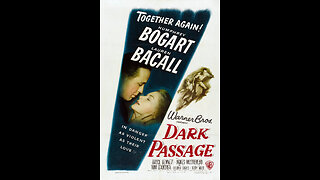 1:45:12
1:45:12
Classic Films & Movies Archive
9 days agoDark Passage (1947) | Directed by Delmer Daves
2562 -
 LIVE
LIVE
SpartakusLIVE
2 hours agoTiger Blood RESTOCKED and 30% off w/ code SPARTAKUS30
99 watching -
 30:21
30:21
Friday Beers
3 hours ago $1.05 earnedOur Brutal Golf Challenge: Hot Wings Roulette
15.5K -
 2:58:40
2:58:40
Barry Cunningham
5 hours agoPRESIDENT TRUMP SPEECH AT MAKING HEALTH TECHNOLOGY GREAT AGAIN! EVENT AND MORE NEWS!
42.5K23 -
 LIVE
LIVE
ZeeroG
3 hours agoStarfield (E.P 4 ) 7/30/25
22 watching -
 1:00:08
1:00:08
The Officer Tatum
4 hours agoLIVE: Left CANCELS Their Own, All White Town, NYC Shooter Update + MORE | EP 146
21.1K24 -
 LIVE
LIVE
Julian Orbit
1 hour agoMy Friendly Neighborhood - First Look
10 watching -
 LIVE
LIVE
TYM LIVE
3 hours agoThey call Me Audio Issues
12 watching -
 LIVE
LIVE
The Rabble Wrangler
15 hours agoRimWorld with The Best in the West!
50 watching -
 LIVE
LIVE
MissesMaam
5 hours agoVariety Stream💚✨
51 watching
